













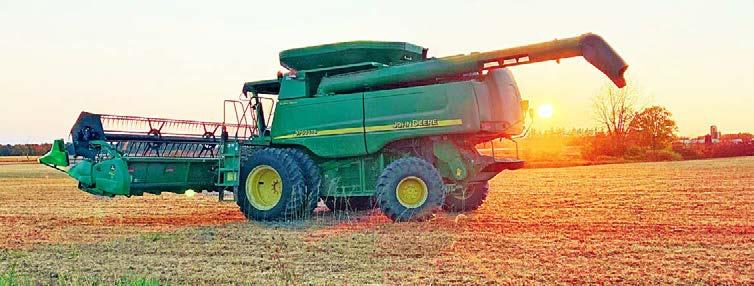






















Nathan and Beth Saarloos and their children Gideon, 7, Cecilia, 9, and Eleanor, 12, along with their latest addition, infant Maud, have turned a wet patch in a field next to their historic house in Kingsmill into a thriving pumpkin, squash and gourd business, as well as cut flowers and, to draw in new customers for the first time, sweet corn.

“I just love growing things,” Nathan said in a recent interview with the couple. “I love growing a family, I love growing crops, and we like growing food.”


Nathan is an agronomist who farms about 250 cash crops on the side in partnership with his father Graham in the Aylmer area, with help from his brother Chris during planting season. Their most recent acquisition has been a 70acre Amish farm near Crampton.
Nathan grew up in a dairy farm family just outside Aylmer. “Basically I’ve lived at RR 7 Aylmer all my life.”


Beth is from St.
Thomas, and met Nathan while attending London District Christian Secondary School.
“We were not sweethearts,” she replied with a chuckle about their high school days. She worked at his family’s business, Kielstra Siding and Windows, in St. Thomas after graduation from LDCSS.
They didn’t start dating until after Nathan finished his university degree in environmental science from Redeemer University in Ancaster, after they ran into each other at a stag-and-doe.
She had no background in farming, she allowed, nor had she even had a pet. “Not
They began dating in 2007 and married a year later.
Nathan, who worked at first for a biosolids company, became an agronomist, or crop specialist, for FS Partners in Mitchell in 2009, and has worked for that company ever since.
Beth, meanwhile, came home to be a full-time mother after Cecilia was born.
Back to the land
Asked why he returned to farming, Nathan said, “It’s in my blood.”
In addition, as an agronomist, he advised farmers on what they should do with their fields and crops, and he decided, “I should probably practise what I preach.”

He started renting land to farm around No Frills grocery store at the north end of Aylmer, beginning with 40 acres in 2012, but had recently seen that whittled down by development to 30. He had a great working relationship with the town, he said.

Beth noted that after the construction of the new A&W restaurant on the No Frills parking lot, one adjacent corner of their rented land became “our unofficial duck sanctuary,” due to it being wet and water regularly ponding. She recalled a picture had been in the Aylmer Express of hockey being played one winter.
Nathan cash-crops corn, beans and wheat with his father, including on the 14 acres of land adjacent to the Kingsmill house where they moved in 2012. They also rented some other fields in the Aylmer area, and shared the equipment
In 2018, he transferred from FS Partners in Mitchell to the company’s operation in Aylmer, and he now worked with customers in Elgin, Oxford and a bit of Norfolk. With the change, he said, customers could now come see the test plots he planted each year, and the management practices he followed, which hadn’t been possible with customers around Mitchell.
In addition, for both of them, being able to work in the community where they
resided was really important for them, he said.
Homestead
Their home is a stately and substantial historic farmhouse. They’re not certain when it was built, Beth said, but they’d had many motorists stop and tell them they’d resided there at some point, or knew someone who had. “Or their grandparents honeymooned here,” Nathan added.
They’d given lots of tours of their home, and Beth said sometimes visitors would drop off old photos or other research they’d done on the house.
Nathan said they knew the property the house sat on had been settled since the 1850s, and Gideon had found a Hong Kong coin from 1879 in what’s now their pumpkin patch.
The house had been in good shape when they moved in, Beth added. They’d only
had to replace a couple of windows. Nathan said they knew at one point the house had been divided between quarters for the owner and for the servants. Both sleeping on the same storey would have been unthinkable at the time.
“We love it,” he added about their home and their farm. “It’s a great way to raise a family.”
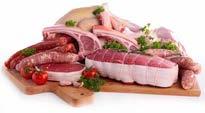

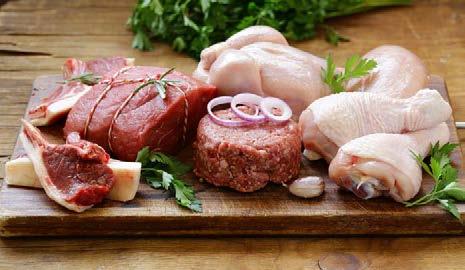
They got started in pumpkins in 2016, after he noticed a corner of his

Eleanor Saarloos, now 12, holds an armful of sweet corn used to attract first-time customers to her family’s Kingsmill Gardens farmstand on Springwater Road. Her parents Nathan and Beth said after stopping for corn, many new shoppers then came back for cut flowers, pumpkins, squash and gourds.
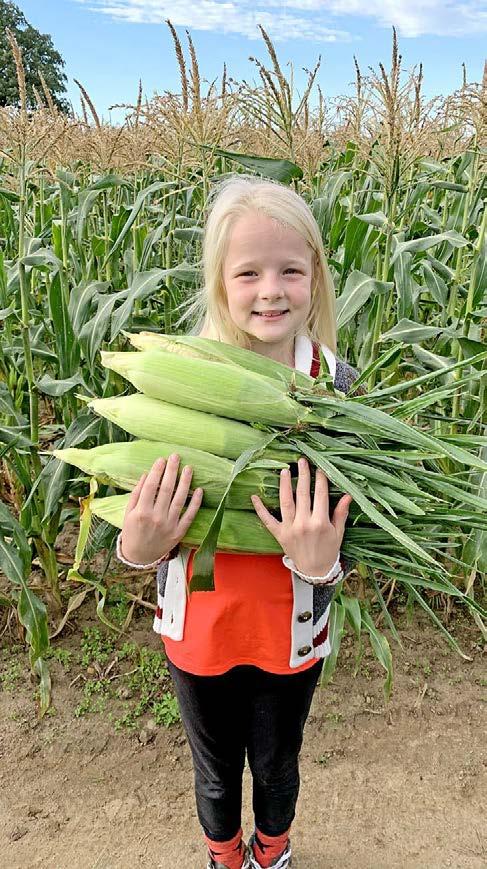
(AE/contributed)
field next to the house that was always wetter than the rest.
He couldn’t stand not seeing a crop growing there, so they decided to give pumpkins a try.
Beth said the patch had been a large vegetable garden when they first moved in, and they had always wanted to fill it in with other crops.
By 2016, the children were getting old enough to help out at least a little, and they decided from the start to grow “specialty” pumpkins, rather than pie pumpkins and jack-o-lanterns, the latter two crops dominated by much larger farms.

“I like all the specialty varieties, purple beans, purple broccoli, yellow cauliflower, the different stuff” that had unique textures and taste, she said. Many were heirloom varieties, while others were just uncommon.
Nathan bought a wagon at auction so they could have an ad hoc farmstand in their front yard that first year, and they planted a third of an acre with four varieties.



Cecilia Saarloos, 9, holds an arrangement of fresh-cut flowers from the Kingsmill Gardens farmstand in Malahide. This year, the business will be selling six-week subscriptions for fresh flowers every week.

(AE/contributed)












They now grew over 50 varieties on two full acres as demand for unusual pumpkins, squash and gourds grew and their farmstand became better known. Managing the crop could be challenging, due to the various sizes of the fruit they produced, but they’d found ways to adapt, Nathan said. They’d adapted a planter so their children could walk behind and drop seeds in as they went along.
“They’ve planted every single seed in the patch,” he added.









Beth said they started their plants from seed in late May or early June, giving the ground a bit of additional time to dry out at least somewhat.
Nathan said that was also a good time for him as an agronomist. With most of his customer’s crops already in the soil, he could focus on their home patch.
The goal, Nathan continued, was to start harvesting in time for Labour Day.
Many of the specialty varieties came from Seedway, a division of the company where he worked, while some



CONTINUED ON PAGE B4

Rob Foster grew up on the farm and continues to farm with his family today. He knows your business from the ground up.
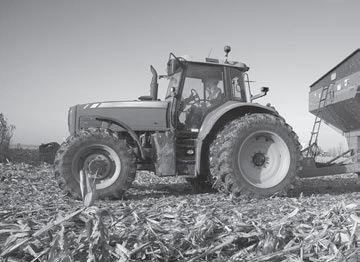
Graham Scott Enns LLP has been assisting clients for over 50 years, with 8 Partners and over 35 staff in our St. Thomas and Aylmer offices. Give Rob a call today for all your accounting, taxation, succession and estate planning needs.

CONTINUED
others came from other sources.
The pumpkins, squash and gourds in general received the same management, Beth said, but a few varieties were more susceptible to pests.
Which varieties turned out best and worst each year varied, depending in part on how wet or dry the weather was.
Sometimes, too, they’d get an abundance of fruit but in smaller sizes, and in others bigger fruit but not as many, she noted.
The most common questions they heard was, which pumpkins were edible and which were purely decorative.
“Technically, they’re all edible, but some are not as delicious,” she revealed. From fields and flowers to farm-gate and photo-ops
The patch started out as Saarloos Siblings Specialty Pumpkins, but with diversity it’s been Kingsmill Gardens since 2018.
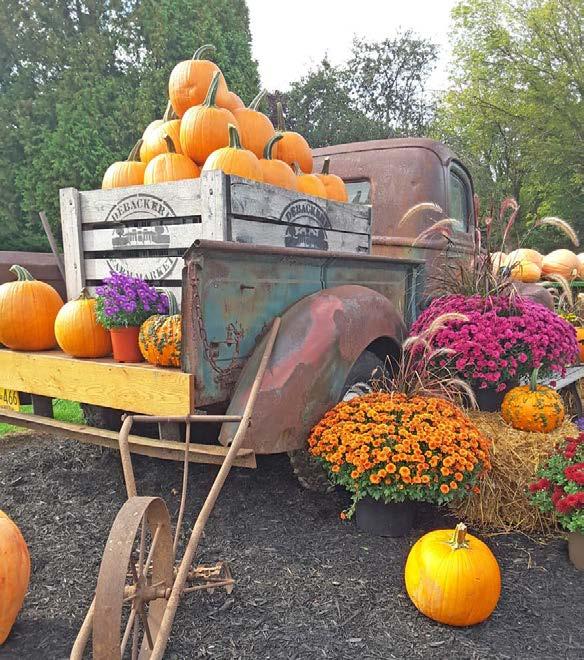
1. This white vegetable is called Daikon

2. Bugs Bunny’s favourite food
3. A similar vegetable to collard greens
4. Another name for beans
5. There are summer and winter varieties of this vegetable
6. Rutabagas are from the same family as this vegetable
7. A crunchy green vegetable with lots of water



8. A dark green vegetable that looks like cauliflower

9. The leaves of this vegetable are used in salads





10. The most common varieties of this vegetable are English and Lebanese
11. Iceberg and Chinese are two varieties of this vegetable
12. A bulbous vegetable that’s said to repel vampires



13. A vegetable that’s often eaten with butter and salt
14. There are many ornamental varieties of this vegetable
Beth Saarloos, front, and her children Eleanor, Cecilia, and Gideon, with some of the wide array of varieties of squash, gourds and pumpkins grown on two acres of land adjacent to their Kingsmill Gardens farmstand. “Technically, they’re all edible, but some are not as delicious,” Beth said of the fruits of their labours. (AE/contributed)
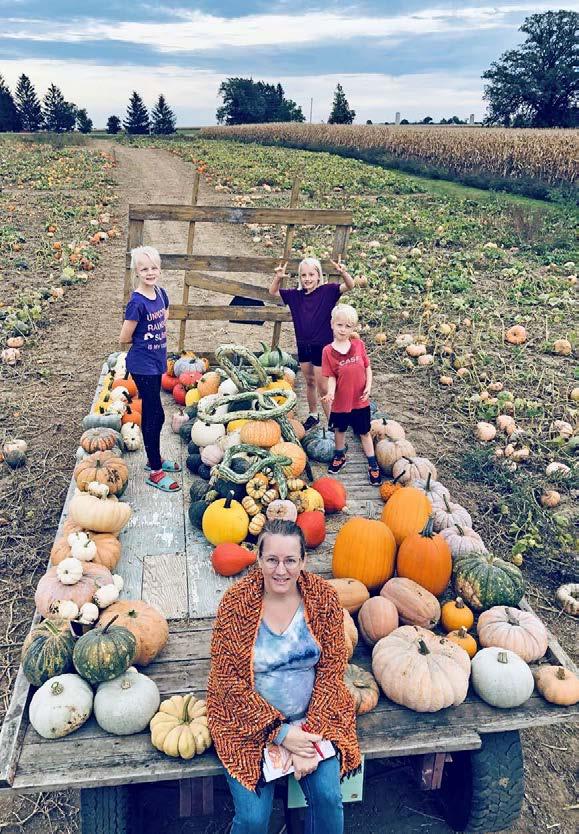
In addition, they sold sweet corn— “You can’t go wrong with sweet corn” —and also cut flowers, and she hoped to expand the latter this year.
They now grew two acres of pumpkins, squash and gourds a year for the farmstand, two acres of sweet corner and hand a large garden for cut flowers.

In addition to them and their children, they employ three part-time workers through the harvest.
As their children have grown older, they did an increasing amount of the work, helping with transplanting flowers, picking sweet corn, restocking the farmstand and, with any of their produce that couldn’t be sold, feeding their three pigs they regularly raise until ready for processing.
“Which are in the freezer right now,” Beth said. “They (the children) know where their bacon comes from.”
Nathan said the farmstand usually opened with sweet corn and cut flowers in July. Sweet corn was a good way to

Plants, mostly flowers, “harden” in the spring in preparation for transplanting into a field at


Gideon Saarloos, 7, rides an “Atlantic Giant” jacko-lantern at Kingsmill Gardens northwest of Aylmer last autumn. The farmstand grows and sells over 50 varieties, many of them historic or rare, of pumpkins, squash and gourds. (AE/contributed)

get customers to stop for the first time and see what else the stand had to offer.
Last year, they also began wholesaling to some other local farm markets. Their core customers were a mix of those seeking variety, and those seeking a good picture to post on social media.
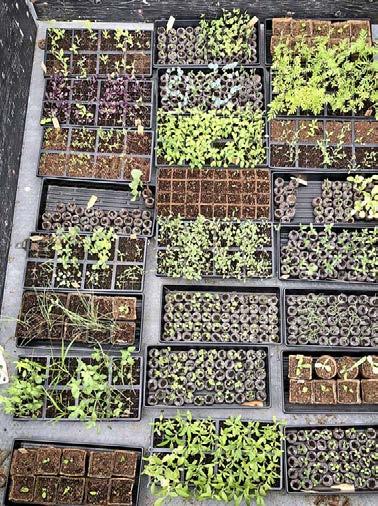
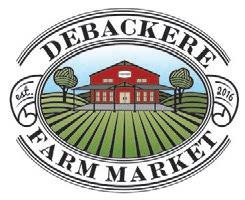
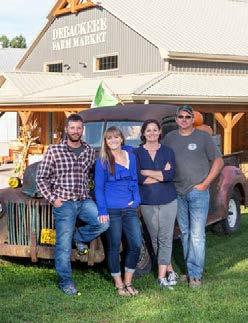
“We occasionally find teenage girls lying on a pile of pumpkins,” Beth smiled, then added, “Please don’t.”
Their customers came from as far away as Woodstock and the north end of London.
ANSWERS 1-N, 2-D, 3-B, 4-I, 5-H, 6-L, 7-E, 8-C, 9-O, 10-G, 11-F, 12-A, 13-K, 14-J, 15-M Carrots D E I J Radish N Arugula O Garlic A B Broccoli C Lettuce F G Squash H Corn K L Pepper M


Kingsmill Gardens. (AE/contributed)
Nathan added that their wagon was occasionally set up for taking photos and to give customers home décor ideas, and the same was true for their front porch. The stand was always self-serve, he added.
Pumpkin Cheesecake with Maple

CRUST:

1-1/4 cups graham wafer crumbs
3 tbsp granulated sugar
1/4 cup melted butter
FILLING:
1-1/4 cups granulated sugar
4 tsp cornstarch
3 pkgs brick light cream cheese, softened
3 Eggs, at room temperature
1/4 cup packed brown sugar
1-1/2 cups cooked Pie Pumpkin Purée, drained
1/3 cup 2% plain Greek yogurt or low-fat sour cream
1-1/2 tsp vanilla
2 tsp ground cinnamon
1 tsp ground ginger
1/2 tsp ground nutmeg
1/4 tsp salt
1/8 tsp ground cloves
MAPLE WALNUTS:
2 tsp butter
1 cup walnut halves
2 tbsp Maple Syrup
1 tbsp granulated sugar
3/4 tsp ground cinnamon
Whipped Ontario Cream
In medium bowl, mix together crumbs and sugar. Stir in melted butter. Press firmly into 9-inch springform pan; wrap bottom
of pan with foil, set aside.
In small bowl, mix together sugar and cornstarch. In large bowl, using electric mixer, beat cream cheese, granulated sugar and cornstarch together until very smooth.
In separate large bowl, whisk together eggs and brown sugar. Stir in pumpkin, yogurt, vanilla, cinnamon, ginger, nutmeg, salt and cloves. Fold in cream cheese mixture until well blended. Pour over prepared crust.
Bake in 350°F oven until almost set in the centre, about 1 hour. Remove to wire rack. Immediately run knife around edge of pan. Allow to cool completely. Cover and refrigerate for 4 hours or up to 24 hours.
In large nonstick skillet, melt butter over medium heat. Stir in walnuts, maple syrup, sugar and cinnamon. Cook, stirring constantly for 3 to 4 minutes, until nuts are well coated. Spread on parchment paper-lined baking sheet, separating pieces. When cooled, coarsely chop. Remove outer ring from springform pan and place on serving platter. Decorate with whipped cream and chopped walnuts.
We are excited to have Matt join our London team as a high HP sales rep serving Elgin, Middlesex, and surrounding areas. When it comes to equipment, Matt can help with all your agriculture and construction needs.





mattb@advantage-equip.com


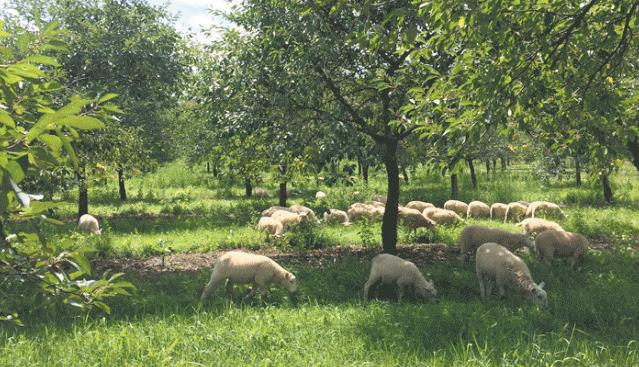
J.P. Antonacci, Local Journalism Initiative Reporter, The Hamilton Spectator August 3, 2021 - Carrie Woolley wasn’t reinventing the wheel. What the Simcoe farmer proposed — to have sheep graze in fruit orchards, using the same land to produce several food sources — was how farming had been done for centuries.
“If you looked at farms in Ontario 50, 60, 70 years ago, this was common practice,” she said.

“My grandmother in Tillsonburg, she talks about how she’d run pigs through her apple orchard after they’d harvested. It’s not really a new concept.”
But times changed as farms grew and operations became more specialized. So when Woolley and her husband, Brett Schuyler, first considered integrating livestock on their fruit and cash crop farm eight years ago, they wondered if it could work.
The

(www.sheepcanada.com;
“I thought, does this make sense?”
Woolley said.
Fast forward to last week, when the United Nations Food Systems Summit chose Woolley as one of 50 winners of its Good Food for All Competition, which recognizes small businesses charting a future for sustainable agriculture.
The competition received more than 2,000 entries from around the world, and Woolley’s Lamb was one of just two winners in North America.
“We were honoured and very excited,” Woolley said.
“We’re just trying to do things well here, and it’s exciting when you can work hand in hand with nature.”
Many crops, same land
Woolley’s 2,000-strong flock lives outside year-round, moving from pasture to pasture with help from an experienced group of guard dogs.
The sheep munch on cover crops like al-

falfa in between cherry and apple trees on Schuyler Farms. When the orchards need a break, lambs and ewes head to woodlots that were selectively logged to remove invasive tree species, creating room for grasses and wildflowers to grow.
“You’re multi-purposing that land,” Woolley said of the practice known as silvoculture.



“It’s producing trees for some type of crop — whether it be timber or fruit — and also getting the forages growing so you can raise livestock all on the same piece of land.”
Silvoculture keeps costs low, since Woolley does not have to deliver feed to sheep living in a heated barn or truck the manure they produce back to the fields. No straw needs to be harvested for bedding, and the sheep themselves keep vegetation low, eliminating the need for mowing.

“So you’re producing meat and fibre and using very little fuel,” Woolley said. With water lines attached to solarpowered pumps and very little electricity powering the fences that keep sheep in and predators out, the operation has a much smaller carbon footprint than traditional livestock housing.
As for the sheep, they spend their days in the fresh air, sampling a diverse menu of shrubs and flowers.
“It’s a very nice way to raise animals. It’s like a buffet of plants out here,” Woolley said, noting that most of her sheep are Coopworth, a “low maintenance” New Zealand breed that thrives in pastures.
“We can bring in sheep and try to reduce the invasive plants and promote native species instead,” she said. “In return, they’re fertilizing the soil.”
The sheep are sheared in the pasture each May, and once freshly shorn are directed under shady trees to avoid sunburn. Rain showers keep their fleece as white as snow, Woolley said.
“The wool is very clean, which is very desirable when you’re sending it off to a mill to get processed,” she said. “Sheep that
live in barns, their wool is full of straw, and sometimes it’s useless.”
Aside from the wool as a revenue source, local restaurants purchase meat from the farm, and Woolley’s Lamb is available at several local farmers markets.
‘Honoured and humbled’
Woolley said she was “so honoured and humbled” to be recognized by the United Nations, but admitted the international attention left her feeling, well, sheepish.
“When you go through the list of who won and what their businesses are about, I was like, man, we’re out of our league,” she said, mentioning a Nigerian company that uses solar technology to prevent food spoilage in remote villages.
“That’s amazing,” she said. “Those people are tackling poverty and hunger. I’m grazing sheep.”
But the award is also an endorsement of a traditional, eco-friendly farming philosophy that is catching on again.
“There’s definitely interest,” said Woolley, who shares her silvopasture expertise at growers’ conferences and fields calls from other farmers looking to integrate their own operations.
Not content to rest on her laurels, she recently added geese to the farm’s livestock mix and plans to plant more native shrubs,
Ewes and lambs grazing under cherry trees in summer. (www.sheepcanada.com;

wildflowers and fruit trees in the woodlots to attract pollinators and improve biodiversity.
“I’m very self-critical. I don’t often sit back and say, ‘Oh, look at all we’ve accomplished,’” Woolley said.
“It is neat, though, to think back five or six years ago when we only had a couple hundred sheep. We’ve done a lot, but there’s still so much more we can do.”
The rows of cherry trees are far enough apart to permit mechanical harvesting. This also allows hay to be made in the cherry orchards early in the summer, before harvest in July and grazing in August. (www.sheepcanada.com; Photo by Cathy Gallivan)

comes and looks after our girls just one day a year and then he’s off looking after everybody else,” Orazietti said.
“You’ve got to train at it all the time to be good and stay fit.”
“And prevent an aneurysm,” Metheral added with a grin while he pulled another sheep to the shear.


Metheral didn’t just have to shear the sheep but also keep them in place while they struggled against the process, sometimes kicking and braying as they watched their luscious locks fall away.
Indeed, any one of them, if able, would most likely have gone the way of Samson and brought the farm down on top of themselves.
But shearing is for the sheep’s own good. As Orazietti noted, it enables their lambs to feed easier and keeps them free from possible parasitic infections and overheating in the warmer summer months.
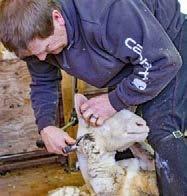

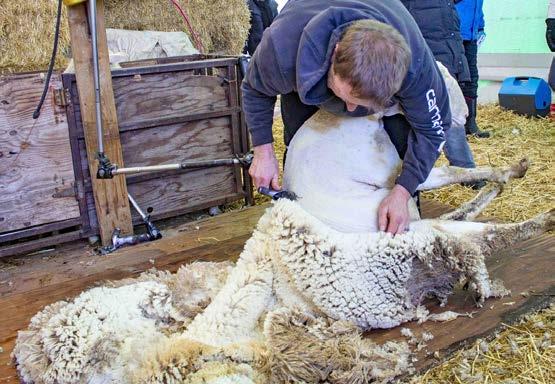
The wool will be bagged and sent to various locations around Ontario and roughly 600 pounds of it will be sent to Alberta, Orazietti said.
Orazietti said she gets about six pounds of wool per sheep.
The wool will be processed into different materials such as yarn and even the soles for shoes, she said.
Volunteers were busy sweeping and helping sort through the wool to select the clean stuff from the, ahem, not so clean stuff.
by Evan Saunders, Local Journalism Initiative Reporter, The Lake Report

March 3, 2022 - Ba-ba black sheep, have you any wool? At Niagara-On-theLake’s Linc Farms, about 1,200 pounds of it, co-owner Juliet Orazietti says.
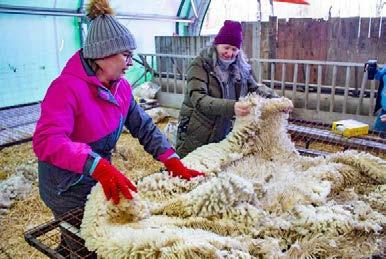
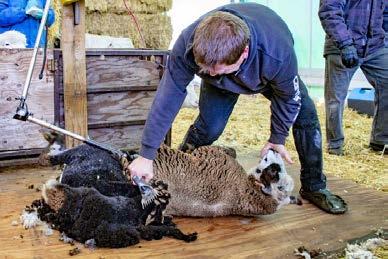
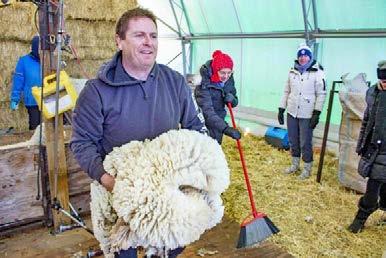
At the end of February, Linc Farm underwent its yearly sheep shear, shaving off the coats of the 175 or so sheep that call the farm home.
“This is the only day of the year that we need this much manpower,” Orazietti said as a group of volunteers gathered about helping sort through the freshly shorn wool.
The sheep are sheared every February, “about a month before they have their lambs,” Orazietti said.
“They’ve gotta be clean and the lambs need to be able to find the teat. So, we get rid of all the wool that’s in
the way.” After each lamb was shorn it ran full speed out of the barn to graze as if embarrassed to be seen without its cumbersome coat.
Following the two-day shear-a-thon the now-naked sheep have about 365 days to regrow their coat, she said
One sheep named Treble was a little luckier than the others.
Treble had the responsibility of standing at the front of the line all day so the sheep behind felt confident taking their place in the shearing queue.
Treble’s reward for this diligence? Copious snacks and the privilege of being the last sheep to sport its fetching coat. The farm brought in shearing
work.
“He works all over the world. So, he

“We take out the dirty wool if there’s too much hay or poop or mud in it,” Orazietti said.


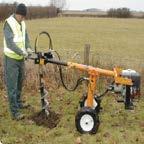






The dirty wool goes into a composting bin.
“It’s nice to be closer and to get to know the animals that you might wear,” volunteer Rebecca Golding said.
Golding is a resident of Queenston and said she found out about the volunteer opportunity through a newsletter the Oraziettis put together.
There was another

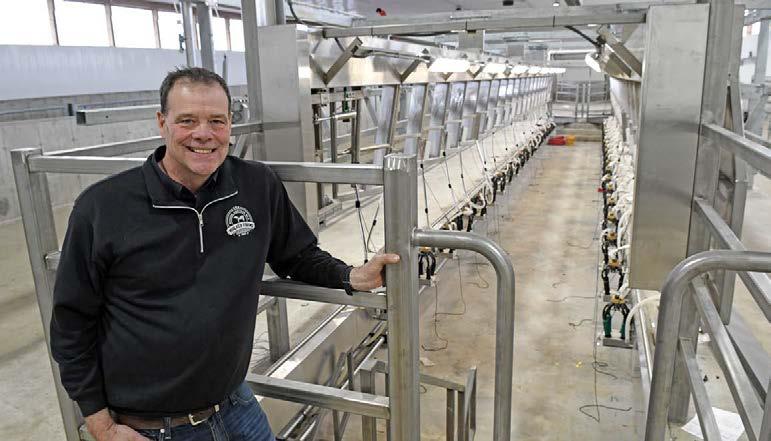 by Rob Perry of The Aylmer Express
by Rob Perry of The Aylmer Express

Jon Walker of Walker Dairy Inc. says that the destruction of the office, sales arena and some of the adjoining barns at the company’s Summers Corners property in a fire in February of 2021 has now been largely replaced by new, interconnected structures.
They were partially in use on the date he was interviewed on Monday, March 21, but were expected to be completely operational by the time this Farm Edition came out.
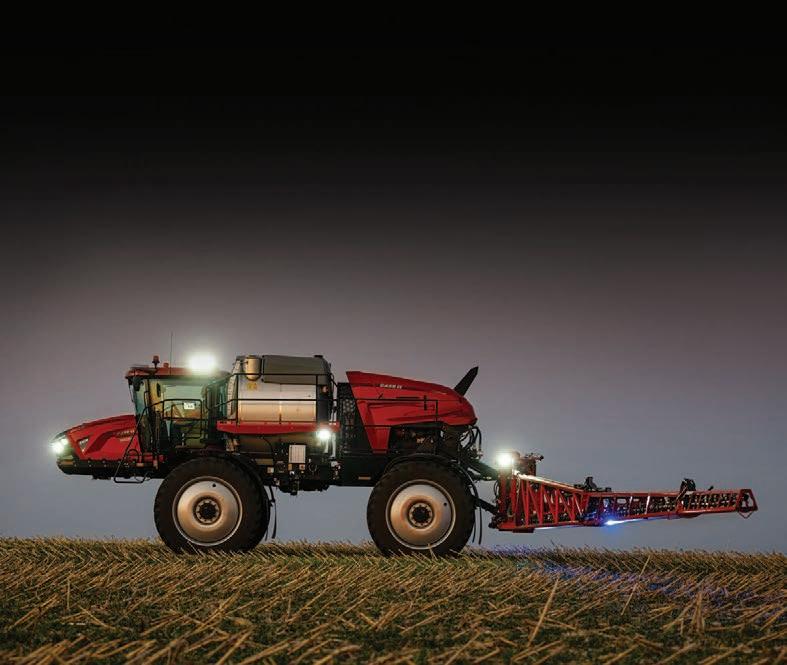
What’s altered the way the company works wasn’t the fire, but a disaster that struck a year earlier, the COVID-19 pandemic.
“It changed the way we did business,” he said, and in doing so made the 2021 fire somewhat less catastrophic than it might otherwise have been.
The Summers Corners farm buildings
were built in 1978, and then added onto over the years, he said. When COVID hit, though, in-person gatherings such as regular cattle auctions held there were no longer possible. The greatest alteration, he said, was switching over to online auctions, “a huge, huge change for us.”

For the most part, the sales barn’s employees and customers adapted quickly to the move. “We’ve got great staff here.”



As a result, “Probably the fire came at a good time,” if such a thing could be said about any blaze in a barn housing livestock, he continued, in that the auction ring was no longer needed.
When the replacements for the destroyed portion of the dairy complex were being planned, “It made you look at different ways to do business.”
As a result of the changes, the sales ring was not included in the new plans, but the farm did have a good-sized meeting room where the five or six buyers who still wanted to come and inspect cattle firsthand could retire to and make their online bids.
As a result, the cows weren’t moved as much, which was desirable because the less stress put on an animal during the process, the better, “especially with higher-end sales,” Jon said.
“We never missed a load”
Walker Dairy Inc., after the fire, also had to adapt quickly, so it could continue to send regular loads of cows (typically 40 head to a load) to several major dairies it supplies replacements for in the U.S.A.
“We never missed a load,” he said with a note of pride – though one or two were a week late arriving.
The farm was also looking toward further adaptations to suit the modern marketplace, he added. The volume of cattle going through the sales barn has not really dropped in recent years, though it never did recover fully from the international trade chill that came from cases of bovine spongiform encephalopathy showing up in some places.
Former networks that sent cows from the Walker sales arena around the world had vanished over time, but the farm continued to sell to buyers across North America, the market further enhanced by the offering of online auctions.
Jon said he’d worried that some customers might not accept the online sales, but as one told him, “You guys are always good. If we don’t like them, you’ll come pick them up.”
The fire
Jon said he’d been on his own home farm, just east of the Summers Corners site, on Wednesday, Feb. 17, 2021 when he was telephoned by an employee who told him, “We have a fire.”
He rushed to the scene, arriving two minutes later, but much of the front portion of the sales arena, office and barns complex was already fully engulfed in flames.
Malahide and other volun-
teer firefighters did a great job keeping the fire from spreading very far after they arrived, but what surprised him was the other assistance that started arriving.
“We had an outpouring of people come out to help. It was humbling.”
Farmers from the area and further afield began arriving with cattle trailers both large and small, knowing the cows saved from the fire would need to be moved to temporary quarters as soon as possible.
Other volunteers helped herd the cows into the waiting trucks.
Jon asked one farmer why he’d come all the way from Arthur, and was told, “You’d do it for me.”
Gerald Schipper, who farms just west of Aylmer, took many of the 875 cows that were rescued and kept them several days, feeding and milking them until older barns on Walker properties could be readied to be put back to use.
Others took just 10 or 20 cows, but everyone who did was an invaluable help to the Walkers, Jon said. “All the milk cows were back on our property in a week.”
The Schippers had a barn burn in the 1970s, Jon recalled, and the Walkers had done a similar favour then, housing and milking those cows for six months.
The aftermath
The hardest part of dealing with the fire was cleaning up the debris and the bodies of cows killed in the conflagration for four or five days afterward, he noted.
Compared to the herd size of over 800, the loss of 75 cows was relatively small, but still a tragic loss of life. Jon’s son John G. Walker, said in an interview the week after the fire, “You never want to lose anything - the livestock are part of our lifestyle, our livelihood. You can always build new buildings, but losing livestock always sucks.”
The Walkers had always talked about what they might do about a fire in a barn, but hadn’t really practised anything. They have learned from this experience and in future, the farm and staff would be much better prepared to deal with such a situation, Jon said.
The replacement buildings, too, were more resistant to fire than in the past, with fire walls and doors to try to limit the
spread of flames. Standards now were even higher than in 2008, when he’d built a barn on his home farm, and he expected a fire warning system would be added to the replacement systems in Summers Corners. They’d lost a lot of records from the office that was destroyed, as well as “little things,” like pictures and awards that were now missed.
In future, he noted, all records would be backed up, both on site and using online, off-site “cloud” servers to ensure they were preserved.
Starting fresh
Rebuilding from the fire started last June. While Walker Dairy made annual use of building contractors and trades, they’d been booked up for last year, not expecting such a huge job, Jon said. But they found time to help out the Walkers. “All our trades, they were really good.” Supply chain issues brought about by the pandemic did delay some of the work, but he was more worried about possible future shortages and price hikes for fertilizer. They’d rebuilt the complex’s milk-
We had an outpouring of people come out to help. It was humbling
injured, they were upset at the loss of livestock: an estimated 78 cows were lost as a result of the fire. “You never want to lose anything - the livestock are part of our lifestyle, our livelihood,” said John G. Walker (Jon’s son) in an interview the week after the fire. (AE/Rob Perry)
This is a barn rebuilt after a previous one was destroyed by fire at Walker Dairy Inc. in February of 2021. A complex of offices, a sales arena and barns were heavily damaged by flames. (AE/Rob Perry)
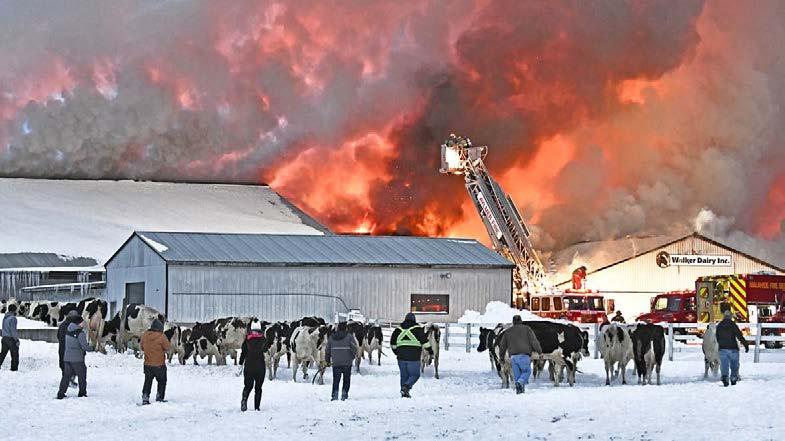
ing parlour the same as before, with two rows of 20 milking machines each, enough for that typical “load” of 40 cows.
The Summers Corners site has eight workers who look after the barns and milking, three or four office staff who were looking forward to moving back from cramped quarters on Jon’s home farm, and a couple of workers on the road.
He hoped a celebration of sorts could be organized in the next few months, inviting customers to come and mark the resumption of full operations.

As for the future, “You’re never happy” with where a business was, he admitted, but he believed as long as dairy cattle were in use, there would be people wanting to buy and sell them.

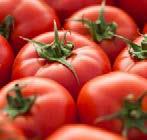





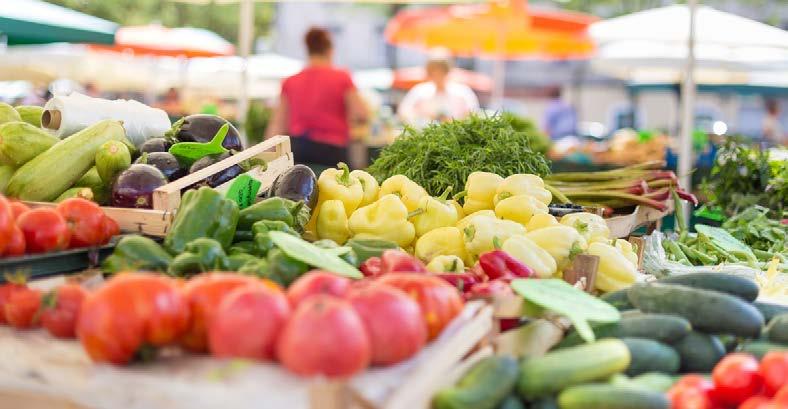


Ontario used to be full of such sales barns, Jon said, but now, “darn few” were left. The company drew cattle from around Ontario to sell across North America now. He added he wanted to thank everyone who had helped the company out of the last year.
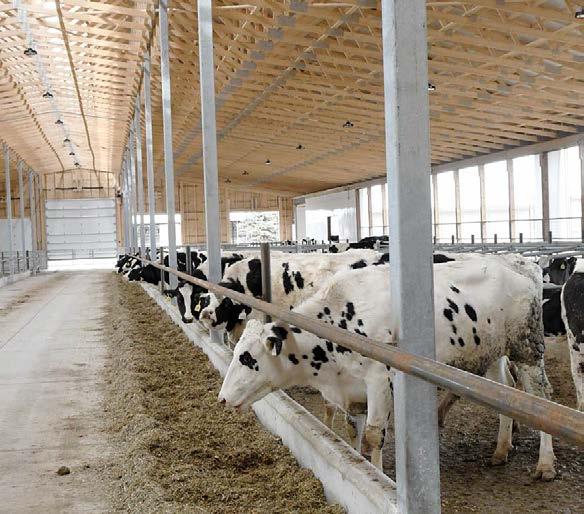



Last year, Walker Dairy Farms Inc. launched two major projects, completing the farm to table chain within the family farm operation: from growing livestock feed, to herd management, milking, processing, packaging and retail sales. By spring, Walkers opened a new processing plant right next to their Carter Road farm as well as a dairy bar in Malahide.
Since opening both the dairy bar and processing plant, Walker’s have established connections with other local farms, businesses and processors, inclusing Shaw’s Ice Cream, which started in Central Elgin south of St. Thomas and now has a production plant in Tillsonburg.

The dairy bar offers milk, coffee, and ice cream, with all of the ice cream coming from Shaw’s: soft and hard ice cream, in milkshakes and 1.5L tubs to take home.

Shaw’s on the other hand, brings Walker dairy products into their own dairy bar on Sunset Drive. Manager
Kelly Heleniak said, “We now use all of their milk in our shakes at our dairy bar. Walkers just came out with a 4L jug which makes it easier for our use. We love this local collaboration and of course Walkers Dairy Bar in return uses all Shaw’s soft and hard ice cream.”
Walker’s started processing only milk, but has also begun to process cream (at a small, custom scale for now), and Shaw’s has started using some of that cream in their ice cream production, though their needs require supply from other processors. Shaw’s has been growing steadily over the past decade, from the dairy bar on Sunset Drive, to a large production facility in Tillsonburg, to offering ice cream at local stores, then national grocery chains.
Earlier this year, it was announced that Shaw’s would be producing for a national brand, as the maker of the new Tim Hortons Ice Cream now for sale.




The flavours, all inspired by products offered in the coffee shops, included Salted Caramel Ice Capp,



Double Chocolate Donut, Birthday Cake Timbits, Apple Fritter and Fruit Explosion.
The ice cream is available at grocery stores across Canada including Loblaws (Maxi, No-Frills, Real Canadian Super Store, Provigo, Loblaws Great Food, Fortinos and Your Independent Grocery), Longo’s, Metro in Ontario, Sobeys/Safeway and Walmart.

In a statement, Tim Hortons said it was proud to have the ice cream made in Tillsonburg, using entirely milk from Canada.


Vice-President Sourabh Malik said the coffee shops have, “been a beloved taste of Canada since 1964 and we’re really excited to be re-imagining some of our most popular flavours as ice cream.
“Canadians are going to love Tim Hortons Ice Cream and how we’ve brought our unique, only-atTims tastes to a new dimension. These new ice cream pints are bursting with inclusions like caramel, apple and chocolate donut pieces.”
You never want to lose anything - the livestock are part of our lifestyle, our livelihood
Land is prepared for two different purposes. At left, a farmer drives a tractor in early spring, discing the compacted soil to prepare the field for planting and growing season. Right, grading and site preparation is done for housing development at the northwest end of Aylmer.

 By Joe Konecny, Local
By Joe Konecny, Local
Journalism Initiative
ReporterSomething has got to give if Tracey Arts is to succeed in her campaign to raise awareness of the amount of Ontario farmland that’s being consumed by development each year.
The Ontario Federation of Agriculture Zone Director for Oxford and Elgin Counties is spearheading a timely OFA roadshow. She’s attending municipal council meetings, making a case for more careful land use planning, and driving home farmland facts frequently overlooked in the whirlwind of economic development.

“You always hear ‘oh, there is tonnes of farmland out there,’ but there’s not,” Arts told the Aylmer Express in a recent interview. Her roadshow has already reached most Elgin County municipal politicians and the OFA’s online Homegrown Campaign has generated some 30,000 signatures, focusing on protection and preservation of Ontario’s farmland and domestic food production.
Ontario’s agri-food industry contributed $47.3 billion in GDP in 2019 and supported over 860,000 jobs, representing 11.6% of the province’s labour force, according to the Ontario Ministry of Agriculture, Food and Rural Affairs. OMAFRA encourages municipalities to take an agricultural systems approach to protecting farmland and supporting the agri-food network.
“It’s not if we’ll run out of agricultural land, it’s when. It’s a finite resource,” added Arts. “All you have to do is drive down Hwy. 401 or Hwy. 403 and you see all the development. It is happening everywhere.”
Urbanization claims an average of 175 acres of productive farmland every day, according to the OFA. With Ontario’s average farm size being 249 acres, that’s a loss of five family farms a week.
To put that in perspective, in one year, the average farm can produce 58,000 packages of bacon, 1.3 million servings of nachos, 532,400 turkey dinners, 1.1 million quarter pounders, 273,000 chicken wings, or enough eggs to make 2.9 million omelettes.
“For me, it’s a little scary how fast development is coming,” said Arts. Only 5%, or 13.3 million acres, of Ontario’s 266-million-acre land mass is suitable for farming. “Where are we going to be in 20 or 50 years? What are we leaving for our children?”
Tracey and her husband Ruud Arts are Oxford County dairy farmers, following in the footsteps of both of their parents. The next generation is represented by their twin 10-year-old sons, Willem and Lucas. The Arts operate a 400-acres farm, with about 400 heads of cattle, including 240 milking cows, plus dry cows, heifers, and young animals. The scale of the farm has doubled from previous generations, expanding considerably in the last 10 years. The husband-and-wife team run the business with two fulltime employees and one student.
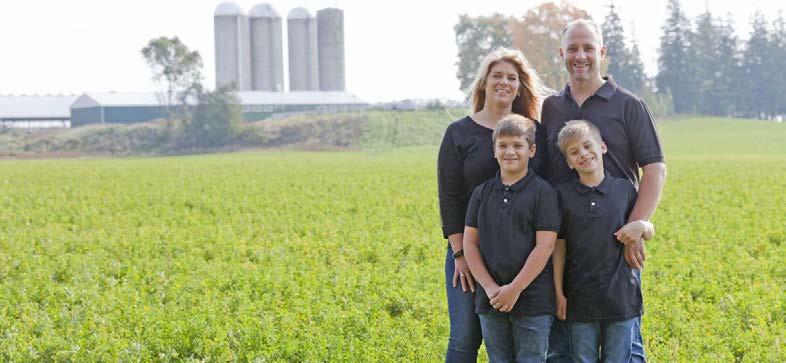
Arts continues the Homegrown Campaign in the face of some very powerful forces of supply and demand microeconomics.

She doesn’t deny that people have a right to choose to buy or rent a home, big or small, urban or rural, in single-family or multiple-unit dwellings.
And of course, farmers have a right to buy and sell farmland, as do home builders have a right to buy and sell development sites.

Politicians’ also figure into the equation.
But it’s the resulting juggling act performed by these and other stakeholders that worries Arts.
“This is something I’ve taken on because we’re seeing all this development here,” Arts continued. “There is a way you can work together to do it responsibility.”
However even the alternatives to farmland consumption rankle rural communities. Intensification of development proposals, or refurbishment of old properties, for example, frequently generate opposition in communities fearful of change, and opposed to three-or-four storey buildings, or duplexes and townhouses that may change the look and feel of neighborhoods. Sometimes the economics of these types of projects also fail to attract developers.
“It’s not a real easy question to answer, but we want to bring more awareness,” said Arts. “We are hoping we can have that open community discussion, hoping that it will let us not develop so fast.
“This is about trying to figure out how to spread urban sprawl across Ontario so that you’re not using up the good farmland,” she added. “One house: that will help one family. If we intensify, that’s going to help more than one family.”
Land use planning in Ontario is guided by the Planning Act and the Provincial Policy Statement (PPS), focusing growth and development within urban and rural settlement areas. In a nutshell, the Province sets the ground rules and directions for land use planning, while municipal governments implement.
It all seems very well intentioned, however, loopholes like minister’s zoning orders (MZOs) may be used to fast-track development and circumvent normal planning processes, with no opportunity
for appeal. Ontario Auditor General Bonnie Lysyk said the current Provincial government issued 44 MZOs between March 2019 and March 2021. In the past, according to Lysyk, about one was issued per year. In 2017 and 2018, there were none.
While MZOs were designed for use only in emergencies, Lysyk said the Ontario government is now using them to bypass barriers and delays to development.
“There are a couple places that we’re afraid MZOs will be used,” said Arts. Plans to build a GO Transit railway line along the Hwy. 401 corridor, for example, “puts some good farmland on the hot seat.”

Meanwhile, a recent Ontario Housing Affordability Task Force Report recommends building 1.5 million homes over the next 10 years. It also recommends addressing “how Ontario can quickly create more housing supply by allowing more housing in more locations ‘as of right,’ without the need for municipal approval ...
“Ontario is in a housing crisis,” according to the task force report. “Prices are skyrocketing: the average price for a house across Ontario was $923,000 at the end of 2021. Ten years ago, the average price was $329,000.
tape to make it quicker. Quicker is not always better. You’re looking at maybe six houses an acre. That’s a problem.”

Not long ago Southwold’s population was shrinking, however, new Statistics Canada and Census numbers show Southwold’s population has grown 9.7% from 2016 to 2021. “It has just been unbelievable what’s happened in this community and we’re just starting.” In that census period, 106 new houses were built in Southwold, adding 430 people to the population. Southwold’s building department anticipates over the next couple of years the municipality will see at least another 75 to 100 homes built per year.
finite resource.
“Not long ago, hard-working Ontarians –teachers, construction workers, small business owners – could afford the home they wanted,” the report continues. “In small towns, it was reasonable to expect that you could afford a home in the neighbourhood you grew up in.
“Today, home ownership or finding a quality rental is now out of reach for too many Ontarians. The system is not working as it should be.”
Local mayors weigh in
“It’s a real conundrum,” Southwold Mayor Grant Jones said in an interview. “The province wants growth and it’s reducing red

Jones is also feeling some pressure from the redevelopment of the old Ford Motor Company assembly plant in northeast Southwold. Amazon Canada’s builder of choice Broccolini is reportedly developing a new warehouse, sorting and distribution centre. If it’s anything like the plans for a fulfillment centre that Amazon recently abandoned in Pickering, Ontario, the Southwold project may generate some 2,000 jobs. (Premier Doug Ford’s government had been prepared to use an MZO to skirt local environmental concerns in Pickering.)
“We already know there will be two or three more companies coming … in the near future,” said Jones. “We have to have those houses in place. We need the population base to put those jobs in those factories.
“It’s just being responsible,” added Jones. “I know builders get comfortable with the business model that they’re very good at, but at some point, you have to think, ‘does the business model justify the end’. To maintain that infrastructure down the road … we still have to really intensify our needs, as far as housing goes.
“When we’re building these massive subdivisions, what we
Tracey and her husband Ruud Arts are dairy farmers, following in the footsteps of both of their parents. The next generation is represented by their twin sons, Willem (left) and Lucas, both 10 years old. The Arts operate a 400-acres farm, with about 400 heads of cattle, including 240 milking cows, plus dry cows, heifers, and young animals. The scale of the farm has doubled from previous generations, expanding considerably in the last 10 years. The husbandand-wife team run the business with two full-time employees and one student. (AE/contributed by Tracey Arts)
It’s not if we’ll run out of agricultural land, it’s when. It’s a(AE/Renée Hueston, Veronica Reiner)
Ontario in this area and we don’t want to see that gobbled up,” she added. “We know we need housing for people. That’s why we have to be much denser. We have to go up rather than just out.
“A lot of people think just because you’re growing in houses that that means your municipality has more money, more tax base,” Martyn continued. “No, housing is a break-even possibility at the very best of times.
“You look right now what’s happening in Mississauga. They spread and spread and built and built and now they can’t afford to repair the infrastructure.
“Somehow, we have to concentrate our growth on areas hopefully that aren’t prime agricultural land. And we need public transit,” said Martyn. “We really need a way to get people to work easily so that they can live in Port Stanley and have a great quality of life there but can get to work in St. Thomas or London easily, without everybody having to drive.
“Row houses, townhouses and apartment buildings are absolutely vital because they’re the only way we can make something affordable. We have been working with all our developers … to do just those things.”
Keeping in step with the Provincial guidance on land use planning, the City of St. Thomas, Elgin County and all of its member municipalities have developed strategies and official plans in an attempt to manage development pressures.

tions moving into these areas.
“We also maintain strict policies that limit urban sprawl in the county and requires that local municipalities examine residential intensification and redevelopment options, as well as examine ways to avoid developing on agricultural land before permitting expansions to urban boundaries”, added Lima. “Currently the county is undertaking a review of the official plan where county Council will be examining if additional measures are needed to further protect both agricultural lands and agricultural operations.”

cultural change” in the diversity of housing types and densities. “Otherwise, no one is going to be the first to do it.”

St. Thomas Mayor Joe Preston also acknowledged the forces of urbanization during an address at the St. Thomas and District Chamber of Commerce’s annual Mayors’ Happy Hour, moderated by the Chamber’s Chief Executive Officer Paul Jenkins. Preston, Jones and Central Elgin Mayor Sally Martyn were featured.
StatsCan states the City of St. Thomas’ population has grown 10.1% from 2016 to 2021, even more than the 10% growth rate in London, and if that trend continues, St. Thomas can expect another 10,000 new residents in a decade.
“A thousand people a year,” Preston told viewers of the Chamber’s online broadcast.




“The housing for 1,000 people a year, the jobs for 1,000 people a year, the amenities, the parks.
“We now know that’s where we’re going for the next decade,” he continued. “We look at Elgin County and we have to work

together and do this.
“St. Thomas went almost a whole decade without much market-rent apartments or purpose-built apartments. We now have a lot of it going on, but we’ve got to keep that pace going for the next decade,” said Preston. “We’re looking for much higher density.”
While the StatsCan data indicates that Central Elgin’s population increased 9% from 2016 to 2021, Martyn noted that 61% of the population growth in Elgin Council occurred in her constituency.

“We have the best farmland in all of

“The preservation and protection of farmland is a major concern of Elgin County Council,” said Brian Lima, Elgin County’s General Manager of Engineering, Planning and Enterprise. “Since the approval of the county’s first official plan in 2013, Elgin has maintained strict policies related to the creation of new residential lots in agricultural areas in order to preserve agricultural lands and to ensure that agricultural operations are not negatively impacted by non-farm popula-

All you have to do is drive down Hwy. 401 or Hwy. 403 and you see all the development. It is happening everywhere.
– Tracey ArtsMany things have changed in Elgin County since 1877, the year this map was published, including the movement from rural to urban settlement. The Ontario Federation of Agriculture is asking that city growth be intensified to prevent the loss of prime agricultural land to urban sprawl. The two satellite images show the housing growth at the southeast end of St. Thomas from 2006 (left), to 2018 (right), with the development at the top right of the quadrant being nearly complete in 2022. The area inside the boundary roads of Elm Street, Fairview Ave, Southdale Line and Centennial Road has been converted from mostly farmland in 2000 to almost entirely residential, save for the bottom right field. ( AE/Contributed by Elgin County Archives, Google Maps)
- We are currently witnessing the beginning of a global food crisis, driven by the knock-on effects of a pandemic and more recently the rise in fuel prices and the conflict in Ukraine. There were already clear logistical issues with moving grain and food around the globe, which will now be considerably worse as a result of the war. But a more subtle relationship sits with the link to the nutrients needed to drive high crop yields and quality worldwide.
Crops are the basis of our food system, whether feeding us or animals, and without secured supply in terms of volume and quality, our food system is bankrupt. Crops rely on a good supply of nutrients to deliver high yields and quality (as well as water, sunlight and a healthy soil), which in modern farming systems come from
manufactured fertilizers. As you sit and read this article, the air you breath contains 78% nitrogen gas – this is the same source of nitrogen used in the production of most manufactured nitrogen fertilizers. However, to take this gas from the air and into a bag of fertilizer takes a huge amount of energy. The Haber-Bosch process, which converts nitrogen and hydrogen into ammonia as a crucial step in creating fertilizers, uses between 1% and 2% of all energy generated globally by some estimates. Consequently, the cost of producing nitrogen fertilizer is directly linked to the cost of fuel. This is why the UK price of ammonium nitrate has climbed as high as £1,000 ($1,639.66 CAD) per tonne at the time of writing, compared to £650 ($1065.78) a week ago. Fertilizer inputs to farming systems represent one of the largest single variable costs of producing a crop. When invest-
ing in fertilizer, a farmer must balance the return on this investment through the price they receive at harvest. Adding more fertilizer, for a small improvement in yield, might not pay for itself at harvest. This calculation between the cost of fertilizer and the value of the crop produced – the “breakeven ratio” – is typically around six for a cereal crop (6kg of grain needed to pay for 1kg of nitrogen fertilizer), but with the rise in fertilizer prices it is currently around ten. To remain profitable, farmers will need to keep a particularly close eye on production costs, and potentially use less fertilizer. However using less fertilizer will reduce yields and quality, adding to pressure on the food system as a whole.
The bigger picture
The global food system was already under pressure. During the pandemic, as many economies emerged from lockdowns
and recovered, the rapid rise in activity increased demand on energy. The spike in gas prices triggered a pause in the production of fertilizers at some UK facilities in 2021, causing a rise in prices.



Since many farmers buy fertilizer in advance, some may have escaped this rise and so it was unlikely to impact immediately on the food supply and prices. But while fertilizer production restarted, global fuel prices have not recovered and continue to climb.
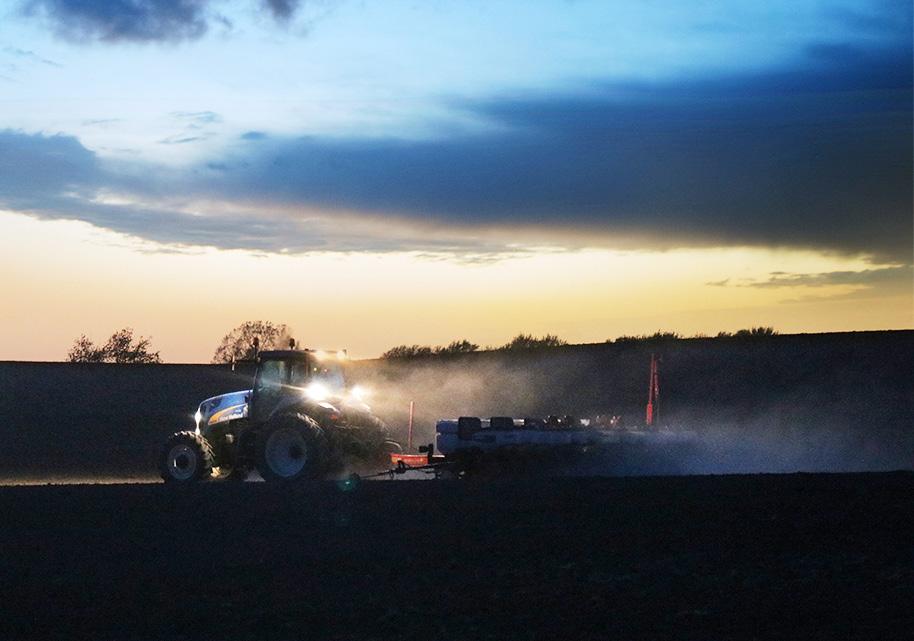

This brings us to the current conflict in Ukraine. The latest sharp rise in fuel prices is directly impacting on the prices of fertilizers, which helps to explain why the United Nations Food and Agriculture Organization (FAO) food price index reached its highest ever value in February – and is rising at the highest rate since the 2008 financial crisis.
Even then, the February data only partly reflected the effects of the invasion, since it happened late in the month and some price rises will be delayed: higher fertilizer prices are going to force farmers to either make an equivalent rise in crop prices at harvest or use less fertilizer. Higher prices for grain at harvest will exacerbate inflationary pressures in the economy, since the supply chain will eventually transfer the costs to the consumer in the form of higher food prices.
Russia and Ukraine are also major producers and suppliers of fertilizers and their raw materials. For example, Norwegian group Yara, the biggest producer and supplier of fertilizers in Europe, makes much of its product in Ukraine. Reducing western trade with Russia, and the disrupted supply lines in Ukraine, will therefore add another layer of pressure to the production and supply of fertilizers.
Russia is responsible for nearly a tenth of global nitrogen fertilizer production. Russia also has a comparable share of phosphate fertilizers and together with Belarus around a third of potash production, though in many cases these are not applied to soil every year and have much lower energy costs, so will have less of an immediate impact on yields and food production.
Vladimir Putin has explicitly been connecting the disruption to the trade in fertilizers with


a coming surge in food prices. The Russians have just announced a suspension in fertilizer exports to the west. With major markets in Brazil, China and the U.S.A for Russian fertilizers, these global suppliers of grains to the world will be impacted.

Ukraine is also a huge agricultural producer in its own right, supplying significant quantities of cereals and oil crops to global markets (12% of the world’s wheat and the world’s largest supplier of sunflower oil). So at a time when many crops in Ukraine are due to be sown or those already in the ground are expecting fertilizers and pesticides, disruptions will put further pressure on this year’s harvest and lead to higher food prices. At particular risk from reductions in Ukrainian and Russian grain supplies are Egypt, Turkey and Bangladesh.
Food security





When you couple this situation with the impact of the pandemic and climate change (including extreme weather), it all adds up to a growing threat to food security. Even in 2019, before the pandemic, the FAO estimated that 690 million people or 9% of the world’s population, were facing food insecurity and going hungry. Since then, the food price index has gone up 39%.
In this context, calling for an immediate government intervention to the market is therefore the natural thing to do. Yet government budgets are severely stretched after COVID, leaving little room for direct monetary support and contribution. In view of the recent promises to remove all Russian oil and gas from our imports, there will be some tough decisions ahead for governments, farmers and consumers alike.
In the medium term, it highlights the need to transform our food system, using more green energy. We should also be encouraging more sustainable diets, which contain fewer grain fed animal products; and regenerative agricultural practices, which improve soil health and the efficiency of nutrient use by the crop.
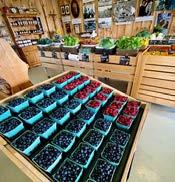
Cindy Bircham, of Elgin Harvest, assembles freshlyprepared, locally sourced ingredients for a pizza. As seasons and fresh ingredients change, so do the sauces and toppings on the 11” sourdough crusts. This one was a “RhubarB-B-Q Pork”, made with rhubarb barbecue sauce, slow roasted pork, pickled jalapenos and mozzarella.

is spent testing seasonal recipes, sourcing fresh ingredients, preparing sauces and toppings, and firing up the wood-burning pizza oven in order to make a quick, delicious from-scratch meal.




Bircham tends to the pizzas as they cook in the wood-fired pizza oven. The 4.5-ton oven hails from France, and was, unsurprisingly, quite an undertaking to move from it’s previous outdoor, mobile dwelling to a permanent, indoor home. Those used to seeing the oven at outdoor markets may be surprised to learn that this is the same unit as the one that looked fairly hardy and weathered – it received a head to toe cleaning and polish once Bircham knew it would be coming inside out of the elements.
The freshly baked pizzas were cut and garnished before being quickly consumed by the diners, who had intended to eat just two slices, but felt obligated to polish off a third. Not only were they looking forward to leftover slices, they had also purchased quiche and frozen pizzas from Elgin Harvest to enjoy at home.
“My approach has always been to source as many locally-produced ingredients as possible, including growing some myself,” says Bircham. “Sourcing local often means being limited to seasonal offerings, so our menus change frequently with some items only available for a week or two, like peaches on pizza.” To extend the local season, Bircham preserves some items by fermenting, freezing or dehydrating. Her local inspiration comes from her rural roots, growing up in Aylmer’s agricultural area, and a desire to inspire with quality and variety in locally-sourced food. “Much of the local ingredients are sourced by developing relationships with farmers and producers at local farmers’ markets, networking with other small businesses and

word of mouth from customers,” says Bircham. Her year-round local list includes firewood from Mazak Farms in Talbotville, flour for pizza and fresh pasta from Oak Manor Farms in Tavistock, milk for fresh mozzarella cheese from Walker Dairy Farms and fresh basil from Sleeger’s Greens in Strathroy.
The local focus is an important differentiator for Bircham’s business. “In a small city with no less than 15 restaurants offering pizza, being the one that offers a unique and local taste experience is what sets us apart,” she says. And she’s got lots of plans for her new space – expanding the frozen wood-fired pizza offering, curating a craft beer, wine and cocktail program, and displaying the work of local artists.

for The Aylmer Express

Ontario 4-H members and their families found a silver lining through the pandemic – a chance to learn new skills in the kitchen while connecting with their families and fellow 4-Hers across the province.
In response to the pandemic, volunteers like John Drummond, a 4-H leader in Waterloo County, identified the need to keep 4-H members engaged and connected. He teamed up with fellow volunteers to offer a series of virtual 4-H cooking and baking clubs. 4-Hers embraced the new virtual experience that brought them into the kitchen for two hours on Saturday mornings to make lunch together.
“It’s been a wonderful experience,” explains Drummond. “We’ve had as many as 118 members come together online to learn and cook – all from the comfort and safety of their own kitchens.”
Available for youth ages 6-21, 4-H Ontario hosts leadership and life skills programs for youth and volunteers. Like many organizations, the pandemic affected the way people participate in activities and programs, including 4-H. Many members embraced technol-
ogy and participated in virtual learning opportunities, including the virtual cooking clubs led by Drummond and his team of volunteers.
For many members and their families, the 4-H clubs provid-

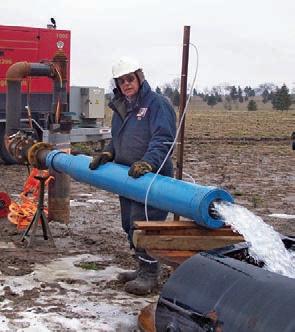

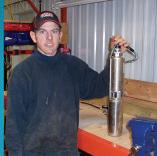
ed unexpected opportunities to learn new cooking and baking skills, and to try new foods.

Since the start of the pandemic, Drummond and fellow leaders have hosted nine themed cooking clubs ranging from pizza, bread and Christmas baking to international lunch clubs,
comfort foods from around the world and back in time for dinner where members learned how to cook meals from decades past. Each club offered six meetings. Elgin County 4-H members Danica and Shana McKillop participated in a number of the

Shana and Danica McKillop, Elgin County 4-H members enjoy cooking along with fellow 4-H members from across Ontario during a virtual meeting. (AE/contributed)
new virtual cooking clubs and say they’ve enjoyed making and eating the meals, and are particularly proud of their new-found confidence in the kitchen. “The most challenging part was to learn how to properly cut up an onion,” says Danica, who enjoyed making pavlova and A delicious lunch made by Elgin County 4-H members Shana and Danica McKillop. (AE/contributed)
Elgin County 4-H member Shana McKillop puts the finishing touches on a dessert she made during her virtual 4-H cooking club. (AE/contributed)

IGPC is located in Aylmer, in the heart of Ontario’s grain corn production area, we are reliable, local, and always close enough to deliver fast. IGPC Feeds believes in the power of cooperatives, putting community first, and putting farmers first. We are proud to be part of the agriculture community.
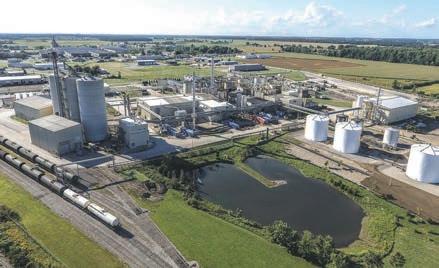

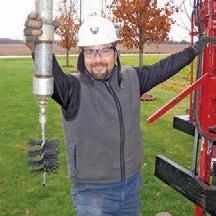
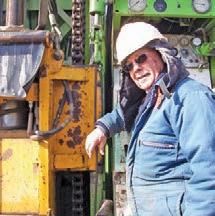
Corn Dried Distillers’ Grains with Solubles (DDGS) - a great choice to boost your livestock’s health and performance.




Aussie meat pies during a ‘comfort foods from around the world club’ meeting where they learned about Australia. Her sister Shana says the international lunch clubs introduced her to new foods that she wouldn’t have eaten otherwise.
“Some members have turned the meetings into a family activity with siblings and parents getting involved. And, at a time when there wasn’t a lot to do during the pandemic, 4-H turned into a family affair, something that was needed during such a difficult time,” says Drummond.

For Danica and Shana, they loved sharing their new culinary skills and dishes with their family, and continue to cook and bake their favourite recipes from the clubs. Their mom



Andi McKillop says the family eagerly looked forward to Saturday mornings in the kitchen with their fellow 4-H members during the pandemic and is grateful to the leaders for offering such a unique learning experience. She also notes the additional opportunities the clubs provide, like virtually meeting 4-H members from across the province building new networks.


“The 4-H motto is ‘Learn to Do by Doing’ and it’s been more important than ever before during these unprecedented times,” says Laura Goulding, Manager, Communications with 4-H Ontario. “The confidence to take on a new challenge, think critically and be resilient are all core skills built in 4-H that have been imperative throughout the pandemic.”
Goulding explains that many 4-H associations stepped up to run virtual clubs that have allowed youth from across the province to join in from any location, an unlikely opportunity prior to the pandemic. And in the case of the virtual cooking and baking clubs, not only did members learn new skills in the kitchen, but leadership and public speaking skills were also on the lunch menu.
“The ability to present and address a group in a virtual format is quickly becoming a necessary skill,” says Drummond. With the international themed cooking clubs, members were tasked with researching countries, people, culture and food, and making a brief presentation to small groups during each meeting. Members were also asked to complete an achievement project by making a meal for their family as part of each club. “Again, these projects often became another experience for the 4-H families to enjoy together and learn from each other,” says Drummond.
The success of these virtual club opportunities – that brought skills and leadership development into the homes of 4-H members and their families during such a challenging time – won’t be overlooked as pandemic restrictions are lifted.

“As we plan ahead for 2022, 4-H Ontario members and volunteers look forward to the return of in-person activities, with the continuation of virtual or hybrid 4-H clubs to offer safe and inclusive programs,” says Goulding.







“I joined 4H when I was 11, because I was very shy and my family heard that 4H would help me build confidence and help me feel included in something. By being a part of 4H for the past 4 years, I have made so many new friends, learned a lot about myself and have been able to learn about things I am interested about, such as showing cows in the dairy club. I have also been in other clubs, such as the Hiking club and Holiday club and

I am glad I have been a part of 4H because it has made me a better person.”
- Elise Donaghy, Elgin County 4-H memberJudge Lars Zeldenryk eyed entries in the Junior Heifer Class during the Elgin 4-H Dairy Show at Aylmer Fairgrounds on Saturday, Aug. 21. The show involved 21 competitors. The Grand Champion Showman was Marielle Roos and the Reserve Grand Champion was Elise Donaghy. (AE/Rob Perry) Karson Vis led away Maplekeys Master Marigold, sired by Golden-Oaks Master, after winning the Junior Heifer Calf class at the Elgin 4-H Dairy Show in the cattle barn at the Aylmer Fairgrounds on Saturday, Aug. 21. He also won Novice Dairy Showman. (AE/Rob Perry) Charlie Dykxhoorn presents the 1st Intermediate Showperson award to Elise Donaghy at Elgin 4-H Dairy Show at Aylmer Fairgrounds on Saturday, Aug. 21. A week later at the Holstein Ontario Western Region Junior show, Ms. Donaghy was named Champion Showperson, and also showed the Champion Calf Mistyglen Bocce Denver. (AE/Contributed)
• G.P.S./V.E.R.I.S./Soil Optix Conventional soil testing services & field mapping

• Crop advising/consulting (Certified Crop Advisors [C.C.A.’s] on staff)

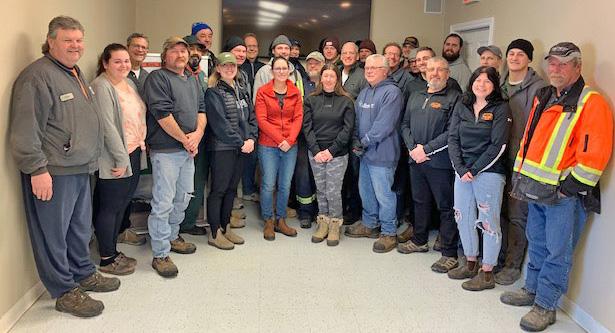
• Professional Conventional or Variable Rate Fertilizer application (Field/Row Crop)
• Professional Conventional or Variable Rate Agricultural Lime application
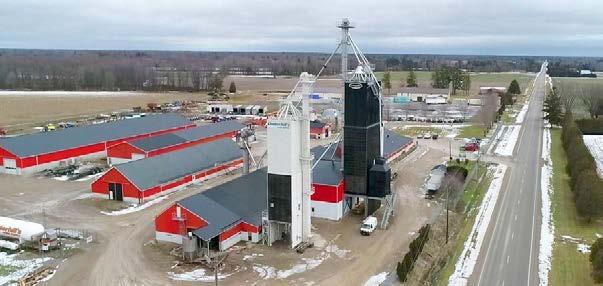
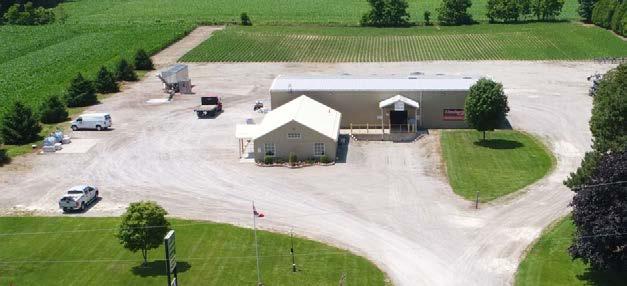
• Professional Manure/Compost Application
• Professional Fumigation application
• Professional Custom Spraying (field/row crop)
• Equipment Rentals (gravity wagons, tenders, 28% applicators and nurse tanks/ trailers, fertilizer/lime spreaders)
• Crop Scouting, tissue sampling
• Structural Fumigations
• Complete line of Dekalb, Syngenta and Brevant seed

• Agricultural Field Lime
• Soil Amendments (N-Rich, Ka-Lime, Manure, Mushroom Compost, Gypsum, Spanish River Carbonatite)
• Bulk or Bagged Blended Dry Fertilizer (Ability to effectively impregnate liquid micronutrients/fertilizer additives)
• Liquid fertilizer (28%, 32%, ATS, liquid starters, liquid calcium nitrate)
• Water Soluble Fertilizers
• Organic Seed and Crop Inputs
• Comprehensive Line of Crop Protection Products (Field and Greenhouse)
• Soil Fumigants
• Complete Line of Crop Production Products for all Row, Horticultural and Greenhouse Crops


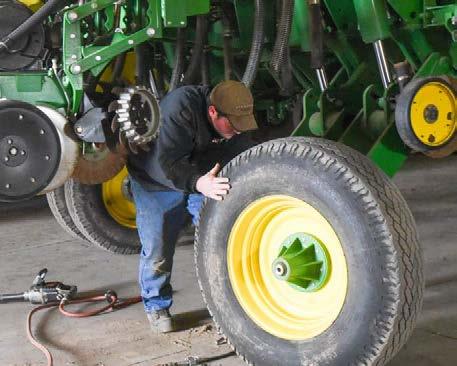
By Jeanine
Moyerfor The Aylmer Express Spring planting season is always met with optimism across Ontario farms, but the outlook this year is also marked with uncertainty. Ontario farmers are still feeling the effects of the Covid-19 pandemic – including labour challenges, crop pricing and the soaring cost of inputs, like fertilizer. And now, the invasion of Ukraine is casting a long shadow on the 2022 growing season with more market fluctuations and supply chain interruptions.
“What happens on one side of the world impacts the other,” says Scott Persall, Waterford, ON crop farmer and director for Grain Farmers of Ontario’s District 5 (Elgin and Norfolk).
“While we grow our crops here in Ontario, we rely on the global market to buy inputs and sell our crops.”





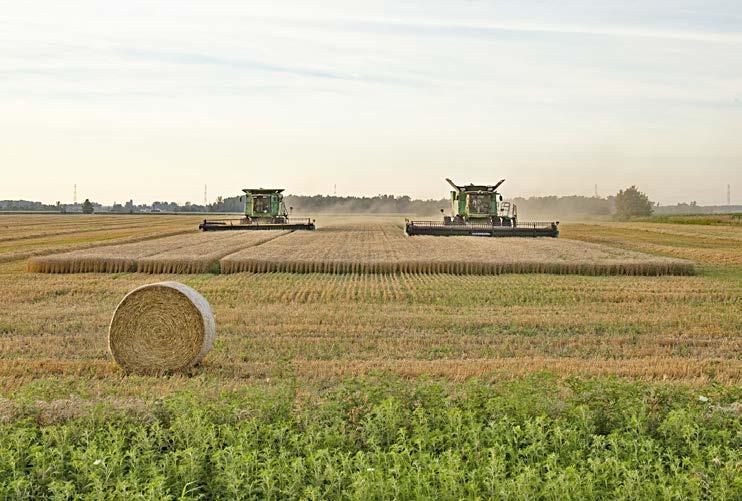
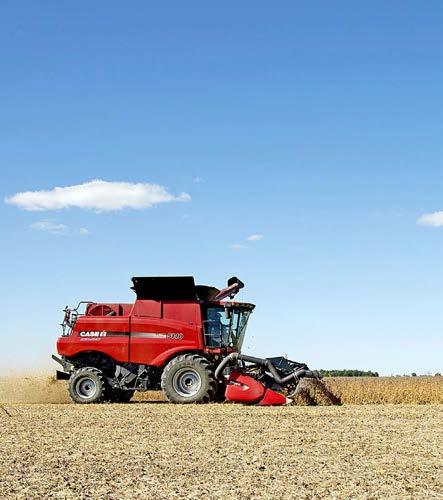
Persall farms with his wife Sara and son Ethan, growing corn, soybeans and wheat on 400 acres. They also have 18,000 laying hens. He says he’s optimistic about the upcoming 2022 growing season – if he’s able to get the inputs necessary to grow his crops. These inputs include commercial fertilizers like nitrogen, that he and fellow Ontario crop farm-
ers rely on to provide necessary nutrients to the soil and their crops. “Most farmers have planned their input needs and have placed their orders from local supply companies, but there’s concern about receiving our orders due to supply chain disruptions caused by the conflict in Ukraine and the resulting impacts of shipments from the Black Sea.”
The other challenge for farmers like Persall is the cost of inputs have increased dramatically, by as much as more than 100 per cent for some products. “And that doesn’t even include the soaring cost of fuel, another input that is essential to run our equipment to actually plant and harvest our crops,” notes Persall.

It’s true, that as farmers feel the pinch of higher input costs, they have seen a significant rise in market prices for their crops. Persall explains that while crop farmers have enjoyed the higher prices, not everyone markets their products on the same day and has been able to take advantage of these record highs.
“In fall 2021 we found ourselves in a market where we couldn’t get enough of everything,” says Philip Shaw, agricultural economist and farmer in Dresden, ON, explaining that after nearly two years of disrupted supply chains from the pandemic,


the global market reaction resulted in high crop prices for farmers. The dry growing season in South America, where a large portion of field crops are grown, resulted in a reduction in worldwide supply and pushed crop prices higher. “Today, market prices are reaching record high levels, but this is a result of the global events in Russia and the Ukraine that are sending shock waves through the global economy. And we’re feeling them right here in Ontario.”
Shaw notes economic uncertainty, higher inflation, the rise in oil and gas prices, and the costs of crop inputs for Ontario farmers as the most immediate effects of today’s global events. “There’s concern about a global wheat shortage too, and that’s driving up prices and drawing attention from consumers,” Shaw says. But there is good news. Spring planting season is just around the corner. “Farmers are always optimistic in the spring,” says Persall. “While we would all like to see an early start to planting, we already know we’ve got a good start with plenty of Ontario winter wheat that was planted last fall.”
As spring weather approaches, farmers and everyone else will be keeping a close eye on unfolding world events and how they impact daily farming activities. “These events remind us we are all connected,” says Persall.
Elgin Federation of Agriculture (EFA) held a round table meeting on Thursday, March 31 with presentations from area commodity groups and elected officials. See story covering the meeting on pages C12-13 for industry reports, concerns and outlooks for the coming season.
What happens on one side of the world impacts the otherGreg Fentie

Traditionally,
well as a 35-acre woodlot nearby.
remembers having a binder full of syrup orders.
Silence
these days betrays the actual performance of the Palmer’s Maple Syrup operation in Southwold, west of Port Stanley.
Business has actually been steady as the third-generation syrup makers satisfy demands for nature’s liquid gold, riding high on the pandemic’s revival of ‘buy-local’ sentiments.
“Sales have been steady, for sure,” Laura Palmer said in a recent interview. “People are searching out the small businesses to find maple syrup.
“People were doing it before too, but they are coming to the farm more and more,” she added. “The pandemic really fortified that.”
Instead of the buzz from upwards of 80 people a day, chowing down on pancakes, waffles and maple-baked ham, the atmosphere is far more subdued.
The Palmers are not running tours of their picturesque farm, or fascinating families with tales of the history and evolution of the maple syrup harvest.
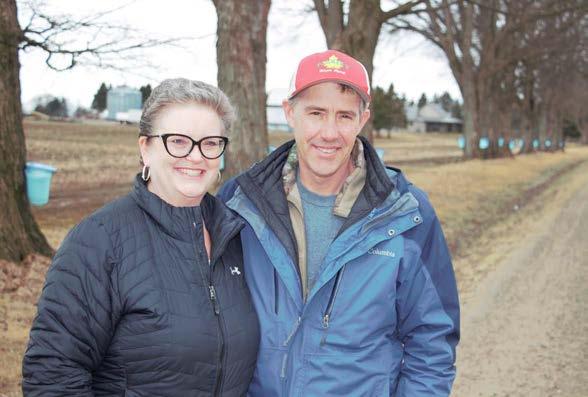
They’re busy fulfilling ‘curbside’ cash and carry sales, while also keeping up with commercial orders from retails outlets like
Briwood Farm Market, in St. Thomas, the Port Stanley Foodland, and The Turkey Shoppe, in Talbotville.
“The Syrup Shanty is a tradition for most families,” said Brian Palmer. “It goes until their kids get older, then they start to bring their grandchildren.
“We use to serve pancakes out of the garage,” Palmer recalled.
The Syrup Shanty first opened in 1999 as part of the family’s commitment to Ontario’s agri-tourism industry. They hope to invite the public back to the shanty next season.
The Palmer clan has been selling maple syrup to the public since 1955. John Duncan Palmer represented the first generation of syrup makers. His son Ken John Palmer took the helm until Brian and Laura bought the 100-acre farm from Brian’s mother Ellen, 80, in 2004. Cole, 18, and Chris, 13, represent the fourth generation of syrup makers.
The Palmer’s farm expanded to 6,000 taps from 1,500 taps in 1999, while also moving from bucket collection to vacuum hoses to enhance yield. The family farm includes a 10-acre woodlot that’s tapped for maple syrup. The balance of the property is rented to other farmers, who grow mostly corn and soybeans. Palmer also rents a 15-acre woodlot from his mother for syrup production, as

Palmer’s Maple Syrup is the largest maple syrup operation in Elgin County. The family harvests one-and-a-half litres per tap every year, all bottled in the now familiar beige plastic jugs, with the catchy red leaf labeling. “It’s my main source of income,” he said.
Canada is the world’s leading producer and exporter of maple products, with about 11,468 maple farms and 47 million taps, generating about 75 per cent of the world’s syrup supply, according to the Canadian Encyclopedia.
Canadian syrup makers exported more than 61 million kilograms (kg) of maple products worth $525 million in 2020. Quebec produces 96.4 per cent of Canadian product exports. The U.S. is Canada’s best customer, consuming 59.1 per cent of total exports in 2020. Other buyers include Germany, Japan, the United Kingdom, Australia and France.
“It used to be that everybody got all their syrup in the spring, but now we sell it all year round,” he said. “Really, we sold mostly to old railroad guys in St. Thomas. Then all of a sudden, it just quit. They all died. “We mostly do family gate sales and wholesale now,” said Palmer. The business is not yet equipped to manage online sales. “I should be, but I’m not a techie. It’s something I’ll do in the future. You always look for new markets.”
The Palmers have also sold a lot of maple syrup at the Horton Farmers’ Market, in St Thomas, through the years. “I went with my father as a kid and then when the market was closed for a while (in the ‘80s), we started wholesaling the syrup at local stores.” Palmer
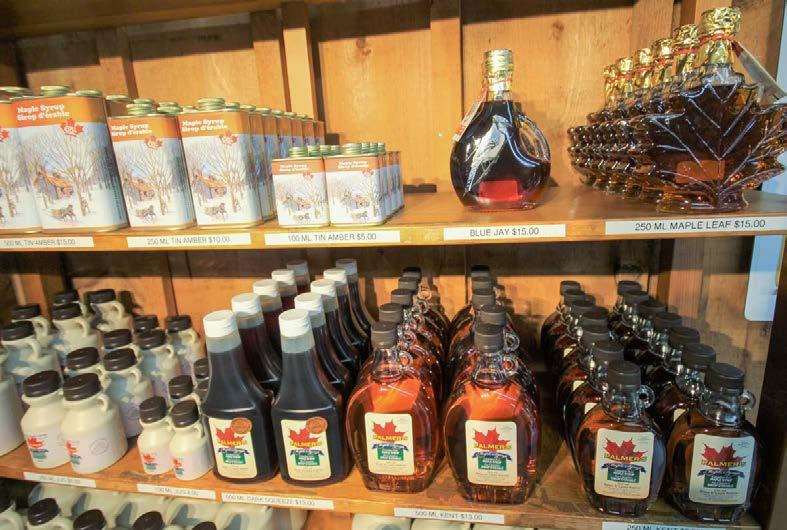
The syrup is flowing well this year.
Ideally, Palmer’s maple forest is at its best with minus four degrees Celsius nights, and plus 4 degrees Celsius days. Harvest stretches over 20 days on average. Generally, he taps the trees on Valentine’s Day, drilling a new hole every year, and finishes at the end of March.
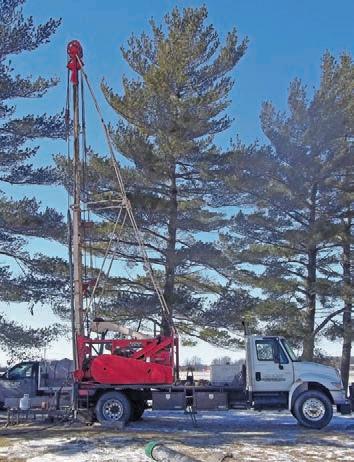
“It varies, but it’s been pretty consistent through the years,” said Palmer. “When I was a kid, it was different, but there were different weather conditions then.
Agri-tourism is a sub-set of rural tourism that specifically supports agricultural production. It can be an effective diversification option for farmers.
most people bought their maple syrup supplies each spring, but nowadays, products on the Palmer’s Syrup Shanty shelves are a year-round attraction. Maple syrup production is right on schedule and the Palmers are stocking shelves in the Syrup Shanty, as well as popular retail outlets across the county. (AE/Joe Konecny)
Many youngsters also enjoy pancakes with their generous servings of Palmer’s syrup. Before the pandemic disruptions, Palmer’s Maple Syrup welcomed upwards of 80 people a day, visiting the Syrup Shanty for a sweet treat, touring the farm, or enjoying open fires, with stories about the history and evolution of the maple syrup harvest. (Facebook: Palmer’s Maple Syrup)
Elgin County’s General Manager of Engineering, Planning and Enterprise. “From Bluegroves Farm, in West Elgin, to Wildflowers Farm, in Central Elgin, and Clovermead, in Aylmer, promoting farm visits is integral in what we do.
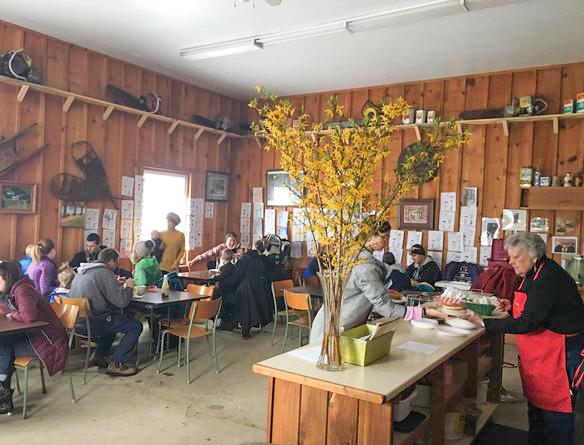
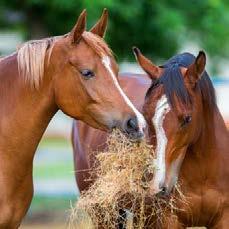


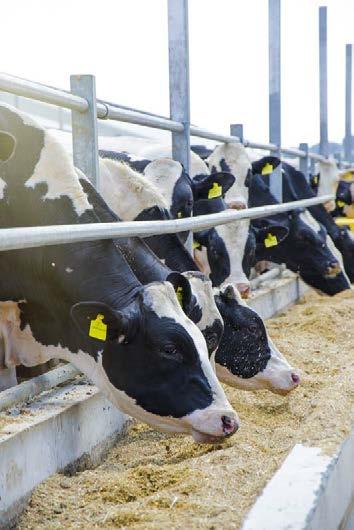
The Syrup Shanty first opened in 1999 and quickly enshrined itself in several generations of pancake and syrup lovers. (Facebook: Palmer’s Maple Syrup)


“Elgin County Tourism recognizes and promotes the strong agri-tourism businesses and experiences here in Elgin County,” said Brian Lima,

“Our department focuses on developing this sector through various channels such as our Maple Syrup Trail, Savour Elgin program, Buy Local Buy Fresh, Fall for Elgin campaign, and a dedicated agri-tourism presence on our website and

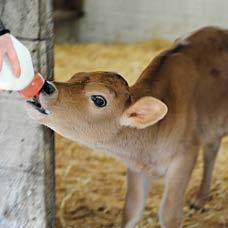




Visitors Guide,” added Lima, who also serves as Deputy Chief Administrative Officer. Lima shared a September 2021 report by the Food Retail Environment Study for Health and Economic Resiliency (FRESHER) that outlines the struggles of food retail businesses –including farmers’ markets – and their resiliency during the pandemic.

The report was prepared by the Human Environments Analysis Laboratory (HEAL) at Western University in partnership with the Elgin Middlesex Oxford Workforce Planning and Development

Board. The study found that despite “the documented hardships during the pandemic, participants demonstrated clear evidence of resiliency, at both



business and personal levels.
“Many food retail and food hospitality businesses took advantage of available technology, building their online infrastructure and adapting products to reach personal consumers online,” the report continues. “Community and government programs offered relief for many owners and seem to have alleviated some financial uncertainty for businesses and individuals. Communities also found unique ways to push the ‘buy local’ mentality and feelings of solidarity were high, especially in the early months.”



The Syrup Shanty is a tradition for most families. It goes until their kids get older, then they start to bring their grandchildren.”
- Forklift Rentals with Rotators/Clamps

- Stocking Quality V-Belts
- Regeneration Service for Large/Small Batteries

- Custom Hoses crimped as you wait
- Operator Training on:
- Forklift - Loader - Skidsteer - Scissor Lift
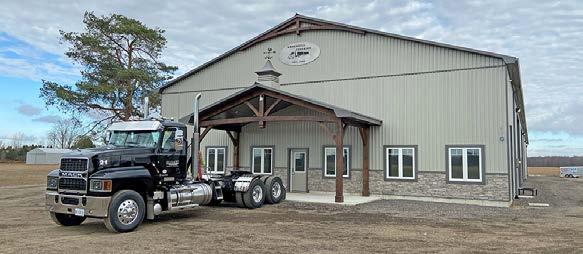
- Telehandler - Fall Arrest
Authorized Dealer
624 Talbot St. W. Aylmer
Phone: 519-773-5913
Toll Free: 877-773-5913
www.martinslifttruck.com

APRIL 16 - SEPTEMBER 3, 2022
The summer exhibit will commemorate the 125th anniversary of the Baker Family Re-union and Picnic, the oldest of the many family reunions that were once popular in Elgin County and elsewhere.

Ribbons, programs, and photos from club, school, and church picnics are also included. These events were major social occasions that brought, sometimes, thousands to our lakeside ports.
By Renée Hueston of The Aylmer ExpressThe very essence of agriculture is putting faith in a system that is filled with variables that are outside of one’s control, that by nature of the profession farmers have to be resilient and optimistic. Local farm group leaders postulated that such positivity and strength made them better prepared in the face of challenges such as supply chain issues, rising fuel and land costs and limited processing capacity.
Elgin Federation of Agriculture President Melissa Schneider and Vice-President Greg Fentie recently talked to The Aylmer Express about farming in Elgin, and some current issues.
Melissa grew up on a Sparta-area family farm, and now works for Ontario Farmland Trust.
Greg introduced himself saying, “I run a small dairy farm north of Springfield.” He has a wife and three kids – and a bill. Or at least a bill he hadn’t planned on “I managed to break a door in the barn last night” in an incident involving an overhead door getting caught on the back edge of a mixer, then crashing down. “They’re going to come fix it today, but I’ll also have a bill and I don’t know how bad it’ll be.”
Greg was first asked whether there was anything remarkable going on in dairy the dairy industry right now?
He highlighted a couple things including a grocery code of conduct and sustainability practices.
For the grocery matter, with few companies controlling supply nationally, Greg said, “it’s an unfair power balance and it’s not conducive to a healthy competitive marketplace.”
He gave an example of a grocery chain ordering a thousand chocolate milks. If they only received 900, they would only pay for 900, but they may also apply a penalty against the supplier for not providing the full order, even if it was out of the supplier’s control. And it wasn’t just milk – fees and fines were reportedly applied across many commodities, and moreso during the pandemic when many suppliers were encountering production obstacles.
An industry-wide code of conduct that would establish a set of fair business practices and stabilize the power imbalance between suppliers and big grocers. He said sustainable initiatives were also top of mind for dairy farmers, and that they wanted to do what was best for the environment, “but you also have to remember, it needs to be profitable as well. If farmers can’t make money doing this, that’s not sustainable either.”
Examples of sustainable practices in dairy included improving feed efficiency and herd optimization. “Nobody breeds for a cow that produces less milk.” He explained, “If they eat the same amount of food and produce more milk, then that
lowers your environmental footprint because you’re getting more from less and you can actually do with fewer cows.”

Greg also touched on the subject of soil improvement and no-till. He said, “that’s a fun one for us as we brought in this digestate product from Bartels. It’s black as your shoes (assuming you’re wearing black shoes) and it has a fertilizer value to it. We were able to mix that in our manure pit with our existing manure and spread that product out on the fields. We had enough time last fall to get about a third of one of our wheat fields covered.”
And those effects were already paying off, “I put my drone up and you can make out to the exact spot in the field where that last tank ran across and where it ran out. The wheat is that much greener where that is.”
He said it was a win on multiple fronts, “That’s a renewable resource, both in terms of energy and in terms of nutrients. And it’s a local thing. It comes out of London and now I’m not relying on potash from Saskatchewan. So that’s one of the things that I’m doing to mitigate the higher fertilizer prices this year.”
Deeper appreciation
Both Melissa and Greg grew up on family farms, and were asked what is the best part of such an upbringing.
“It teaches you a lot about responsibility and fiscal management,” said Melissa. “You bring a lot of that into your later life skills as well. It sets you up to be very mindful of who you are and what you have and what you do.”
And on a lighter note, “It is a fun activity to grow up rurally. Despite the number of chores every farm kid has, it’s still just a nice environment to grow up on.”
Greg said, “I wish I could have a comparison because I only ever grew up on a farm. It was just growing up. You learn responsibilities. You learn—I hate to say it—but you learn life and death. We’ve seen calves born and you have to see cows die from time to time.”
He then added, “I wonder if you appreciate the opportunities to get out, socialize with others more because we’re fairly isolated on the farm. You appreciate so many more things. I hate to be that corny guy that says you look out and you see the sunrise across your hay field the morning, but oh my God, that wins. Right? That wins. I don’t know what you wake up looking to, but in the morning out here you look to the east. It’s nice.”
On the subject of growing up on farms, Melissa sadly observed, “Unless you have land that you can pass down to the next generation, there will probably not be a way for many people to get into land ownership anymore.”
She surmised that without the backup of family financing, “If you were to purchase a farm at today’s prices at today’s going rates, it’s very likely the only thing your kids would be inheriting is your farm debt. And it might even go one generation further.”
She worried, since farming was already an unpredictable profession, “Mother Nature’s bad mood one day can make or break your entire year. And how many years does it take for that to happen before the debt becomes overwhelming.”
On the other hand, the high cost of land was paying off for farmers looking to cash out. Melissa cited a farm near Port Stanley that recently sold for a reported $31,000 an acre.

On the subject of land and debt, Greg chimed in with a growing worry of his. This year he was worried arbour input, cost and availability, but “my concern for next year is interest rates.”
Rates have gone up this year, and he read they were predicted to continue rising.
“How do you get out from under that? If the interest rates go up, you still own that land. And the only way you think you can pay that off is to continue to own and work the land. But if at some point you can’t make the payments, then you don’t own the land anymore.”
They then got on the topic of development around the edges of urban areas, which is one of the factors making agricultural land so valuable for those who buy it, rezone it and develop it into subdivision housing.
Melissa wondered, “How much housing do we need versus how much farmland do we need to grow things, to be able to feed our own people in our own country?” She knew both were essential, “But you can build houses where you can’t grow food. It should be all about infilling and upfilling. It should be about smart planning and smart decision making and incorporating those things into your municipal official plans.”
Greg added, “My perspective is houses are great and all, but unless they’re made of gingerbread, you just can’t eat ‘em.”
The pandemic was a disruption on many different fronts at the same time, but farmers do what they always do, which is farm as well as they can given the circumstances.
“You have to be optimistic to put a seed in the ground and hope that it grows”
Greg Fentie was singing the praises of buddy seats in farm equipment. Here, he says, “Normally I drive, but I also wanted to fly the drone and I can’t do both. So, I scooched over to the buddy seat and let my hired man Damon Lindsay drive the big girl. If the rows look crooked, it’s Damon’s fault.” (AE/Contributed)
As far as farming in Elgin County in particular, the EFA leaders said area farmers are methodically figuring out how to maximize what works on their land, whether that be crops or livestock.

Greg said, “Farmers are becoming


Always optimistic
To conclude the conversion was a question on whether the general outlook for farming in Elgin was positive or negative.


Greg said, “You have to be optimistic to put a seed in the ground and hope that it grows and turns you profit. We’re always an optimistic people. But you want to be cautiously aware of the risk going forward and what that could

Melissa said, “Generally farmers try to hold a positive attitude, but there are so many uncontrollable outside influences going on in our universe right now that it is hard to predict.”
For the coming year she hoped for the best as “people managed to lock
Rising fuel costs were brought up during the interview. It was mentioned that people living in towns and cities could make decisions to save on fuel including what type of car they bought, shopping locally, carpooling, or opting for staycations. Did farmers have any options to save on fuel?
Greg Fentie said, “I’d love to have an option. But my combine burns about 2-2.5 gallons of diesel fuel per acre. It does better (on fuel consumption) when the fields are flatter. But you can’t change where that hill is in the field. And it does better when there’s a lower yield, because there’s less going through the combine – but that’s not a great thing.”
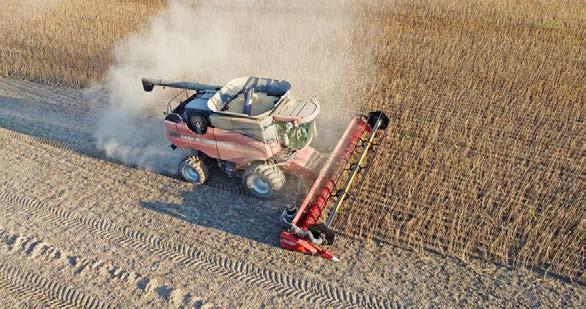
He said, “If you have an idea, I am all ears.”
It was decided that carpooling wasn’t an option, but he said, “We do have a buddy seat and that is one of
the most underappreciated spots in a tractor. People are more than welcome to come out and go for a tractor ride. It sits empty most of the time. And I listen to Shakira on the radio and even she gets boring after a while.”
As if combine rides alone weren’t enough of a draw, Greg added, “Actually, I provide candy in case there’s children that want to come up because they love going for combine rides – ‘And here’s a gummy bear to go with it.’ It’s a wonderful experience. I love harvest season for that.” It was jokingly suggested that he could offset fuel coats by charging for rides, but he interjected, “I wouldn’t even charge. I wouldn’t dare do that. I love teaching about agriculture and how do you charge somebody to learn? You know, it benefits everybody for them to learn about agriculture. I would have a hard time charging for that.”

ing six months for a machinery part to arrive. In the meantime, he had adapted in order to keep working, she joked, “he MacGyvered something with tape and a piece of chewing gum and an elastic bit.” Then more reflectively said, “he came up with something that worked until he could get what he needed.”
Greg agreed, “I think on farms we always attempt to learn. It just happened faster in the last two years.”
Melissa said the pandemic also “shone a light on the fact that rural communities still do not have good access to reliable affordable internet services.” She knew local governments were working on better rural connectivity, but hoped that progress would happen sooner than later.
This yield map demonstrates Ontario corn growers’ 2021 yield. EFA Vice-President Greg Fentie said, “The 200-bushel average last year was a pleasant surprise. We had a dry late May and June which stimulated root development. When we got all those rains July through August, the plants were well-positioned to take full advantage of soil nutrients and moisture.” An average yield for the region is 175 bushels per acre. For 2022, Greg worried about rising input costs, and the pressure that put on the coming harvest. Rough calculations he did in the fall saw a break-even yield of 135 bushels per acre for the coming season. That break-even number is likely even higher now, as costs of nearly all inputs have increased in recent months. (Agricorp)




David
Mennill,Mayor
Central Elgin is an agricultural based municipality and assisting our farmers is an important element in our economy. We need to help them value their lands and continue to use the lands in food production. A
real threat to our farm lands and our farmers is the rapid growth in population and the need for more housing. It is very important that we preserve our agricultural Class 1 and 2 lands for food production. Growing up not out is one way to help preserve our farm land. We also are working on different types of housing to use less land area and concentrating our growth in non prime agricultural lands. Another threat is our changing climate that will involve new and innovative ways to farm in the future.
Buying local continues to be very important to help support our many farm markets. The value added products are things


fabric of our community. Farmers put in long hours to produce the food, fibre and fuel for their fellow citizens. Even with the additional challenges of operating within the environment of a global pandemic, farm families by their very nature have and will continue to persevere through the traditional uncertainties of weather and market place.
we all enjoy. These markets are very important in helping farmers produce the income they need to remain in farming. The past two years have been very difficult for the farmers who hire migrant workers to harvest their specialty crops. Hopefully things will improve this year as we move back into a more normal life style with so many of our population vaccinated and as a result restrictions being lifted. I personally want to thank all of our farmers who continue to support our economy and feed all of us, using new and better methods to keep our rich soils viable and healthy. May this season be a good one for all of them.
shortages, sky rocketing prices for fuel, fertilizer products, and other agricultural inputs are but some of the hurdles facing agricultural producers and input suppliers for the coming growing season.

Farming is Malahide’s largest agricultural industry and the backbone of the township. The farming community is looking forward to 2022 with cautious optimism. On one hand, all commodities are in a favourable price range
while, on the other hand, fuel, fertilizer and sprays have all increased in price dramatically. Our hopes of finally seeing the end of Covid-19 after two years, has been fronted with the war in the Ukraine and all the financial implications that armed conflict has on the entire world. We can only pray for the end of Covid-19 and the end of the war in the Ukraine, leaving farmers to wrestle with Mother Nature to bring in a successful harvest.
I have been farming for fifty years and every year has been a challenge but when I average it all out, I would not have been happier doing anything else. Good luck to all the farmers community in Malahide.
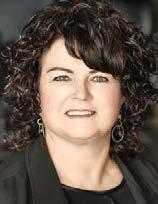

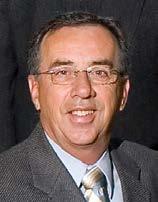
I am very proud of the farming families within Bayham, and the agri-businesses that support them. Agriculture remains the top economic driver of our municipality. Farm families spend locally, provide employment, support the local tax base, and are involved in many community initiatives. They are integral to the social
Agriculture and its integration into all facets of society is not immune from the effects of current events. COVID-19 may be lessening its grip on our society, however the pressures created on supply chains in its wake, together with ongoing international strife, will present some additional challenges for our farm families for 2022. The shortage of repair parts, labour
Karen Vecchio, MP


It is important that we recognize the importance of farm families and agri-business to our society, the challenges they face, and their commitment to their community and industry. We must encourage their ongoing efforts. As the licence plate holder says, if you “Eat Today, Thank a Farmer”.
On behalf of Council and Staff of the Municipality of Bayham, I extend greetings to Bayham’s farm families and agri-business and express sincere wishes for a safe and productive 2022 growing season.
On behalf of the businesses and residents of our area, we want to express our appreciation for those businesses in the agriculture and agri-food economic sector. Agriculture and agri-food sector plays a key role in the our local economy but also in the Canadian economy through employment and food supply to name a few. Easily, we
overlook this industry because farmers do not necessarily have a storefront to visit that we do not see them as a business contributing to our local economy. They work day and night to plant, maintain and bring in the harvest, feed families, to tend to the animals and commit their whole lives to their farm operation. This sector gives Canadians’ access to affordable and high quality food. We are excited with the upcoming openings of the Old Imperial Farmers’ Market and the revitalization of a new Aylmer Sales Arena & Farmers Market and the beneficial impact these will have on our local farming community. To draw consumers to our area, to supply quality, local produce and products is something we very much look forward to.
Agriculture is a staple of Elgin-Middlesex-London with approximately 20% of local jobs tied to the agricultural sector. I want to extend my gratitude and thanks to farmers and agribusinesses across our community for their tremendous work
through ongoing challenges. The War in Ukraine and sanctions imposed by the Government of Canada has created supply chain threats and concerns with distributers and producers. A significant amount of nitrogen and phosphate from the Baltic region has yet to reach Canadian soil and cost of these products may face tariffs. I continue to speak with local ag-retailers and farmers about their concerns with these tariffs and provide updates to my colleagues on the Standing Committee on Agriculture and Agri-Food (AGRI). Agricultural producers continue to face challenges and increased inputs as fertilizer, fuel, parts, and shipping costs

surge across the country. My colleagues and I understand the threats to Canada’s food security and supply chains as more producers express the infeasibility to continue to farm due to rising costs. In the House of Commons, my colleague MP Ben Lobb has re-introduced Bill C-234 An Act to amend the Greenhouse Gas Pollution Pricing Act, to exempt natural gas and propane from the Carbon Tax for any on farm use.
Elgin-Middlesex-London agricultural producers are always in the forefront of my priorities as your Member of Parliament. I will continue to support farmers and agribusinesses and wish everyone a successful planting season.
The agricultural sector holds a special place for the Town of Aylmer and its relationship with surrounding rural municipali-ties. Whether it is fond memories of growing up on a farm or the relationships that our local businesses have within the sector, agriculture will always remain near and dear to our hearts.
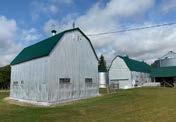
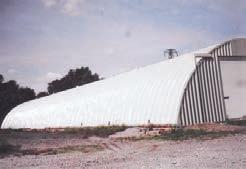
With springtime being just around the corner, preparation for another busy year begins. This is an exciting time for the community and surrounding area, as we turn the page on the colder winter season and begin to enjoy the extra sunlight and warmth brought on by the new





season.
As the predominant growth centre in the East end of Elgin County, numerous businesses within the Town of Aylmer are ready and able to provide the many services and supplies that support the agricultural sector throughout the coming year. We are grateful for this ongoing relationship, as it continues to benefit everyone in our community and positively influence the local economy. This includes but is not limited to the ongoing creation and sustenance of jobs in the sector and the availability of fresh, healthy and local products.

The Town of Aylmer will continue to look for new, innovative ways to work with local agricultural partners and we wel-come opportunities that will be beneficial to all of us. On behalf of Aylmer Council and staff, I would like to thank our rural neighbours and other stakeholders within the agricultural sector for their continued support of our growing community and I wish them all the best in 2022.
The subject of the war in Ukraine came up during a discussion with Elgin Federation of Agriculture Vice-President Greg Fentie as it related to fertilizer and costs at home.
Greg said the decisions being made here related to rising costs and shortages were challenging, but nothing compared to the decisions being made by farmers in Ukraine.
“My heart breaks for those farmers in Ukraine. There’s a war going on around them but they won’t leave the farm because then that means they [Russia] won.”
“I was just reading an article last night of a dairy farm near Ukraine that can’t get the milk truck to show up. They’re in a war zone, and a bridge got blown out and they can’t get the milk truck there. They’ve told anybody that can get to the farm, bring whatever container you have and we’ll give you the milk so that you can survive. Isn’t that crazy?
“They’re now trying to figure out if it’s even worth trying to plant a crop this year, because if they’re going to get blown up, there’s not much point in planting it. Bless those farmers, right? Because I don’t know how they’re supposed to make that decision.”
TRACTORS: 2019 John Deere 6120R MFWD with R640 loader – 1900hrs; John Deere 7420 MFWD with 640 loader; JD 6420 MFWD with loader; John Deere


5100E MFWD with H240 loader, cab – 595hrs; 2013 New Holland TS 6120 MFWD – 780hrs; New Holland 5640 with canopy – 2324hrs; Case IH 225 CVT MFWD

-4750hrs; 2016 Case IH Farmall 130A MFWD -3880 hrs; Case IH Steiger 425 4wd – new transmission, rebuilt engine 600hrs ago; Case IH 5220 MFWD open station with loader; John Deere 3046 MFWD with cab, blade & snowblowers; 2 – Massey
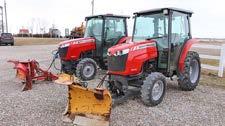
Ferguson 1643 MFWD’s with cab & blades; JD 5205 with loader; JD 3140; JD 2355 with 175 loader; 2 - JD 2120’s; 3- JD 1830’s with loaders; Ford TW35 MFWD – 200 hrs on rebuild; Ford 4100 with loader; Ford 3000 gas; Versatile 555 4wd – 3504hrs; Case 4690 4WD with 12’ blade – 5000hrs; Case 2470 MFWD – 5227hrs; Case IH
2294 -6950 hrs; Case 1594 -4200hrs; Belarus 5160; MF 65 diesel; Massey Harris
20 & 22 tractors; Farmall 504; Farmall 400; Farmall 200; 4 - Farmall 140’s one with mower, cultivators & side dressers, one with Woods mower; 4 - Farmall Super C’s; Ferguson TE20; Allis Chalmers WC; Ford 8N;
COMBINES & HEADS: John Deere 9500 combine – 2905/4007hrs; JD 693 6R corn head; JD 925 flex head; Gleaner R6 4WD -2000hrs; Gleaner 24’ flex head; JD 7720 4WD combine; Case IH 1660 4wd combine; Massey Ferguson 550 combine, 4R corn & 16’ flex heads; Gleaner 8R hugger head; Shelbourne Reynolds 24’ grain head; New Holland 971 pick up head; Horst header wagon; AWS 2010R air reel; 22’ header cart.
SELF PROPELLED SPRAYERS: Case IH SPX 4260 sprayer – 1200 gal., 90’ boom


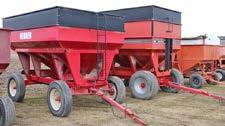
– 6255hrs; Powell 4350 self-propelled sprayer – 734 hours;
INDUSTRIAL & SKIDSTEERS: John Deere 310 backhoe; Case CK680 backhoe; Gehl 5240 skid stter -3325hrs; New Holland L218 skid steer; Genie 1056 telehandler; Genie Z45/22 4wd lift – 2158hrs; Walco skid steer forks; grapple bucket; indoor electric forklift; Allis Chalmers 7000lb gas forklift; JD #10 backhoe attachment;
TILLAGE: Sunflower 5135 42’ cultivator; Salford 18’ & 24’ cultivator; Brent 9 shank ripper; 2 - RJ 32’ X fold packers; DMI 24’ crumbler; Case IH 3950 34’ disc;
Kongskilde 16’ & 18’ S tine cultivator; Bervac 22’ cultivator; IH 45 5 shank V ripper; JD 960 18’; John Deere 220 18’ disc; JD 12’ & 18’ discs; JD 2800 6F plow; IH 720

4F plow; IH 710 5F plow; Overuum 4F 16” plow; White 253 disc; Kongskilde 6R cultivator; IH 18’ disc; IH 18’ vibra shank; 8’,10’, 2-12’, 13’ & 15’ 3PTH cultivators; family of 18’ packers; 16 row row crop cultivator; JD 2 prong subsoiler; JD 4F 14” plow; MH 3F match plow; IH 3F plow; MF 3F plow; Case IH 8R row crop; Yetter 3415 rotary hoe; 6’ 3PTH disc; JD 30’ rotary hoe; Brillion 15’ cultipacker; IH 3F semi mount plow; Wilrich 3F semi mount; Turnco 12’ packer; 2- 25’ tool bars;

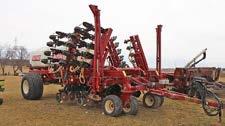
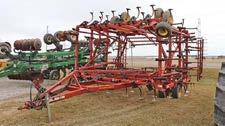
PLANTING: John Deere 1780 6/11 vacuum planter – liquid fertilizer; JD 7200
Conversation Till 6R 30” – liquid fertilizer; White 6100 6R 30”; Salford 22.5’
twin tank air seeder; Sunflower 9411 15’ grain drill; Great Plains 1520 15’ no till drill; JD 7000 4R 30” planter; JD 8250 18 run drill; Case IH 5100 21 run drill;
International Cylco 900 planter; IH Cylco 800 7R 23”; IH 56 4 row; MF #33 17 run drill; McCormick drill; JD #71 7 row planter; JD #71 planter units; 12 – White 8000 planter units; JD lift assist; TillTech 12.5’ tool caddy with 20 coulters & hydraulic lift; modified Kinze 30’ planter frame – used to transplanting; 12 unused White insecticide boxes;

HAY & FORAGE EQUIPMENT: Miller Pro 310 Avalanche 30’ merger; Majaco 480 bale wrapper; New Holland BB940A large square baler – 50,000 bales; John Deere 446 round baler; Case IH 8455 round baler; New Holland 654 round baler; 3NH 310 balers; NH 273 & 276 balers; NH 487 haybine; NH 166 inverter; Bauman
5910 tedder/fluffer; Deutz hay tedder; NH 56 rake; New Idea 403 rake; JD 14’ flail mower; Dion N10L tandem forage wagon; 2 – MF 116 tandem forage wagons; MH hay mower; 3 -20’ bale thrower wagons; Horst 20’ flat rack & wagon; round bale wagon; Gehl 860 forage wagon – modified;
GRAIN HANDLING: GT tandem side dump cart; Richardton 800 side dump cart; Market 400bu wagon; Ficklin 400bu wagon; Gerber 300bu wagon; gravity box with JD gear; Turnco 250bu wagon; 200bu. gravity wagon; 400bu gravity box & wagon with auger; Turnco 300bu wagon; 2 – gravity wagons; 2 gravity boxes on running gear; Convey All seed tender on wagon; Brandt 862 Turbo auger; Westfield TFX10-
51 auger; Westfield 8”x30’ auger; Westfield 8”x71’ auger; 30’ elevator; Little Giant
25’ elevator; 16’ elevator; Westfield 6”x16’ auger; Geo. White 32’ elevator; Clipper

167D seed cleaner;
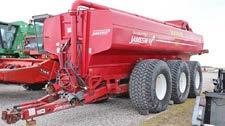

FARM EQUIPMENT: Jamesway 7400 gallon tri axle manure tanker; Husky 5000 gallon manure tanker; Husky 10’ manure pump; Hardi TL500 – 45’ sprayer; Bailey 600 gallon 60’ sprayer; Gregson 750 – 60’ sprayer; Hardi TR500 sprayer – no boom; Precision 1900L 32’ sprayer; New Holland 212 manure spreader; New Idea
manure spreader; 8’ electric manure pump; Farm King 550 13’ batwing mower;
Agriease BE-PFS500G fertilizer spreader; 10’ fertilizer/seed drop spreader; Dalton 4 shank anhydrous applicator; 2 wheel pull type ditcher; 7 row 28% applicator; Wifo
3PTH forklift; Old Dominion 7’ brush sweeper; 5’ rotary mower; 7’ Alo bucket; HLA
48 & 66” buckets; 3PTH 100 gallon sprayer; JD A20 mounted cultivators; Quicke
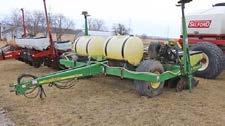
760 loader; Allis Chalmers 60” rotary cutter; several 3 PTH blades; Bogballe 225 fertilizer spreader; Freeman loader with PTO pump; 3PTH forklifts; 3PTH skidding winch; New Idea 621 forage blower; Terragator 1803 chassis; 2 - wagon & flat racks; 2 – Martin running gears; 3-wagon running gear; water wagon with 1500 & 500 gallon tanks & pump;
IRRIGATION, TOBACCO & VEGETABLE: Powell 4350 self-propelled sprayer – 734 hours; Cadman 3250 traveler; Bauer RainStar E2 traveler; Cadman 4000 irrigation traveler; older Bauer irrigation traveler; 110 – Wade Rain 6”x30’ pipe; 77 – Wade Rain 5”x30’ pipe; 85 – Wade Rain 5”x30’ pipe; 68 – Wade Rain 4”x30’ pipe; large qty of 4”,5”&6” Wade rain couplers & fittings; assorted Wade Rain sprinklers; 54Anderson Miller 5”x30’ pipe; 30- Delhi Foundry 5”x30’ pipe; 54 - McDowell 5”x30’ pipe; 40- 2” pipe; Anderson Miller 4”x30’ pipe; 2- Caprari, Rovatti & DF PTO pumps; 2 – 2015 Smart Turner PTO pumps; 2 – CMC pto pumps; Ford/Meyers irrigation unit; 2019 Cheechi Magli Wolf Pro 4 row transplanter; DeCloet/Balthes diesel hi boy; 2 – Casier 16’ flat wagons; Bell & Gossett pump; irrigation guns; Perfect 13’ orchard mower; 14’ melon sizer; 2 – vegetable packer/baggers; Hill Agra Sale
PTGH-300 garlic/onion harvester; Struijk 4 row 30” carrot bedding hiller; Ackerman 6 row 30” carrot bedding hiller; RVL pull type 1 row carrot harvester; high moisture cooler unit; 2 – vegetable drum washers; plastic & Styrofoam plant trays; 4’x8’ skids; vermiculite spreader; muck bed seeder; greenhouse clipper; Kelly MFG 4 row side dresser; DF 2 row side dresser; 362 Asparagus boxes; 2 – Asparagus picking aids; 5 bin orchard trailer; National pickle grader; 3 man asparagus rider; Powell 3PTH mechanical transplanter; John Blue side dresser; electric baling press & boxes; 4 – 30’ flat bed trailers; 4 – 22’ flat bed trailers;
LIVESTOCK & FEEDING EQUIPMENT: Supreme 400 feed mixer c/w scales; New Holland 353 mix mill; Gehl 95 & 60 mix mills; Wopa hoof trimming chute; 40 –
Stanfield 2’x4’ heating pads; calf puller; mineral feeder; qty of gates; 3 ton feed tank; Berg stable cleaner; cattle squeeze; Suevia power cow brush; 7 stainless steel hog feeders; 2 farrowing crates; 1 ton feed bin; Walinga 18 Ton 3 compartment feed tank box; 1100’ of Big Dutchman chicken feeders;
TRUCKS: 2018 Dodge 1500 truck; 2007 GMC 1500; 2000 GMC 1500; 2006 Jeep; Ford F350; 2005 Mazda B3000 pick up; 2018 8’ truck topper -fits GM; 8’
SpaceKap; 8’ hard tonneau cover -GM;
TRAILERS: 2016 Trail King 20’ flat bed; 2013 Trout River live bottom trailer; 2013 Canada Trailers 7’x18’ tandem flat bed; 1997 Jamco 20’ aluminum livestock trailer; 1986 Titan 5 axle hopper bottom trailer; 16’ utility; 41’ tandem flat bed; Miska 16’ tandem flat bed; 24’ flat bed; 2 small landscape trailers.
SNOW EQUIPMENT: HLA 3000 snowblade with wings; Lucknow 8.5’ snowblower; JD 7’ snowblower; McKee 68” d/a snowblower; Wifo WBH66 snowblower; McKee 5’ snowblower; Yanmar SB51 snowblower;
LAWN & GARDEN: John Deere Z363R 48” – as new; New Holland MC28 –1594hrs; Kubota F2100 60” mower; JD D110, LT 180, L110 & 165 lawn mowers; Toro diesel reel mower; Cub Cadet with cab, blade & deck; Ford LT75 mower; Super Pack 320 self propelled lawn mower; Douglas 6’ finishing mower; 48” finishing mower; Woods 59” finishing mower; JD 60” sweeper; 72” finishing mower; Husvarna DRT900 tiller; 3’ chain harrow; Hardi estate sprayer; Kubota RCK-F30 60” deck;
RECREATION: 1995 Honda 400 ATV; DUALS & TIRES: 18.4x38 duals; 20.8x38 duals; 2 – 28L26 tires; 520/70R34 tires & rims; pair of 16.9x24 tires & rims; pair of 18.4x26 tires and rims; 2- 20.8x42 tires; 14.9x28 duals; 16.9x28 duals; Michelin 480/80R42 duals; several implement tires & rims;
OTHER: 2020 Wallenstein log wagon with winch & hoe; Bellford 20’ hydraulic wood elevator; Doosan 180KW diesel genset; Perkins 60 KW diesel genset; Stanford
8.8KW genset; Lincoln Ranger #8 genset/welder; MH walking plow; MH Type 1 hit and miss engine; 4- 1000L caged totes; Kubota diesel 4 cylinder engines; Winpower 4000 genset; 500’ of 3” perforated tile; Honda GX 120 transfer pump; Generac PTO generator; Hotsy power washer; Sandblast cabinet; Winco 50KW PTO generator; JD quick hitch; Winpower 30/50 PTO generator; Hitachi 14CFM air compressor; Enterpak 25 ton hydraulic cylinder with pump; Sanpiper diaphragm pump; Honda 8HP engine; 70’ of warehouse racking; 6’ steel container; large qty of new sheet steel; used 20’ steel container; NEW EQUIPMENT, TOOL CHEST & TIRES: assorted 3PTH & skid steer attachments; shop equipment; utility trailers; 72” stainless steel tool chest; new tires for skid steers, farm implements transport & passenger truck; used 20’ steel container.
VIEWING: All items will be in our yard for viewing APRIL 4th to 7th.
TERMS: All payments to be made by APRIL 12TH at 5pm. Payment can be made at the Shackelton Auction Centre
Ben and Mary Penner had hoped to already be in their new De Vida Garden centre site, on the east side of Plank Road north of Straffordville, would be ready for this year’s season, but delays mean they’ll continue to operate from their current site south of that hamlet during 2022.
However, with zoning issues solved and a site plan agreement for redevelopment pending with the Municipality of Bayham, they plan to start work later this year on their new property, which also is their new home, and they expect to be ready to receive customers there starting in the spring of 2023.
Both Ben and Mary grew up in the area, and are celebrating their 37 wedding anniversary in April.
They started their garden centre business 12 years ago, on land leased from farmer Dan Froese.

They praised Mr. Froese for being willing to extend their lease there for one more year when they realized they couldn’t move to their new site in time for 2022.













The leased land was also a former nursery and garden centre owned by Ziggy and Margaret Blondeel, but it had been closed for several years before the Peters’ opened there.
Ben said he’s been in horticulture for 30-odd years, starting with a summer job with the Blondeels.
He later joined Murray Alward as the first employees for Riverbend Farms, a horticultural operation east of Aylmer, and spent 20 years there.
Ben said most of what he knew about horticulture had been learned from Murray.
He worked in the rental department of a John Deere dealership in Courtland, and then he and Mary started a nursery in Tillsonburg with partners.
Mary admitted she’d had no previous background in horticulture before they took on their own business.
“You do now,” Ben chuckled.
“I kind of got thrown into it,” Mary agreed. She hadn’t even considered herself the kind of “people person” who would deal easily with strangers, but she has gotten better.
They were involved in the Tillsonburg nursery from the autumn of 2004 to 2008, when they struck out on their own.

Ben said the opportunity came along in 2010 to lease the former Blondeels’ property. “It was a perfect time we did it, too.”
Dan Froese had purchased the land, and the Peters’ leased it, starting from scratch
with their own stock.


Fortunately, Ben said, he had lots of connections with nursery suppliers from his past experience. “I just made a few calls and they made it happen.”
Despite that, “It was nerve-wracking,” he added. They opened their business during the waning days of a great economic recession.

At the beginning, Mary allowed, they were wondering if any customers would come in, since the Blondeels’ nursery had
been closed for several years. Ben said the leased property needed a lot of cleaning up, and they bought first one greenhouse and then another so they could begin growing some of their own plants, in addition to what they purchased from wholesalers.
As they began, they still kept part-time jobs on the side, Ben in horticulture and
Mary in bookkeeping, to supplement their income.
Mary was the one to christen their garden centre with the name “De Vida.” They’d been throwing around names like Living Gardens and Paradise Gardens, but those were already taken.
That was when she thought of “De Vida,” which in Spanish means “Of Life.” “You wouldn’t believe how many people asked how we came up with that name. And they liked it, too.”
Ben said they’ve increased their greenhouse growing capacity steadily through the last 12 years, but everything they sold was in containers, not from fields. They just didn’t have the space, with only three acres of leased land, but they hoped to expand their in-house
After watching our gardens flourish this season and as autumn approaches, it’s time to start preparing for the next bloom. In other words: It’s bulb season. To successfully ensure a beautiful spring yard, here are five tips you should follow this fall.
Prepare the bed
Preparing a bed for your bulbs isn’t as simple as planting a bulb in a hole. The bed needs to be meticulously prepared — you should remove weeds, loosen the soil, add compost for nutrients and make sure the soil is well-drained to avoid the possibility of rot. Poor soil conditions are often reflected by a weak bloom come spring.
Choose the right bulbs
While many bulbs are planted in the fall, there are some exceptions. For example, plants like daffodils and tulips are better suited for the late summer, while dahlias should be planted in the spring. When planting in the fall, make sure you’re choosing bulbs that are meant to bloom in the spring.
Ditch the fertilizer
After you’ve planted your bulbs of choice they stay dormant until the blooming season. For this reason, there’s no need to fertilize the soil and waste nutrients in the process. Instead, wait until you see the first signs of a bloom and then add fertilizer to supplement root growth.
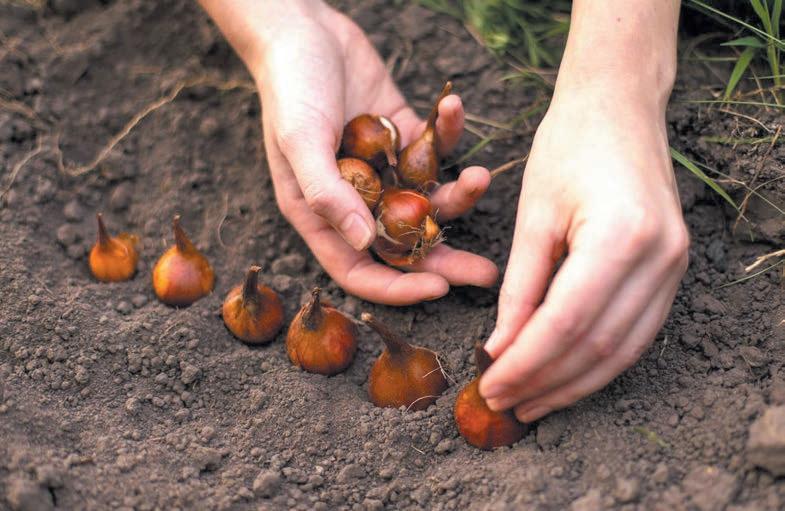
Choose the right spot to plant
Some bulbs require full sun — at least six hours of direct sunlight per day — while others need shady environments or partial sunlight. It’s important to read the directions to ensure you’ve planted your bulbs in the ideal location.
Timing is everything
Warmer climates may trick your bulbs into blooming in the fall instead of the spring, which makes timing your planting of utmost importance. Spring bulbs require a colder temperature to bloom — an optimal time to plant is around six weeks prior to when you expect the ground to freeze or when nightly temperatures hover around five to 10 C.
-Landscape Ontario
It’s important to read the directions to ensure you’ve planted your bulbs in the ideal location. (Landscape Ontario)
The people’s excitement, I will never forget it
Mindy Giesbrecht, a seasonal worker at De Vida Gardens in Bayham last summer, held a particularly colourful canna lily on sale there, for transplanting into home gardens. The business sells potted plants and seeds ranging from fruit and shade trees to perennial and annual flowers to seeds for both decorative and vegetable plants. (AE/Rob Perry)
offerings starting next year on their new site, which had plenty in the way of land.
Ben said they hoped they could even produce enough to increase the wholesaling of their own plants to contractors.
Their garden centre offered a wide range of plants. “I don’t know how many kinds of perennials we sell,” along with annuals, flowering shrubs, evergreens, shade trees, berry bushes, fruit trees, and hanging
baskets.
The biggest sellers among flowering plants were petunias, begonias, impatiens and dipladenias, the last a tropical plant.
They also grew their own vegetable plants ready to be transplanted into home gardens, the most popular being 15 different varieties of peppers.
They had customers come from as far as Chatham, Leamington and Kitchener for pepper plants.
Tomatoes and cucumbers were also popular in transplantready form, and the garden centre sold a wide selection of seeds for all sorts of garden plants and herbs.
They’d started out with themselves as the only two employees, but now hire up to five seasonal workers part-time.
Ben said he could use a couple of workers right now.
“It’s hard to find them. There’s so much work out there.”
Their new site, north of Straffordville, has 30.5 acres of land, 25 of it workable, mostly on sandy loam soil. They’d purchased it on Dec. 3, 2020. They rented out most of their fields to other farmers for now, but as they get set for their garden centre opening next year, they hoped to start planting some of those so they’d have more of their own stock, rather than relying on suppliers.
They also had pasture land
Winter rain and snow melt wash away manure on frozen ground. Nutrient run-off helps pollute the water, kill fish and promote algae growth. Manure is valuable and those are dollars wasted when it’s washed away. Winter spreading doesn’t stop compaction.

for Black Angus cattle, and some woods. With their site plan agreement with Bayham nearing completion, they hoped to break ground later this spring for a new gift shop, installing a greenhouse purchased from Aylmer Garden Centre when it closed, and moving in six other greenhouses they already owned. They’ll also have room to increase bulk mulch sales to
landscaping contractors. Ben has a small Bobcat excavator he can use to load two dump trucks, and also takes on outside construction work, such as digging holes for foundations to be laid and helping with driveway installations. Coping with the pandemic over the last two years, and the complications it brought to doing business had been difficult at times, but overall good for their business.
With travel discouraged, “stay-cations” involving pursuits such as planting home gardens had become more popular, Ben said.
Mary recalled that early in 2020, most businesses had been locked down to deter the spread of the virus, but De Vida Gardens and similar businesses were finally allowed to open on May 8.
“The people’s excitement, I will never forget it,” she said. Customers were glad just to be able to do something outside their homes.
Ben said Landscape Ontario had lobbied hard to allow garden centres and nurseries to re-open. In return, it promised businesses would follow public health rules. He believed for many people, being able to work in their backyard centres had been good for their mental health.
The pandemic, Mary agreed, took an emotional toll, but they’d had no issues with customers when it came to pandemic rules.
For a while they had to limit how many came inside their current gift shop to pay for
items, but everyone had been patient, and the process had worked more smoothly than she had worried it might.
“We love our customers!” she declared.
Their season was just starting now, Ben said. Their garden centre usually opened the second or third week every March, and then went through until Christmas.
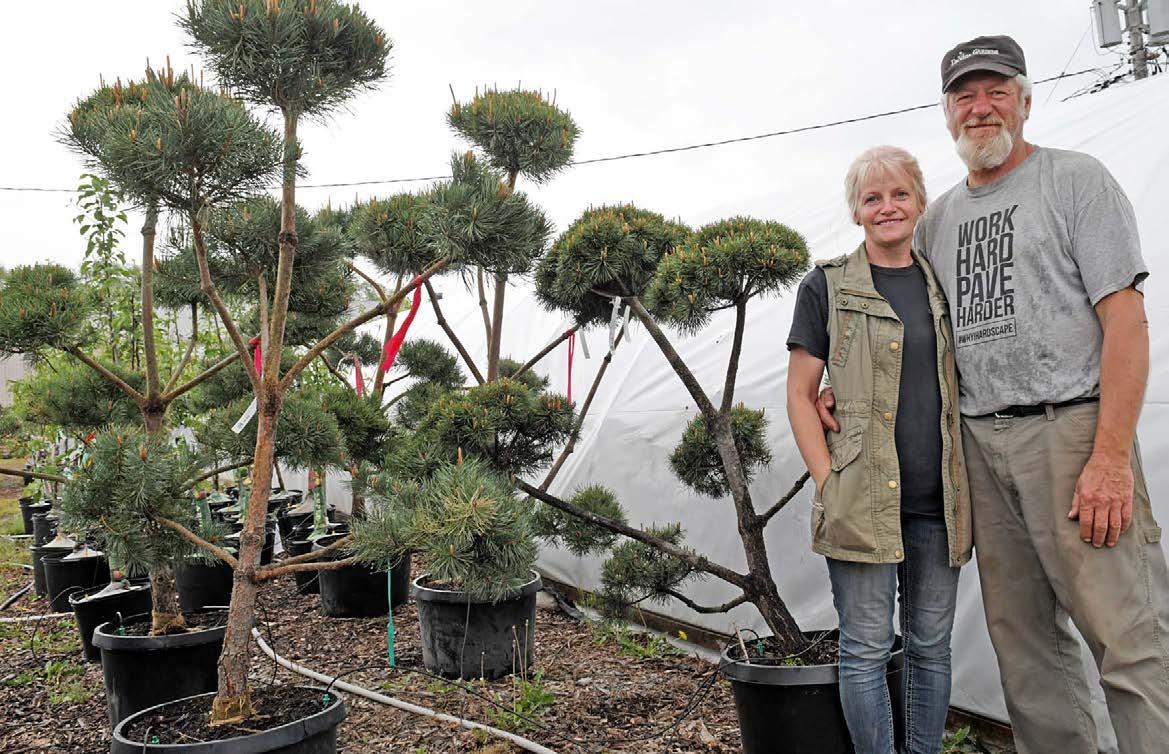
Mary ventured they might even go past Christmas this year, but Ben replied flatly, “We’re going to be closed for January and February.”
Elgin Historical Show
Kettle Valley Pioneers
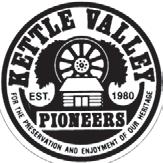
Sat. & Sun. August 13 & 14, 2022
Fri., August 12 – Beef BBQ
Dan Patterson Conservation Area 44014 Mapleton Line, St Thomas For more info, call Harley 519-269-3977
Know how much manure storage you have. Be prepared in case fall spreading isn’t possible.

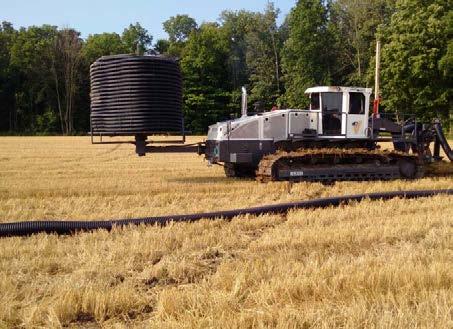
Cover or expand your existing manure storage. Temporary in-field storage can be a solution for solid manure.
Add winter wheat or cover crops to your rotation for extra manure spreading opportunities throughout the year.

For more information: Timing Matters 519 837 1326
www.FarmFoodCareON.org/Timing-Matters

I just made a few calls and they made it happen.Mary and Ben Penner, standing in front of scotch “pom-pom” topiary trees, first opened De Vida Gardens on three acres of leased land on Plank Road south of Straffordville 12 years ago. They’ll do business there again this year but hope by next spring to open their new, larger garden centre north of Straffordville. (AE/Rob Perry)
While farmer’s ideally make hay while the sun shines, they know that’s not always the case, sometimes needing to be in the barn or field in less-than-ideal or even miserable weather. On other days, something goes wrong with a tire on their equipment. And every now and then both of these things happen on the same day.
Situations like this are just one instance where Aylmer Tirecraft’s 24-hour emergency in-field farm tire service is able to solve a problem and let the farmer get back to work. And they do whatever is

necessary to get the job done.
“We’ve had to have the service truck towed out to the tractor and then towed back out of the field,” said Vice-President Janna Summers, “because they’re big heavy trucks. They just sink.”
Shop Manager Greg Thompson added, “And whether you have four-wheel drive or not, it doesn’t matter.”
Janna and Greg, who co-own Aylmer Tirecraft with third partner and shop manager Daryl Smith, recently sat down for an interview with Aylmer Express to discuss the agricultural side of the business.
Greg has been there since
2010, and for Janna, it has been fulltime for 16 or 17 years, but before that parttime, and less formally “since the day I was born.”
The business has been in the stewardship of the Summers family since 1977, when Lyle and Marie Summers bought it. Their son Mike and his wife Lynn Summers then purchased it in 1996 after Lyle’s sudden death. And just over 20 years later in 2018, Mike and Lynn’s daughter Janna purchased the business in co-ownership with Greg and Daryl.
The Talbot Street East business offers tire and wheel sales, repair and installation
on standard vehicles, as well as auto repair, commercial and agricultural services. The latter is 25% of Aylmer Tirecraft’s business. Their farm services are much more than mobile repairs, as they also sell, install and adjust tires for agricultural equipment.
Busy when the farmers are Business has about 15 on staff though that number fluctuates, expanding to 18 in the busy spring and fall seasons, and down to around 12 when things quiet down in the summer.
The busy season for agricultural tires tends to align with the rest of the business, with spring planting and fall harvest coming at similar times to seasonal tire changes.
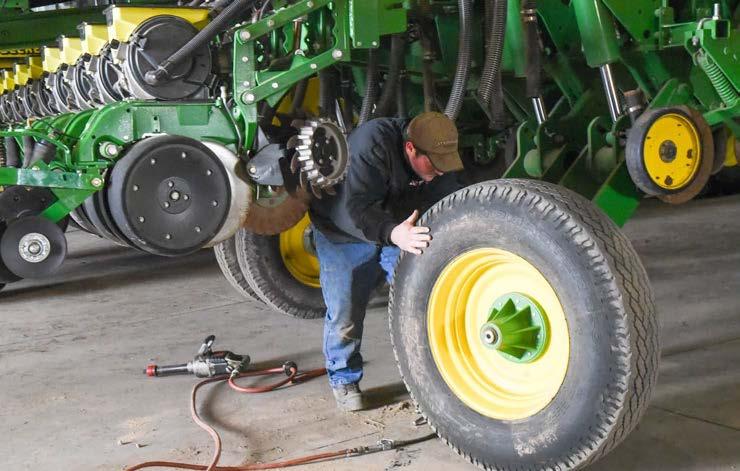
There are some customers who buy farm machinery tires in the winter, both planning for the coming season and to take advantage of tax breaks.
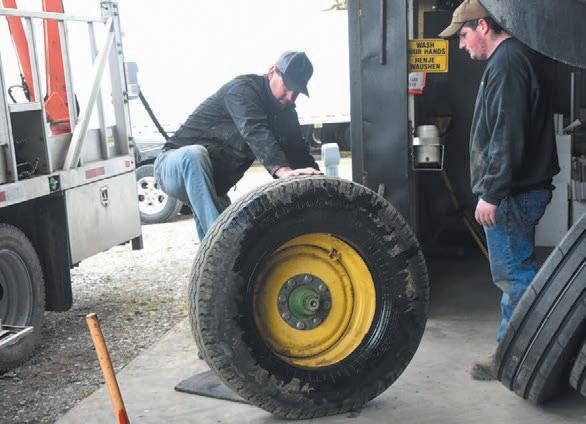
They observed that farmers often had the best intentions for ‘pre-maintenance’ and hoped to get work done before a small problem became an in-field emergency, but there are so many other pressing costs that sometimes the preventative work had to be pushed down
the list. When spring comes around and equipment checks are done prior to planting, Greg said customers will “go to the barn and they’ll find 10 flats on stuff that they put away. All of a sudden they need to bring it in.” They also had noticed in recent years that, as crops were becoming more diverse in the region, those busy seasons for farm equipment, and thus Aylmer Tirecraft, were getting longer. There are now early and late planting and harvests, and as an example they said cucumbers were being done in two sessions. But high growing season in July “ is usually pretty quiet,” said Janna.
Aylmer Tirecraft offers both on-site and off-site service for their agricultural customers, and Janna said it was about an even split between doing the
work at their Talbot Street East location or sending the service truck out to the farms.
“We do have guys on call 24 hours that will go out into the middle of a field and get a tractor out of hairy spot,” said Greg.
The mobile service and repair team is sent with all the required equipment, tools and team (usually of two).
Janna said harvest time was when they made the most emergency calls, with tire failures on tractors, combines or even trailers on their way to dryers and storage with a full load.
Agricultural tires required proper installation and setup to ensure they were best serving the farmer for the required work.
“One thing with tractors is that we set them up. Different
crops require different row widths, so the tires have to be adjusted. We move them around to match those needs so that they can run up and down the rows correctly,” Janna explained.
Greg said, as an example, “If they plant corn, it’s at 33 inches. They have a tractor that they just used for a different crop. We would spread out or move in the tires to fit between
We do have guys on call 24 hours that will go out into the middle of a field and get a tractor out of hairy spot
the rows of plants.”
Air pressure was also important to get right with agricultural tires.
Janna said, “Air pressure, even in a regular tractor, can vary greatly. It depends on what the tractor’s doing, how much weight it is pulling, or the soil condition. Air pressures play a big role.”
A more recent innovation in agricultural tires is IF (increased flexion) and VF (very high flexion) options, which can run at much lower pressure than standard tires.
“It gives it a bigger squat,”
Greg said. “You get more flotation, but it doesn’t wreck the tire because they’ve made the side wall float enough to take that.”
As an example, he said a normal 38-inch agricultural tire would run at 15 to 16 pounds (per square inch). If you used a VF tire in that same application, it would run about 8 to 9 pounds.
Reducing tire pressure means that the pressure on the ground decreases as well, resulting in less compaction, which allows the soil to retain more moisture and increase yield. But this specialization comes at a cost, sometimes double or more of the standard.
Greg had read reports comparing IF and VF tires, “They do get better yields. It’s proven.”
With larger operations the increase in yield can offset the higher price of the tires, he said. “If you’re super big, then it’s worth it.”
When asked for the cost of a ‘standard’ agricultural tire, Greg said $2,800 would be average price for a single 520/85R38.
Janna added, “and these tractors all have eight or more tires on them anymore.”
Greg cautioned, “But prices could soar well above that for specialty tires.”
A tractor the business worked on a couple weeks ago received eight tires and it was $40,000, plus labour.

And that was today’s price. “Just imagine April 1. Add 14% to that,” said Greg. They’d been receiving jumps on pricing from manufacturers steadily since early 2021.
Previously they’d
quote for farm or other customers and put a 30-day guarantee on the price, but they could no longer do that in the volatile pricing market.
They also acknowledged that the tires were just a ‘small cost’ of doing business on a farm.
“We’re just talking tires. That’s not the cost of the machine. It takes a lot of money to go through a field.”

As with cost increases, Aylmer Tirecraft was also experiencing delays in the supply chain, and hoping that orders placed in the fall might start arriving soon.

Greg said, “We ordered a couple trailer loads. We should have had them by now.”
It was October when they placed the order, Janna said, and “when we ordered them, delivery was supposed to be mid- February to mid-March. And I think we’ll be lucky if we see them by the end of April.”
In addition to rising prices, the unpredictable supply chain, and service calls in adverse conditions, other challenges include having to make repairs at odd hours or in the dark, though that’s the nature of being on-call.
Another thing they noted was that with farm size growing, so does the machinery, and the tires on those machines, and then the challenge for them are associated tools getting larger too.
Greg said, “Equipment is getting bigger for sure.”
“And the equipment’s equipment, our tools, aren’t always keeping up,” added Janna. “We try to keep the most up to date equipment to be able to help our guys do the work. But sometimes the tools they need haven’t even been made yet.”
Greg references a floater sprayer tire, saying they can be seven or eight feet tall, and six feet wide.
But for Aylmer Tirecraft, those challenges are worth the time, effort and costs it takes to overcome so they can continue to provide top-quality service.

Greg said the greatest reward is seeing a return customer. “The farmers coming back. That’s what we thrive on.”
“We want to keep customers happy,” Janna agreed, especially farmers. “Farmers are a big industry in this area, and they bring a lot to us and to our community.”
“And not just our community, they feed a lot of people. They feed the world,” Greg added.
Four new 900/60R32 super flexion tires were installed on a fertilizer spreader. Aylmer Tirecraft noted that this type of tire was developed specifically for use on highhorsepower tractors. “Flexible ultra-strong sidewalls

at 100 PSI. An IF tire will carry same 10,000 lbs. as standard tire, at approximately 20% less air pressure or 80 PSI. A VF tire will carry same 10,000 lbs. as standard tire, at approximately 40% less air pressure or 60 PSI. Keeping in mind PSI is pounds per square inch being transmitted thru tire to the ground, the pressure reduction is dramatic. So, why can an IF or VF tire carry same load with less air pressure? Highly technical sidewalls are

Support Businesses that support your community!











Phone: 519-765-3333
designed to carry some of the load, whereas standard radial tires carry entire load with air pressure. Another benefit of running IF VF tires is a larger footprint. Imagine what your car tire would look like if you took air pressure down 40% from 35 psi to 21 psi – the contact patch or footprint would grow dramatically. What’s bad for car tires (low air pressure) is good for Ag tires.
A Larger footprint created from lower air pressures also provides: better traction with more pulling lugs on the ground; reduced fuel consumption with less slip and better flotation with larger contact patch.
Note, all air pressure settings should be confirmed by professionals who have assessed weight of tractor, implement and application.
One thing with tractors is that different crops require different row widths, so the tires have to be adjusted accordingly. We move them around to match those needs so that they can run up and down the rows correctly
make a claim.
byRob Perry of The Aylmer Express Ontario Agriculture Minister Lisa Thompson revealed during an online Elgin Federation of Agriculture “roundtable” on Thursday, March 31, that provincial mental health therapy sessions for farmers and their families, limited to four free sessions, were about to become unlimited.
“This is breaking news,” she told participants. Originally, the program, introduced in cooperation with the Ontario Federation of Agriculture, made mental health supports available around the clock to farmers that and their families, but to a limit of four sessions, she said. Given everything going on in the world today, “How can we cap it at four sessions?”
So, as of later that same day, “It’s going to be unlimited,” she announced. “Whatever they need, we’re going to put it out there.”
The round table involved about 30 participants, including local leaders of farm commodity groups, Minister Thompson, Elgin-Middlesex-London MP Karen Vecchio and several Elgin County council members led by Warden Mary French, mayor of Aylmer.
EFA President Melissa Schneider welcomed everyone to the event, noting that online sessions were not ideal, “but it is the easiest way.”
She expected to hear from commodity groups about issues such as farm labour shortages, disruptions to agricultural supply changes and how environmental changes were affect-
ing them. The sort of challenges faced by farmers showed how resilient they were, she added. The session was moderated by Donna Lunn.
The first speaker was Allen Taylor, on behalf of District 5, Grain Farmers of Ontario. He led of with carbon tax pricing affecting fuel costs for farmers, especially when it came to drying their crops. The federal government had promised rebates for farmers, but they were only receiving 15-20% of the extra they had paid. Carbon tax was going to go up by 25% on Friday, April 1, “essentially wiping out our long-term effort” to make some
money. The Russian invasion of Ukraine had also led to “an increasingly volatile global commodities market,” and historically high production costs, given sanctions imposed on Russia that included a 35% tariff on fertilizer from that country.
Mr. Taylor noted that 25% of the fertilizer used in Canada came from Russia.
The crop production lost in Ukraine due to Russia’s illegal occupation would also reverberate through the entire supply chain for agriculture, he predicted, and further reduce the availability of fertilizer.
Among other dire consequences that would result was the prediction of famine in Africa within 18 months, he added.
Eric Johnson of the Elgin Beef Growers was concerned about the trucking costs to bring cattle from Western Canada to Ontario, which had almost doubled.
The beef industry continued to decline in Ontario, and the province was relying more on western provinces for meat, he continued.
High land costs and rising interest rates made it tough for young farmers to get started, especially in recent years, he said. They had to compete with other commodity groups for land as it became available.
The biggest problem facing beef producers was a shortage of processing capacity for cattle.
“It holds up our industry a lot,” and farmers had to pay out extra money to feed cattle before they could be processed, and some were even being docked for bringing overweight cattle to processors.
Beef Farmers of Ontario were currently pushing the need for mental health supports for farmers, who more than ever were coming forward with mental health issues, Mr. Johnson said.
Kevin Howe, on behalf of Elgin County’s fresh fruit and vegetable growers, said the biggest concern he had for the coming season was cost increases for fertilizer, packaging and freight.
He’d be spending $350 more per acre for fertilizer used on watermelon fields this year, he cited as an example, and packaging prices were up 20-60%.

The extra cost for shipping had yet to be determined, he said. But that week, he had seen strawberries from Mexico for sale in a local grocery store for $1.68 a pound.

His cost just for producing strawberries was $1.20 to $1.35, he said. “There’s no question, it’s dumping,” he declared, and Canada had no mechanisms to protect fresh fruit and vegetable growers from that.
“We’ll be that much more vulnerable” in the coming year, he expected.
Labour was always an issue for growers, but coming into the third year of the COVID19 pandemic, if farmers couldn’t match their crop strategy to their labour supply, “You probably shouldn’t be farming in the first place,” he stated.
He saw that crop insurance would again this year allow a lack of labour as a reason to
He expected that would cause some farmers to grow more acres than they could necessarily harvest and sell, depressing prices for fresh vegetables and fruits.
Pork producers
Eric Hartemink of Elgin Pork Producers had some trouble with his Internet connection, garbling some of his report, but he provided a written copy later:
The pork industry has had some hiccups in the last couple of years, mainly processing space. The Quebec Olymel plant has reduced its Ontario intake of hogs due to COVID regulations.
There has been some help from the provincial and federal governments to help address the processing shortfall, which is much appreciated. Some hogs are now being shipped as far away as Alberta for processing, and many more take a seven-hour drive to the (United) States.
PED, the very fatal disease in young piglets, is resurfacing in a few places. Commodity (input) prices, including fertilizer, are eating into producer profits.
There is a continual reduction of producers in the county, with only 27 left. The sow herd has been declining in the States as well as Canada. There are very few new barns being built due to the uncertainty of processing and markets.
On the upside, the prices received for hogs are among the highest in many years.
Dan Froese, on behalf of the Ontario Processing Vegetable Growers, said negotiations for almost all crops had been completed except for field cucumbers.
Prices were up 20-30% this year, and “We thought we did good, and that we might actually make a little more money as farmers this year,” he said, but that had been before the 35% tariff on fertilizer from Russia.
The situation did raise the need for domestic fertilizer production, he added.



Otherwise, he said, the main concern for his sector was “labour, labour, labour.”
Getting Canadians to work in fields was difficult, so farmers had to resort to offshore labourers. “It works. (But) It is very expensive.”
Some agencies changed rules and regulations on what seemed a weekly basis, making taking advantage of offshore labour that much more difficult, Mr. Froese said.
Given the rising costs of production and hence the increasing prices charged for food, if someone was making $15 to $20 an hour, “How long will they be able to afford a bag of frozen vegetables, let alone fresh?”
long will they be able to afford a bag of frozen vegetables, let alone fresh?
Jonathan Giret, representing the Chicken Farmers of Ontario, said Elgin had 42 family-run farms producing $16.5-million worth of chicken meat each year.
The chicken industry was strong and vibrant and continuing to grow, he said, and contributed $3.2-annnually to Ontario’s economy.
The CFO was conducting research intended to support Ontario farmers, as well as the province’s growth and competitiveness in the chicken market, he continued.
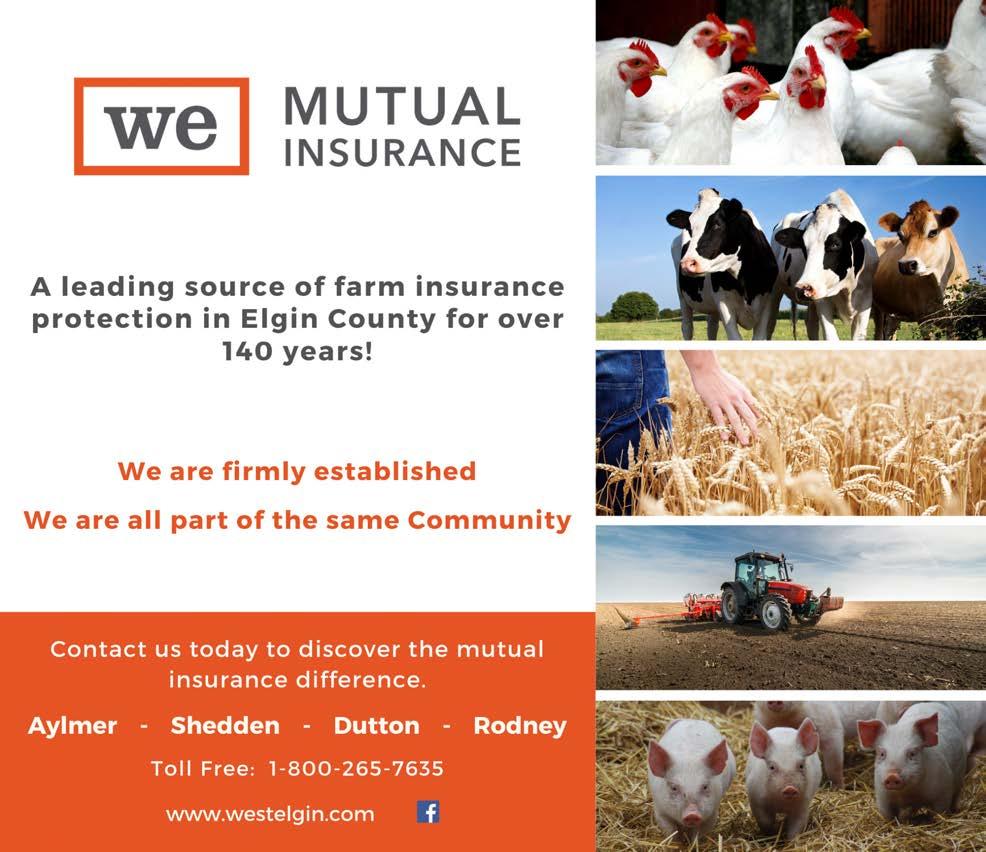


He worried that foreign producers had access to at least 10.8% of the Canadian market. That was equivalent in Ontario to 320 jobs and $220-million a year lost to the provincial economy.
In future trade deals, he said, no such access should be provided.
Mr. Giret said cases of avian flu were starting to pop up in some herds, so all chicken farmers had increased their biosecurity measures.

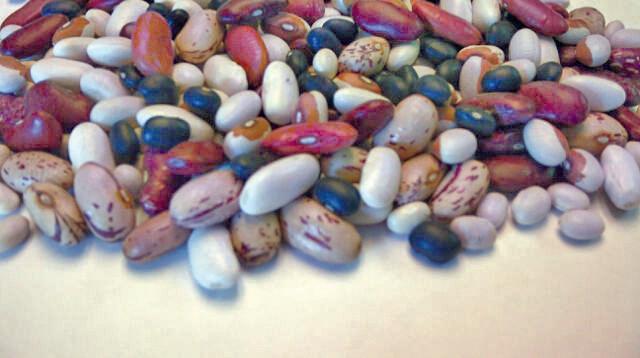
Nathan Saarloos, president of the Elgin Soil and Crop Improvement Association and a sales agronomist, said he was feeling the increase in fertilizer cost in both his job and farming.
Prices had reached record highs since a 35% tariff was imposed as a sanction on Russian fertilizer coming into Canada, and Russian ships were also banned from unloading in Canadian ports.
Rising fuel costs were also a big concern, and those would increase further as the federal carbon tax went up. He said exemptions from that were needed, especially for grain growers.
Mr. Saarloos also called for an effort to reduce safety on roads used by both cars and agricultural machinery.
Due to wet weather during the last harvest, trucks couldn’t be driven onto fields and had to be loaded at the roadside, increasing the risk to farmers from other motorists.
Greg Fentie tried to report on behalf of Elgin’s dairy producers, but technology problems stopped him from connecting properly to the meeting. However, he subsequently provided a written copy:
Elgin County has 56 dairy producers and Ontario has around 3,400. Ten thousand farmers, their families and employees directly work on Ontario dairy farms.
There are 73 000 people working in relation to the dairy industry in Ontario. This of course includes breeding, veterinary, feed, transportation, processing and many other services.
The first thing I wanted to talk about was a grocery code of conduct. A federal grocery code of conduct would be of benefit to all Canadian agriculture producers and processors. There are currently two major grocery retailers in Canada and they have significant control over the price of food. How that manifests itself in dairy is in relation to orders.
Currently, retailers have the ability to change orders right up until they are delivered, without penalty. A truck loaded with bagged milk on Wednesday to be delivered to a grocery store on Thursday can be cancelled without explanation.
Where is the milk to go? This affects processors and in turn their demand from farmers.
the federal government knew how stressful long shipping trips were on animals.
The provincial government would, the day after the meeting, announce a $25-million fund to increase meat processing in Ontario. “We hear you loud and clear.”
She’d heard about the issue for years, which was why, when she became agriculture minister last year, she immediately began work on trying to resolve it.
The province was trying to match abattoirs that did have available capacity with producers that needed that, she noted.
– MP KarenThe next thing to talk about is trade agreements. Dairy farmers cannot afford further concessions in trade agreements, including the upcoming Canada-UK free trade agreement. Concessions erode our ability to manage the supply of milk domestically. Furthermore, compensation for CUSMA (the Canada-USA—Mexico trade agreement) needs to be delivered.
Lastly Ontario’s dairy farmers need greater processing capabilities and need them close to milk production. Southwestern Ontario is a major supplier of milk to processors but many of our processors are located elsewhere in the province. This results in higher transportation costs.
All levels of government should look to incentivize processing businesses to build in Ontario and specifically close to where agriculture products are produced. This is true for many ag products.
Ms. Lunn then introduced Minister Thompson, who was born and raised in Wingham and now resides on a Bruce County farm.
“I’m always here for you,” Minister Thompson told meeting participants, noting she’d grown up in the 4H system and had made lots of friends in Elgin County that way.
She then responded to each of the commodity groups that had made presentations.
For the grain farmers, she said the cost of crop inputs were going up. “If ever there was a time to insure your crop, it’s now, because of the rising cost of doing business.”

For the beef farmers, she wondered if
The Ontario government was also announcing a $22-million fund to find innovations in agricultural technology that allow farmers to “work smarter.”
Responding to the fresh fruit and vegetable growers, she said the Ontario government was focused on making the province more self-sufficient in agriculture, “and the Premier is at the head of the pack.” She lauded Mr. Hartemink for his long record of leadership in Ontario pork production, and recalled seeing him recognized as Ontario Pork celebrated its 75th anniversary.
“Ontario Pork is amazing to work with,” she said. If ever African Swine Fever struck in Ontario, “We’re prepared.”
Turning to processing vegetables, she said she heard Mr. Froese when he called for more domestic production of fertilizer.
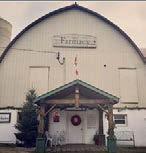
She’d been pushing her ministry officials on that subject just two weeks ago, and the idea was “starting to get traction.
“We can’t be so dependent on outside sources. And we want to make sure you have everything available that you need to be your best in your greenhouse and in your fields.”
To the chicken farmers, she lauded the “Feather Board Command Centre” and its work combating the avian flu settling into Ontario.
“You guys have got this,” and her ministry was doing all it could to battle the disease as quickly as possible.
MP Karen VecchioMP Vecchio told participants that she understood the tremendous effects that the invasion of Ukraine were having on everyone, including them, and how the uncertainties created as a result were affecting mental health.
“What’s going to happen if we can’t plant our crops?” she asked, and people were talking about rationing of fertilizer. As soon as the 35% tariff was imposed, she continued, she wanted to ensure everyone who had ordered prior to March 2 didn’t have to pay that, but farmers at the same time understood why the action had to be taken after March 2.
And, she said, changes had to be made because ports were not allowing in Russian-flagged ships.
For Canadians, the cost of living was a huge issue, and healthy food and healthy producers were required to have healthy communities, she said.
Question Period in the House of Commons in Ottawa was focusing on the carbon tax, which she knew was supposed to go up again on April 1, and that farmers were not getting that money back.
The tax was “far from revenue neutral as the government claims,” she said. “It is impacting everybody.”
MP Vecchio stated, “Farming is a way of life. It is a great career. How do we ensure there are going to be younger faces there for the next generation?”
Young farmers had to have help when they were getting started, she said. As for trucking costs and barriers hauling livestock from one province to another, “We’ve got to find a real solution to this.”
She sympathized with Mr. Howe over his complaint about fresh fruit like strawberries being “dumped” into Canada.

“How can you buy a pound of strawberries for $1.68 when that doesn’t even cover the cost of labour here in Canada?”
Everyone preferred Ontario strawberries, she said, but they were also available from Mexico 12 months of the year.
Warden French
Warden French told the meeting that she grew up on a Malahide farm and understood the importance of agriculture to the local economy, which had been built by hardworking farmers of the past.
Farmland values had been rising faster than those for rural residential properties, so to counter that, county councillors had dropped the farm tax ratio from 25% of what residential properties paid for an equivalent property value to 23%, and that would continue for now.
Elgin was also working hard to find a solution to the “digital divide,” where many rural properties lacked high-speed access to the Internet.
She understood how important it was to have such access, she said.
Elgin was completing a transportation master plan for the county, and it would recognize how vital maintaining roads, bridges and culverts was to farming.
The size of modern agriculture equipment was also being considered, she added.



We are a local family business proudly located in Southwestern Ontario. Our skincare product is handcrafted at our Farmacy and is 100% toxin-free. What started out as wild ideas has now turned into our success of over 20 years! We believe that high quality personal and beauty products should be full of pure, simple, wholesome ingredients that should only be the Best for you, your family and our earth. You deserve to feel the freedom and peace of mind that what you put on your skin is 100% natural!


We grow and harvest all plants and fruits on our farm and believe that Mother Nature provides more than enough natural ingredients to give us beautiful and healthy skin for life. Every plant, flower, fruit and essential oil we select has a very specific purpose for our skin and health as well as therapeutic properties and healing in mind.
Natural has become a way of life and our Family has and always will provide all our amazing customers with only the purest, highest quality products!
Thank you for supporting Local!
All our Love, The Meadow Family xo
3881 Avon Dr., Belmont ON 11km east of Belmont on Avon Drive 519-269-3961

Farming is a way of life. It is a great career. How do we ensure there are going to be younger faces there for the next generation?
Vecchio



Oct 13, 2020 - The message came in as I was driving through the earlymorning darkness.
“Rain delay,” texted Simcoe farmer Brett Schuyler. “Probably till noon by the looks of it.”

My mission was to spend the day picking apples with a crew of migrant farm workers. That meant getting to Schuyler Farms by 6:30 a.m., being in the orchard by 7, and putting down my bucket at 5 p.m.
Mother Nature, who is actually in charge of all farm scheduling, had other ideas.
Management Technician at 519-808-6370 or by e-mail: water@catfishcreek.ca





For more information regarding watershed stewardship projects please contact Tony Difazio, Resource Planning Coordinator at 519-773-9037, or by e-mail: planning@catfishcreek.ca
www.catfishcreek.ca

In past years, Schuyler might have tried sending crews out. At harvest time, every minute counts. But since the sniffles can now prompt a COVID test, it’s not worth risking a worker catching a cold and knocking a whole bunkhouse out of commission.
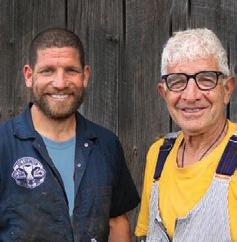


Picking apples isn’t rocket science, but there’s a skill to it.
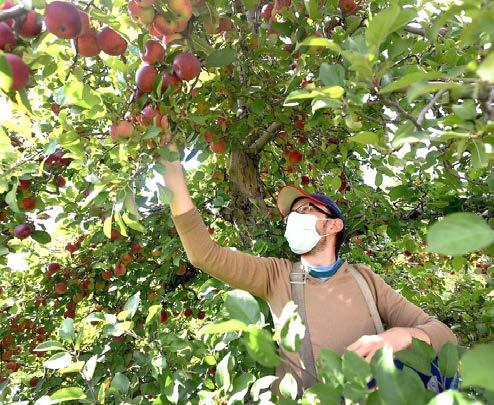
I know because once we eventually got going, I dropped about as many as I picked.
Some apples fall off the branch at the lightest touch, while others need firm encouragement. The problem is that you don’t know which is which. Going in too forcefully might get you one apple but knock its branchmate to the ground.

Apples bruise so easily that once they hit the dirt, they’re destined for the juicer. And since apples for eating fetch double or triple the price of juice apples, my new bosses preferred I not clumsily litter their orchard with perfectly good fruit.
Eventually I learned a few tricks to ensure more fruit ended up in the bag, which holds about 80 or 90 apples. Once
the bag is full, you carefully lower the apples into the large bin in the centre of the row, pulling out any stray leaves and branches that came along for the ride.
The crew of about 10 workers — Trinidadians, Indians, Mexicans and one veteran Canadian picker known as “Miss Kim” — had a rhythm as they moved down the row, instinctively knowing which branches to tackle next while keeping their distance as a pandemic precaution.
It helped that we didn’t need to be choosy while picking Empire apples, said Ephron Maurice of Trinidad, who had the unenviable task of showing a rookie picker the ropes. Every apple went in the bag, destined for cold storage and then store shelves next year.
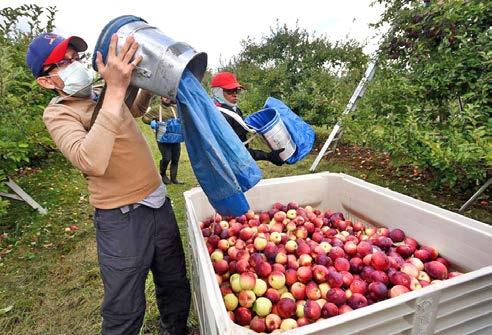
It was easy to zone out and focus on the fruit, energized by the soca and reggae beats blaring from workers’ personal speakers as I searched high and low for splashes of red.
The speedy pace left little time for chit-chat, though I did get to know Melissa, an aspiring kindergarten teacher who has been in Simcoe less than a month. She was transferred to Schuyler Farms from an Alberta tree farm where — thanks to the pandemic scuttling her trip home to Trinidad — she had been living since January of last year.
“The hardest thing to do is make a start,” Melissa said of her leap into the unfamiliar world of agriculture.
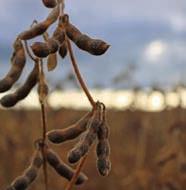
She’s been studying online while in Canada and earning money for her tuition. By next year, she expects to be off the farm and in a classroom.
Farm work is a change of pace for many of the migrant workers who come north looking for a better financial future. Maurice hangs gypsum drywall back home, while Himanshu left his fi-
nance job in India to pick fruit in Simcoe as a way to get paid while getting fit.
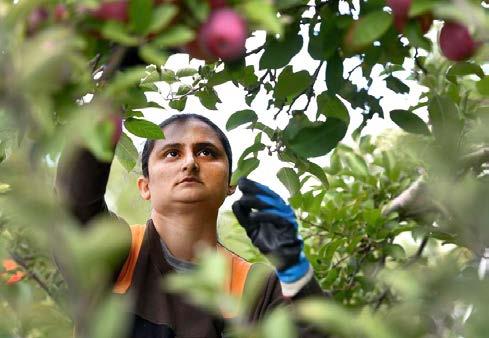
I’d spent most of the day picking on the ground, which while repetitive wasn’t too taxing. Picking asparagus or tobacco, with the constant bending and stooping, would be brutal. But before knocking off at 6 p.m. — the bosses added an extra hour to make up some of the lost morning — I wanted a turn on one of the large three-legged ladders workers use to get at the top branches.
“Go at your own pace,” Maurice cautioned, looking slightly worried that he’d soon see a reporter sprawled out on the grass.
I thought it best not to mention that I’m afraid of heights.
When I gingerly stepped off the ladder a few minutes later, branches bare and bag full, Maurice was waiting with his review.
“J.P., that was terrible. Just terrible,” he said, chuckling at my slow-motion picking.
Melissa warned that I’d wake up the
next day with aching shoulders and a sore back. She wasn’t wrong. There were also bruises from the bag and cuts from the branches. My hands — more used to tapping on a keyboard than tugging at stubborn fruit — hurt a bit, too. But I’d gotten off easy.
Starting at noon meant missing the early-morning chill, when Maurice says it’s so cold your fingers feel like they’re burning. And if I was ready to call it a day after six hours, how would I have handled 10?
However long I was out there, I went into the day knowing I could sleep in the next morning and nurse my minor wounds. Farm workers get right back to it, toiling from predawn to dusk so that Canadians can eat.
Spending even a few hours in the fields with this resilient crew made me appreciate even more how essential their work truly is. To all of Norfolk’s migrant farm workers, this apple fan salutes you from his core.
1-800-265-8792
I picked apples with a crew of migrant farm workers. Everything hurts. And I got off easy.
The hardest thing to do is make a startSpectator reporter J.P. Antonacci spends a day with the apple picking crew at Brett Schuyler’s farm in Simcoe. J.P. reaches up for an apple at Brett Schuyler’s farm in Simcoe. (THE HAMILTON SPECTATOR) J.P. Antonacci pours his load of apples into a bin. (THE HAMILTON SPECTATOR)
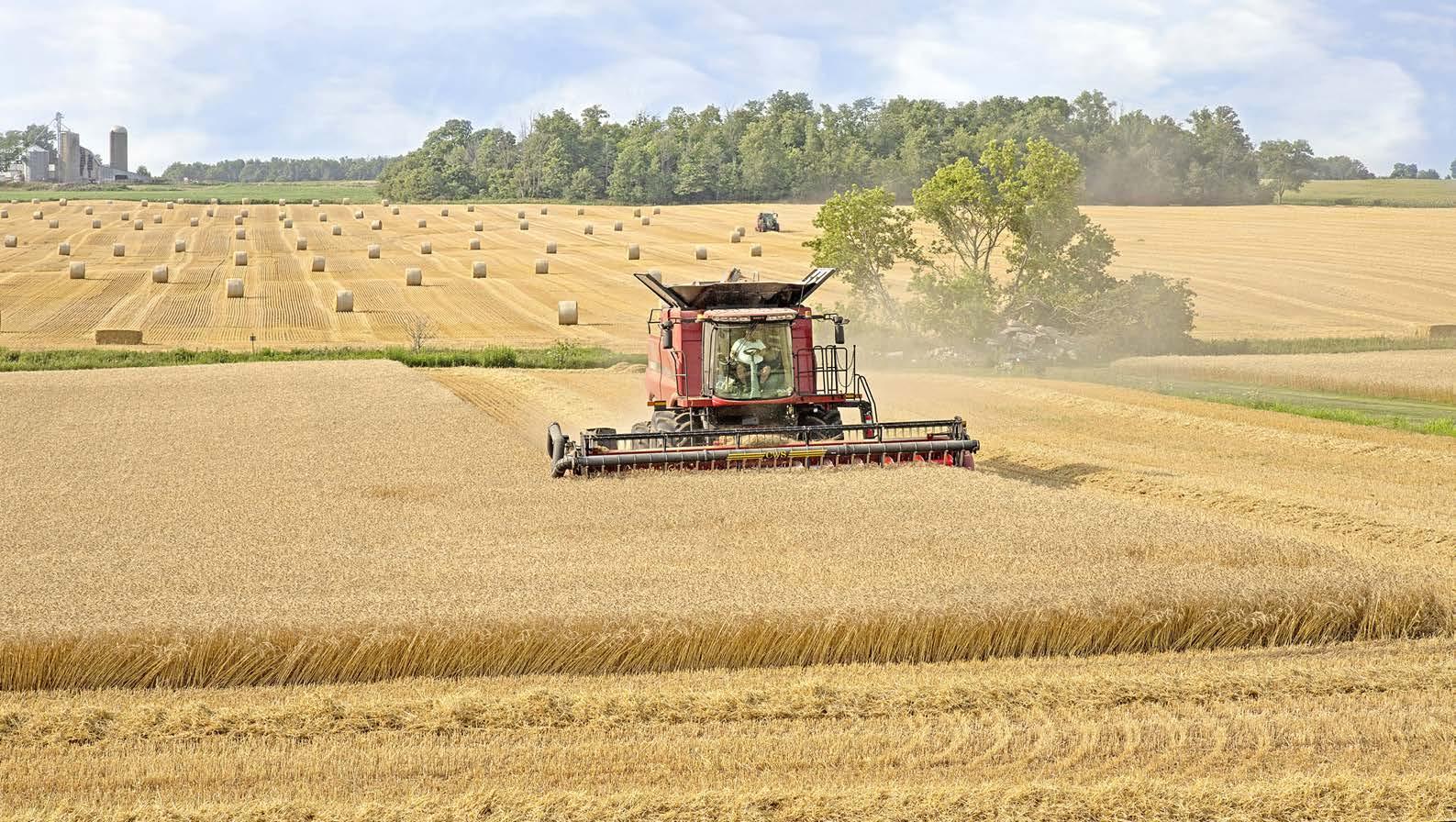




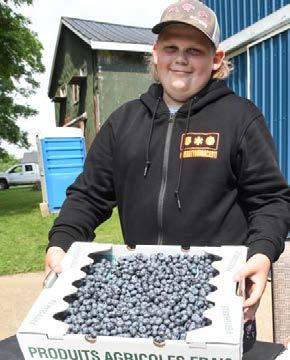
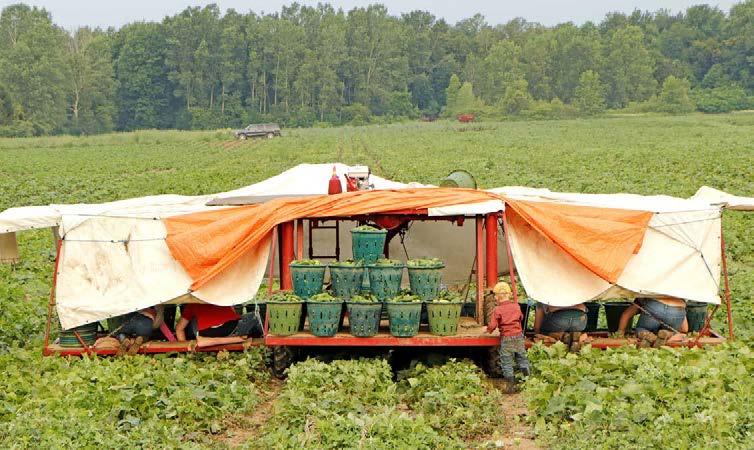




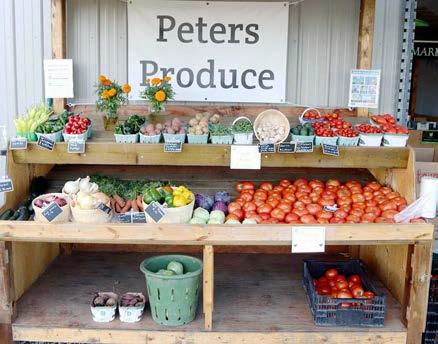

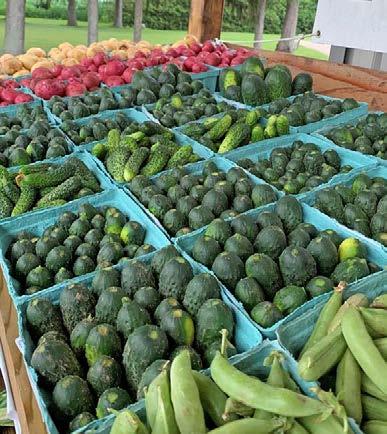
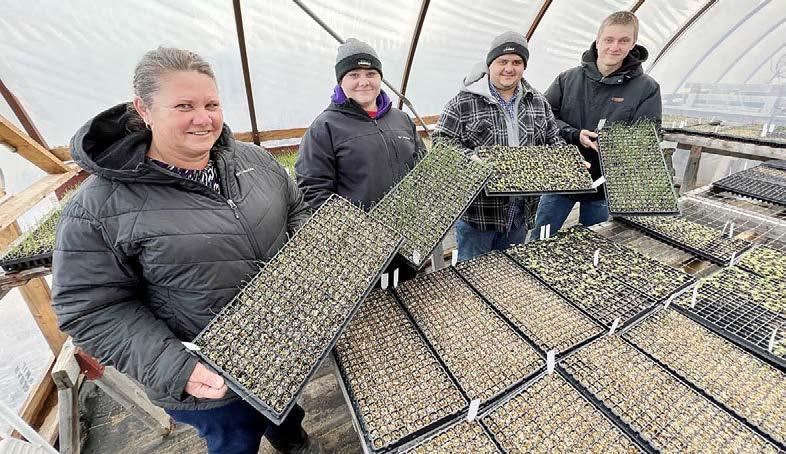 by Rob Perry of The Aylmer Express
by Rob Perry of The Aylmer Express


Four members of the Peters family, mother Annie and children Stephanie, Justin and Derrick, are building a freshmarket produce operation on Calton Line east of Sawmill Road in Malahide.
They’ve grown from their first experimental crops totalling 1.25 acres in 2020 to six acres last year and 10 acres being planned for this year.
Growing freshmarket produce was a labourintensive but highly productive enterprise, Justin said, pointing out that the six acres produced last year resulted in a harvest of 10 tons or so of a wide range of crops, from potatoes and tomatoes to flowers.

Annie is originally from Belize, where she grew up on a farm, and she moved to the Aylmer area in 1986 with her family when she was 18.
Here, family members worked for other farmers, and then Annie got a job at ThermO-Comfort, an insulation company in Aylmer at the time. She held a variety of factory jobs, including spending 18 years at Presstran in St. Thomas.
In the meantime, she married John Peters in 1994, and they started a family.
In 2008 Annie left her factory job after John got an offer to join another farm business in Belize, in part so she could stay at home and focus on their then-young children.
Justin came back to Canada in 2016 to enrol at the Ridgetown Campus of Guelph University where, after finishing a two-year diploma program, he switched to the Guelph campus and completed his bachelor’s degree in agricultural science in 2020.
“I always had a passion

for agriculture, a passion for farming. I enjoyed it. I did gardening at a young age of 12 or something. I like seeing stuff growing.”
Annie recalled that Justin started by growing onions in their garden, seeding them and then transplanting them, putting in drip irrigation and figuring out the best way
2019, given the younger children were old enough to look after themselves. They returned to a farm they had owned since 2001, having rented out the land and house while in Belize.
Stephanie, after graduation from East Elgin Secondary School, did a pre-health diploma program at Fanshawe College. She’s going back to school this fall, but she hasn’t decided what to study yet. While she works on the farm, where she finds tasks both a chore and a pleasure, she didn’t believe she would pursue a career in agriculture.
Her favourite part of farm life is watching plants get a start in the greenhouse late each winter.
Derrick is in his last year at EESS, and after graduation expected he would pursue welding or machining.
wanted to do some produce,”
Justin said.
“He’s been talking about it for a while,” Derrick agreed. “For years,” Stephanie added.
Annie said, “He saw potential here, you could be selling produce by the roadside.”
Everyone pitched in to help make the farm work, she continued, in addition to studies and other jobs.
They began in 2020 with 1.25 acres of land, Justin said. They had onions, about 0.4 acres of corn, some tomatoes, quite a few potatoes, peppers, green and yellow beans, cucumbers, herbs, pumpkins, squash and other crops. Having a variety of produce meant the sales season was extended through much of the summer and fall, and gave customers a wide choice in what they could buy.
Justin said he was mostly happy with that first year’s harvest, but one downside was that having such diversity made getting everything perfectly right more difficult.
If they’d just been growing cucumbers, he said, they could have taken steps to maximize their yield. With 25 different crops, they had to take more of a “one-size-fits-all” approach to management.
One step they did take was to rotate the crops grown on any particular piece of soil every year, to avoid crop-specific diseases from flourishing and to keep the soil nutrient levels healthy.
The crops also had to be irrigated and sprayed as needed, and weeded either by machine or by hand.
Stephanie said last year they didn’t have to do as much weeding as the first year, and hopefully even less this year as they improved their efficiency.
Justin said part of that would be designing the layout of the crops so machinery could be used for as much as possible.
They all held jobs in 2020 in addition to the produce operation, as well as Justin having his own personal agricultural business and working on his uncle’s farm at times.
The family also grew some cash crops and cucumbers for commercial processing, and they might rent additional land this year to expand that.
While they generally had good results that first year, the crops that did fail were in plants they purchased for transplanting.
That was why they decided to build their own greenhouse in 2021, to give some crops an early start and ensure they were hardy enough to transplant.
The greenhouse is 20 feet by 60 feet, and is used to start such crops as peppers, tomatoes, watermelons and onions.
In the fresh produce business, having a crop ready for sale earlier than others was a financial boon.
to make them flourish.
Justin said that when he was 16, he rented a little land and grew some corn and kidney beans. The corn crop was good, but the beans only broke even, which had a lot to do with the weather. He also filled as neighbour’s garden with sweet corn, which probably had the best harvest.
He explained he returned to Canada because most farmers in Belize didn’t have postsecondary education or even high school, so a huge demand existed for those with degrees.
Lots of investors were coming into Belize, looking to start a farm business, he added.

The rest of the family stayed in Belize while Justin was studying in Canada.
John also had a postsecondary education, but Annie didn’t even finish high school before going to work full-time.
“It’s a big contrast between us,” but they both believed in the importance of post-secondary education for their children.
Annie, Stephanie and Derrick came back to Canada in
He liked working with his hands, and on the farm, he said, because he enjoyed the variety of tasks and not doing the same thing every day.
His favourite part of farming is running equipment such as tractors.

The Peters’ home farm is 50 acres of sandy-loam soil, 28 of which was workable, with perhaps an acre for the house and barn and the rest covered by woods.
They have a second 50-acre farm as well, which the family bought in 2001 before leaving for Belize. That farm had very variable soil, from sand to clay, but mainly was also sandy loam, with 38 workable acres.
That’s where they grew their produce because they have access to water there. Irrigation, he noted, was easier to manage on a sandy loam soil, which retained moisture somewhat but otherwise provided good drainage. Vegetable crops needed some water, he added, but not too much.
The decision to start their own produce operation came right after COVID-19 first struck in 2020.
“It was kind of a last-minute decision, but I’ve always
Room to grow
All the sales that first year were from a self-serve roadside stand. The business wasn’t big enough at that time to hire someone to man the stand, though that changed last year.

Produce could be grown so tightly someone couldn’t walk through it without squashing part of the crop, which they saw in the first year. In addition, planting crops too close together could result in one overtaking the other, such as in their experience tomatoes and peppers.
“If you’re not first, you’re last,” Justin said. Being first brought better prices and higher demand.
In 2021, they expanded the size of the crop and nearly everything went up in volume, Justin said, especially the peppers and tomatoes. And with the greenhouse, they also sold potted vegetables and flower for home gardens
such as marigolds, petunias, geraniums and impatiens, as well as hanging strawberry baskets.

They sold rhubarb and asparagus brought in from a relative’s farm as well.
Many customers driving by had asked after a particular kind of produce, and they wanted to ensure they had a steady supply by having bigger crops.
They’d noticed in the first year, when yields were smaller, that the first customer could purchase out the entire day’s harvest of one crop, leaving stand visitors through the rest of the day disappointed.

Annie said advertising any one crop in 2020 had immediately resulted in it selling out. They wanted to ensure they had a consistent supply for every customer.

That went better in 2021 with the larger production, and this year, and they’d even been able to wholesale part of what they grew to a produce auction in Elmira.
Everything is bigger
This year, “Pretty much everything is just going bigger,” Justin stated. He also planned to focus on management more to get higher yields, with increased emphasis on crops that brought in the best revenues.
They also expect to participate in weekly markets at Elgin Innovation Centre and the newly-reopened Aylmer Sales Arena in Aylmer.
While they weren’t sure if the produce operation would bring in enough to earn a living for the family, Justin hoped it would become a full-time occupation for at least a couple of them.
Their farmstand will be open from mid- or late-May through the harvest season this year, and only as a self-serve stand on Sundays.


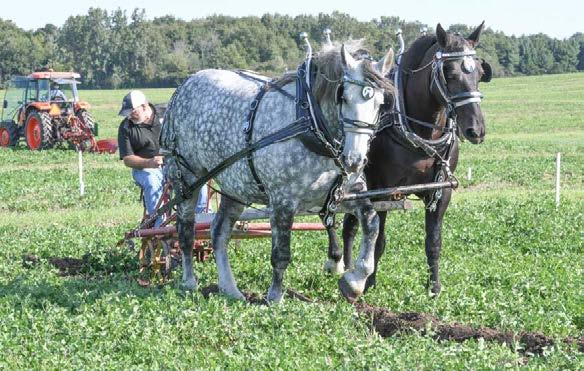 By Jessica Munro, Local
By Jessica Munro, Local
Journalism Initiative

Reporter, Brockville Recorder and Times

Jan 10, 2022 - The International Plowing Match and Rural Expo (IPM) will be held just south of Ottawa this September.

In 2020 and 2021 the event was cancelled because of the COVID-19 restrictions, but despite the uncertainty of future restrictions, organizers are continuing to plan for the event this fall.
The IPM is a five-day celebration of all things agriculture and rural living, with plowing competitions, activities for

people of all ages, opportunities to learn about agriculture, hear live entertainment, visit vendors and see a variety of different exhibitors like small and large equipment and more.
This year, the event will run from Sept. 20 to Sept. 24.
The IPM is held in a different community each year and for 2022 it will be held in North Grenville on 250 acres of the former Kemptville College campus lands, located just off of County Road 44.
About 550 to 600 acres of land will be used from other locations in North Grenville, said IPM marketing coordinator
Cassidy Reaney.
Heading into its 103rd year, the IPM is expected to attract more than 80,000 people from across Ontario, throughout Canada, the United States and beyond to North Grenville this year. It’s expected that the IPM will wrangle in about 8,000 to 10,000 students from the United Counties of Leeds and Grenville and surrounding area, Reaney said.
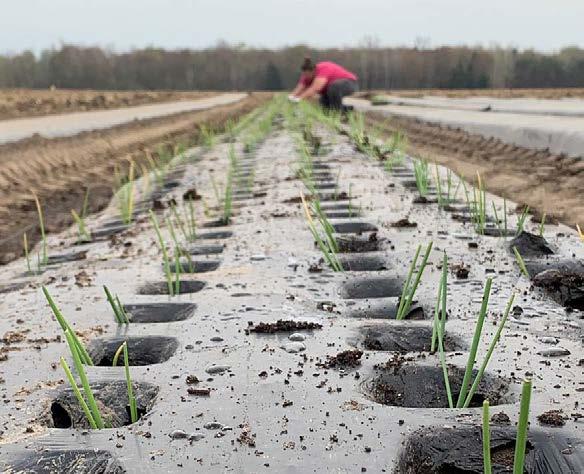
Hosting the event is an economic generator for the host town or county and its estimated economic impact is about $25 million, as well as exposure of
the community.
“This is one of those events that can really let a community showcase its pride,” said Reaney. “I think this will be huge for the community.”
The IPM is billed as the largest outdoor event of its kind in North America and is packed with a myriad of different attractions and events during the week.
Visitors should be prepared to see upwards of 40 entertainers at this year’s expo. The RAM Rodeo Circuit will be featured during the event and RV park and tents will be back.
Leading up to the event, there will be a quilt competition and poster contest, said Reaney.

“There is still so much to be announced.”


While planning is underway, volunteers are still needed.
Currently there are about 300 volunteers registered but the large event will need between 1,000 and 1,200 volunteers to do various activities, including chairing committees, being involved with the entertainment,
parking and ticket assistance, building the tented city and laying out the RV park, working information booths and other duties, said Doreen O’Sullivan, volunteer committee co-chair.
“My motto is no one can do everything but everyone can do something,” said O’Sullivan, adding that there aren’t any requirements to become a volunteer.
“Fingers crossed that everything will be fine come September ... this will be its (the IPM) first return since 2019 in Verner,” said Reaney. “We’re hopeful; I think everyone is.”
The IPM was previously held in Eastern Ontario in Finch in 2015, in Hawkesbury in 2011 and in Crosby in 2007.
As a North Grenville council member, O’Sullivan said she is “thrilled” the IPM is coming to the area this year.
“It’s just so good for the community, the fundraising and the amount of money it brings into the community and the profile it brings to agriculture. It’s just a great opportunity.”
Phil Wait of Woodstock brought his Percheron team of Molly, 7, a dappled grey, and Ruby, 17 to the Elgin Plowing Match held south of Belmont on Saturday, Sept. 11. He’s been competing with draft horses in plowing for nine years. The annual Elgin Plowing Match returned after a one-year absence, held on the farm of Brian and Donna Lunn south of Belmont on Saturday, Sept. 11. The 2021 event involved 31 participants, including three horse-drawn teams, and had been scaled down from previous years due to ongoing COVID-19 restrictions. After a two-year hiatus, the International Plowing Match is expected to return this September. It will be hosted by North Grenville, just south of Ottawa.

Annie Peters of Peters Produce filled in empty spots in an onion field last year. They use a transplanter to get in as many plants as possible, and then go along and fill in the rest. (AE/contributed)(AE/Rob Perry)




Rural Affairs
I’m seeing it happen. And I know that people are very mindful as to how they can enable the next generation and new interest to be engaged farming.
Lisa Thompsonrecently gave an exclusive interview with The Aylmer Express to discuss current issues in farming. She has been the elected representative for Huron-Bruce for the past three terms as part of the Ontario PC government, and appointed as minister of agriculture in July 2021.

Aylmer Express: This portfolio as the minister of agriculture is fairly new to you. You have deep farming roots and experience in the community. What have you found to be the most revelatory part of being the agricultural minister? Is there something that you’ve learned about farming that you haven’t considered before being the minister?
Minister Thompson: The one thing I’ve learned since coming into this chair is – something people from rural Ontario can really appreciate – the value of networks. I’m still engaged in 4-H and am blessed to be able to know people from every county and region through that program. (The minister had remarked in introductions, “I remember through the provincial 4-H program meeting a lot of good people from Elgin County.”) I’m also an alumnus of Class 6 of the Advanced Agricultural Leadership Program (through the Rural Ontario Institute in Guelph). That in and of itself has enabled me to have quite a network of contacts that has proved absolutely invaluable.
Whether it’s a Junior Farmer, 4-H or AALP contact, sometimes when I have questions, I reach out to people I know, and they’re very, very good to share their ideas, share their perspectives and help inform me going forward.
The rural Ontario agricultural community at the provincial level is absolutely incredible. And part of that value is the network that we’re very fortunate to have from ginseng to oilseeds, and grain through to the beef producers. It’s something that I value and I will never take for granted.
AE: What do you feel are the biggest challenges that Ontario farmers are facing now or in the immediate future?
Minister Thompson: I am buoyed by the vision and the determination and therefore the commitment of farmers across this province to continue to produce good quality, safe food, close to home. They’re ready to embrace innovation. They’re ready to embrace efficiencies and data analytics so that their businesses can be better. And it’s really interesting to be out and about, meeting farmers who are looking to add to their business to sustain and grow it into the future, in the spirit of succession for future generations.
AE: On that note of succession, do you think with soaring land prices and increased urban development that it’s feasible for people to get into farming through pathways other than generational ownership?
Minister Thompson: There need to be very thoughtful business value propositions. But we have new farmers, young people actually entering food production in Bruce County, and I really admire their stickto-it-iveness and their desire and their dream to farm.
And it takes a whole industry. It’s a complete circle of support – from financial institutions through to the neighbor down the road and the local commodity organizations.
AE: With recent problems experienced with the protest blockades on the international bridges, what are the province’s most urgent priorities when it comes to addressing food security issues and transportation?
Minister Thompson: In terms of food security, it is a number one priority. The Ontario food terminal is the third largest food hub in north, after Los Angeles and New York. When it comes to fresh produce, 70% of what’s produced in Ontario goes south of the 49th parallel. Goods and commerce go back and forth across the Ambassador Bridge and the Bluewater Bridge to the tune of hundreds of millions of dollars every day.
I’m very pleased that our government recognized the importance of supporting that commerce and by way of the solicitor general and the attorney general introducing their legislation last week. We’re standing up and saying the economy matters and we need to ensure that the flow of food is not interrupted.
[A press release on that legislation reads: “the Keeping Ontario Open for Business Act would, if passed, better enable the province to respond immediately to future disruptions to international border crossings such as bridges and airports when those disruptions interfere with public safety, the economy and international trade.”
It detailed $96-million in related spending including enhanced law enforcement training through the Ontario Police College; improving Ontario Provincial Police emergency management, investigations and intelligence; and purchasing equipment such as heavy tow trucks to keep borders open.]
AE: Is there anything being done to increase the capacity of, or develop new processing plants at home for our agricultural goods?
Minister Thompson: Absolutely. Since I came into this chair, my number one goal was to increase capacity right here at home in Ontario. We introduced a $22-million Agri-Tech Innovation Program to help our processors build efficiencies and embrace new technologies to improve their output. We’ve also recently introduced a $25-million Strategic Agri-Food Processing Fund, which is aimed at increasing processing capacity; enabling our processors to embrace new technologies and equipment; and for the first time in recent history, we’re investing, we’re giving people the opportunity to invest in brand new processing facilities. We need to ensure that for our farmers can realize that value closer to home. That’s going to help them offset transportation costs, that’s going to enable our communities to realize more jobs, and it’s going to enable Ontario to be a destination when it comes to accessing amazing, good quality food grown in Canada.
AE: Given recent inflation, what would you consider to be the greatest threat facing farmers when it comes to controlling their costs and the price they receive for their products?
Minister Thompson: While commodity prices overall for cash crops are good, we’re doing our best with our other commodities to make sure that they have
the proper programs and tools available to them to mitigate risk. For instance, we’ve extended deadlines for our Risk Management Program (RMP) production insurance this year. We are looking to our federal counterparts as well to make sure we have a proper dialogue addressing the increase in cost of food production in Canada, as we approach our next policy framework.
AE: Do you have any concerns about whether farmers will have the supplies they need this year to grow and maximize their production, particularly fertilizer?
Minister Thompson: Both the Premier and myself are just literally a text away from any issues as they crop up. Grain farmers, in particular, when they had some concerns about nitrogen, were reaching out and we were very responsive. As concerns come up for our farmers, we’ll be working very closely with our commodity organizations, as well as our federal counterparts to ensure that we can resolve any issues that may pop up, or we knock down any hurdles for them. It’s all about listening, being very responsive and bringing forth an action plan. We’re building confidence throughout our entire agri-food value chain.
AE: How might the war in Ukraine and sanctions on Russia affect Ontario crops and our processed exports, as well as any imports from that region?
Minister Thompson: First and foremost, I need to express that we stand with the people of Ukraine and it breaks our hearts that they’re experiencing this absolute travesty. The important thing to recall is that we stand with them.
In terms of the inputs that we need to be producing and supporting our farmers during this season, I’m hearing from Grain Farmers of Ontario and other commodities that we are very closely watching the needs of our farmers. I applaud GFO, as they were proactive in reaching out to their membership and asking them to be thoughtful about the crops they’re growing and encouraging farmers to talk to their agronomists and local suppliers about what they might do in terms of their crop cycles this year.
Another thing that we’ve done is extend our deadline for both RMP and production insurance this year. Because farmers across this province may pivot instead of growing corn, which requires a lot of nitrogen. They may, in working with their agronomists, considered growing soybean.
We wanted to make sure that we extended a timeline to get them a chance to access tools if they so choose.
Minister Thompson also spoke to area farmers during a roundtable discussion with Elgin Federation of Agriculture later the same week. The story can be found elsewhere in this edition.


By Genelle Levy, Local Journalism Initiative Reporter, Cambridge Times Dec. 7, 2021 - New Dundee turkey farmer Mark Reusser accepts that farming is a career filled with uncertainty, but he says a global pandemic has exacerbated that level of uncertainty, leading to high levels of stress and anxiety.
“Farming has always been a stressful occupation due to the fact that the income we make is based on things we can’t control, like the weather and price margins,” says Reusser. “But COVID19 has resulted in a general uncertainty with regards to how we are going to make money and uncertainty in regards to how that will affect prices, crops and the whole supply system. It has exacerbated the problem of anxiety amongst farmers.”
A new study from the University of Guelph shows an 80% increase in poor mental health among farmers. The study also shows a tremendous increase in
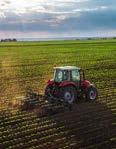
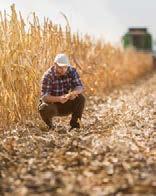

male suicide in rural and farming communities resulting from pre-existing mental health conditions that have been exacerbated by the pandemic.
Cambridge farmer John Bos says that covid has affected a lot of the practical parts of farming, resulting in additional stress.
“Covid has added a whole level of uncertainty,” says Bos. “There’s the escalating cost of equipment and replacing parts, and input costs are rising. We’re also seeing huge labour shortages which has added a level of stress to getting crops harvested and products to market.”
University of Guelph professor Leith Deacon, who conducted the research, says that when it comes to mental health in the farming community, there’s a unique challenge since people often live at the place where they work.
“Farmer mental health requires a different response because more often than not this is a vocation for these
individuals, they live and work at their place of residence, and it is difficult to have separation between the two,” says Deacon. “The key, though, is that response plans, programs and policies aimed at those in the agricultural community are reflective of the realities that they currently face.”
Brant County beef farmer Sandra Vos says that mental health is a well-hidden concern in the farming community. She also cites the way covid has changed the social aspect of farming as an additional pressure impacting mental health.
“It’s the same stigma that has been with mental health issues for centuries. Mental health is not like a broken leg,” says Vos. “You can’t see that people aren’t well and that they’re struggling.
There’s a stigma that people with mental health issues might look like they’re lazy, not hard-working.”
The idea of farmers being hardworking, independent individuals is pervasive, says Reusser, and it can often result in farmers bottling up mental health issues.
“Farmers tend to be entrepreneurial business people who like to look after themselves, and unfortunately sometimes when you are more independent,
that can make anxiety that much more apparent,” says Reusser. “In the past, farmers have not admitted that they have issues of anxiety and stress.”
But Reusser says that the pressures of covid have prompted more farmers to seek help. A number of farming and agricultural societies have put together resources to assist farmers. The Ontario Federation of Agriculture lists a number of resources on their website.

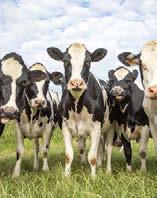
The Farmers’ Toolbox, developed by the Listowel Agricultural Society, features video clips of farmers who moved from feelings of hopelessness to seeking help. In partnership with the Canadian Mental Health Association, the Ontario Federation of Agriculture offers farmer mental health training in the form of half-day training sessions. There are also directories of therapists who have farming backgrounds and experience in the industry.
Reusser agrees that more farmers seeking help is a great thing.
“There’s no shame in admitting that you are dealing with stress and anxiety,” says Reusser. “There’s no shame in seeking help. If there’s something I could say to farmers, go seek help.”
We’re standing up and saying the economy matters and we need to ensure that the flow of food is not interrupted.Michael Krahn

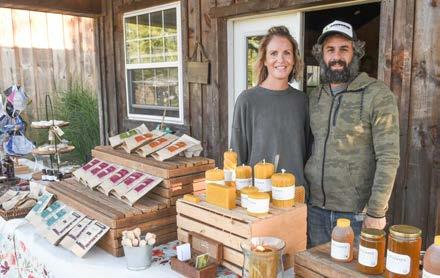


In Aylmer, Central Elgin and St. Thomas farm markets are aiming to reinforce home-grown goodness and draw people to the region. With climbing fuel prices, fault-lines showing in large-scale supply chains, and increased interest in locally-grown goods, those running the markets believe there is demand and room enough for everyone.
By Renée Hueston of The Aylmer Express
For a long time, Aylmer was the place to be on Tuesdays. Since the 1950s, people would come from near and far to shop the fresh crops, locally processed meats and cheeses available at the farmers’ market in town. They’d stay for lunch and patronize the downtown businesses while here. And the vendors would come from across the region for the chance to sell their goods directly to customers.
It was a not a novel idea, but not a common one either, with few other places offering direct access to local food. This was part of the reason it became so popular. Londoners would descend upon Aylmer for the chance to purchase produce from the same people who grew it.
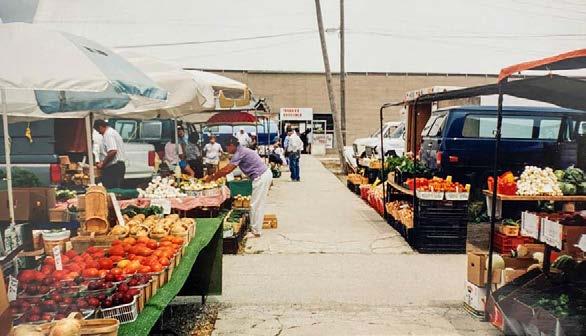
If imitation is the sincerest form of flattery, then the Aylmer Sales Arena and Farmers’ Market should have been very flattered, as London followed suit with the revitalization of both the Covent


Garden Market and The Market at the Western Fair District. Farmers began to man booths at those markets, wanting to access the largest audience, and some started vacating their booth closer to home. The proportion of farm stands to other businesses began to change in Aylmer, and eventually the produce booths were the minority, dominated by goods, wares, and flea-market offerings. A few core farm vendors remained, but it transformed into something other than a farmers’ market, and two years ago the owners decided to close.
Stephanie Dall’Armi-Lensink remembered exactly how it used to feel visiting the Aylmer Sales Arena and Farmers’ Market: “My first experience was coming in 1993 around Christmas time with my family. I remember it being so busy, it was bustling.”
She reflected, “Over the years, a with many markets, they dwindled. It’s been sad to see the bigger markets taking over and making the smaller ones less busy.”
Stephanie grew up, and met then later married Mark Lensink. She was surprised to learn that her in-laws, Eddie and Marja Lensink owned that same sales arena she remembered visiting years ago.
She worked at the Sales Arena for a brief spell, selling fabrics for her in-laws a decade ago. She said it had become a different place by then, “When I worked there, it was a little slower.”
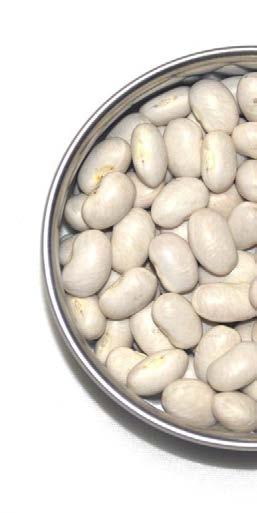
A lasting impression from that experience was “everyone in the community, they’re just lovely people to talk to. It was always a great experience. Tuesdays were my favorite day.”
And she hopes that Tuesdays will become her favourite day again, since she purchased the business in January. The market had been permanently closed, though the car wash business on the lot continued to operate. The Lensinks though were planning on retiring.
“So, I had the crazy idea of buying the business, revitalizing it and reopening.”

The project seemed to answer some problems she had seen in the community. “I think we’ve lost the connections during the pandemic. It’s been a hard two years. It’s been very socially and physically isolating and people are looking for connection again.
“A market is a place for people to gather every week. And you are able to connect with the people who grow your food or make your meals, or make the crafts that you purchase. It would be great to revive the market and provide the exciting bustling atmosphere again.”
Stephanie said, “It’s been a bit of an undertaking, basically starting from scratch.”
Save for that time selling fabric, she was new to markets, though had a background is in sales and marketing. “I’m basically learning as I go,” but she had confidence in the project and a vision. And she had great resources to go to for guidance, “My mother- and fatherin-law have been great to lean on if I need some advice.”
Since January, they have been renovating the space in anticipation of welcoming vendors and customers back the first Tuesday in May. “We’ve had a lot of friends help us with the renovations. They’ve been wonderful. It’s been really helpful.”
It has been hard, stressful work but there was a happy surprise during the process.
Her husband Mark was certain he recalled exploring vaulted rafters in the building growing up. They decided to peel back tiles of the drop ceiling – only to find another dropped ceiling. They tried again and to their delight, a domed hardwood ceiling was






revealed. It meant a lot more work to remove the entire two layers of ceiling from the large indoor space, but it was worth it in the end.
She said, “It’s absolutely gorgeous, this beautiful wood, domed ceiling throughout. And we’re not painting it, we’re leaving it just as it is. I just love the history of the building.”

She hoped the market would be a place for the agricultural community to come and sell their produce and meet the diverse community of consumers.

While it wouldn’t be a designated farmers’ market to start (at least 50% of vendors from farms), she said they were working towards that goal. And “there have been so many artisans that have approached us, I didn’t want to turn people away.”
She said visitors to the old market would see some familiar faces, as well as new ventures, with most vendors coming from the Aylmer area. “We have Jantzi’s cheese coming back, which everyone seems very excited about.”
They would also have ready-to-eat food with “five food trucks that will be coming in rotation every Tuesday.”

While she wasn’t setting any hard goals for their first year, Stephanie said her measure of success will be hearing from the customers. “You know, what would make me happy? It would be some really good feedback from the community. That would make all of the sleepless nights and all of the investment worthwhile. That would mean everything to me.”
A place to gather

Much like Stephanie, organizers of other area markets have been inspired to open or revitalize.
Terry Dueck and Amy Burks are part of a team that is bringing a market to the Elgin Innovation Centre – The Old Imperial Farmers Market.
Amy grew up on a local farm and said markets like this encourage agriculture, and foster growth for smaller, more niche farms.
For those who choose to manage smaller farm operations, said it was a lifestyle, economic and environmental choice, and “The market gives a place for small farms to thrive.”

Market interactions also meant “an opportunity to educate people on farming.” Amy said there was a lot of misinformation on farming practices online, but places like this where people could
meet and talking to people who grow food and tend to livestock, might offer a chance for dialogue and learning.
Amy and Terry reflected the sentiment that—especially since the pandemic began—people were looking for ways to connect, places to buy local wares and venues to gather, and markets were the perfect way to accomplish all of those things.
Terry had experience as a vendor in other markets and had seen how they could act as business incubators. It can be the first place someone sells wares, and with enough demand they may grow a strong enough customer base to support a stand-alone storefront.

proceed. That’s when Jane and Chuck Magri of Wildflowers farm in Central Elgin decided to step up. They took a creative approach and welcomed vendors onto their farm for Friday night markets. The results were positive, with line-ups around country blocks to get parking spots. According to its website, the market “welcomes farmers, food producers, chefs, artists, musicians and entrepreneurs to share their passions and talents with you.” It has a fun atmosphere, offering patios and gardens where patrons can socialize, eat, enjoy music, drink or explore. They hope visitors “are left with a sense of calm and connection to nature and community.”
Jane told the Express, “Something new and exciting this year is our ‘Market After Dark’ series. Once a month we will be extending our market hours until 10 p.m. and create a theme.”
In addition to the regular vendors and fare, those extended evenings will “bring you a different experience with each after dark event.” They hoped to feature, “live bands, DJ and late-night snacks.”
Having had so much success with their efforts in the first two years, they hoped this would be welcomed by returning guests, and attract new guests as well.

Elgin – a local produce destination
lished that trust and relationship.”
Last year, they had increased the amount of outdoor seating, so shoppers could socialize and enjoy food that they bought there.
“The greatest reward is every week – whether it was scorching hot, freezing cold, sleet, rain, you name it – seeing the community show up to support the vendors at Horton Farmers’ Market. It has been incredible.”
She said being full was a good thing, especially with the other markets opening up in the area. They were able to refer artisans and crafters to the two Aylmer markets, or Wildflowers.
Tara said that they found the markets could coexist, building on each other’s successes, growing the culture for buying and supporting local, and focusing on the unique atmosphere that each venue provides.
The markets all being on different days or times meant they would suit a range of schedules and lifestyles, both for shoppers and vendors.
“To have different options it’s really exciting to see,” Tara said. Over the past few years, it’s been “really cool to see Elgin County becoming a wonderful mecca for farmers markets.” More markets mean more places for producers to connect with customers; more venues for musicians, crafters and vendors to share their talents and more locations for people to access fresh produce.
They said they’d love to have a wall of fame where people and businesses that had gotten their start in the Old Imperial market could be featured.
In November and December, they had hosted a Christmas market and found the response to it was overwhelming, with more people arriving each day, and far exceeding their expectations.
Currently they were undergoing renovations, most notably a façade refresh which will feature red awnings to make the former industrial building more welcoming to the market crowd. It would still be some time before the site was ready, and a ‘soft launch’ was planned for July 16, and a Grand Opening to follow August 13. They expect about 25 vendors to start with room to grow.
When the pandemic began in 2020, it was uncertain whether the Horton Farmers’ Market in St. Thomas would
In 2020, the Horton market did eventually open for the season for it’s regular Saturday morning hours in downtown St. Thomas. The following year, it opened under management of the St. Thomas Economic Development Corporation.
The market has seen great interest from both sellers and customers. With 57 vendors planned for the coming season, it was “officially full,” said Tara McCaulley, Manager of Entrepreneurship and Business Development at STEDC. Horton was a designated farmers’ market and maintained a farm proportion of at least 50%.
Tara said the relationship with the farm vendors, the market and the customers was a special one. “We have some farmers who have been for years and years.”
Horton Farmers’ Market was a place to make to make lasting connections.
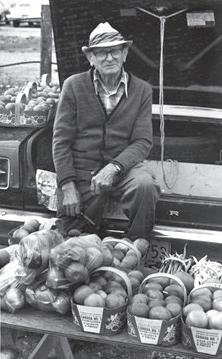
“You’ll have customers come find you at the market and forever be your customer wherever you are because you’ve estab-



by Rob Perry of The Aylmer Express Christian Farmers Federation of Ontario wants its local branches, including Elgin County, to be ready with questions for candidates leading up to the June provincial election.

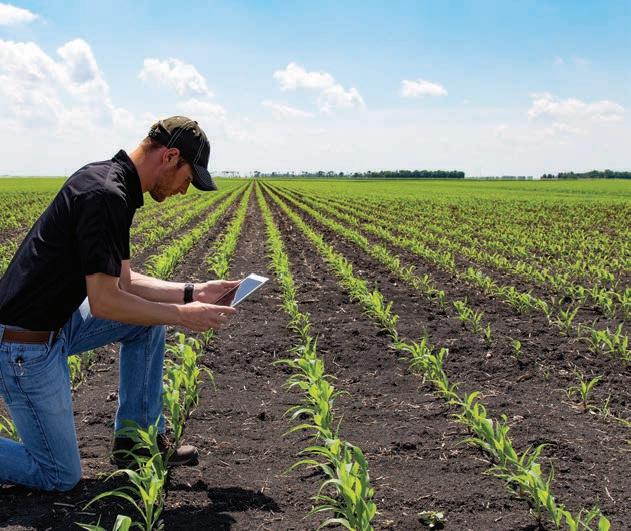


At an online annual “policy tour” meeting involving the Elgin, Middlesex and Lambton branches in late February, CFFO Policy and Research Director Suzanne Armstrong broached the topic of the election. She suggested local branches think about what they could do, and perhaps write in to local newspapers with questions for candidates, or even host all-candidate meetings.
Among the subjects CFFO wanted discussed were carbon pricing and trading, farmland protection and housing, farm labour, environmental stewardship and food security, she stated.
When meeting attendees were polled on topics most important to them, the results were 35% expressing
particular interest in food security issues, 25% in housing and farmland protection, and various other subjects getting 13% or so.
Focusing on food security, she said, “I think it’s a hot topic now on a couple of levels, both on the provincial, federal and world levels, but also for individuals facing rising prices.”
Among the causes of food insecurity were low wages, low levels of social support and high and stillincreasing costs for food and housing.
She asked what the biggest risks were to food security and how those could be addressed.


A couple identified online as Ray and Angela of Middlesex said their
concern was a lack of processing capacity, particularly for beef cattle but also for all meats.
Ray said livestock producers had to plan 14 months ahead to book capacity at a processing plant for beef, and the same for lamb, which weren’t even born yet before they had to be accounted for when the time would come to harvest them.

Ms. Armstrong said that was a common concern, though it did vary by region how far ahead capacity had to be booked.
John Lammers of the Lambeth branch said the processing system was “pretty fragile.” If a Covid outbreak shut down a plant for a week, “there’s just not a lot of room for catching up.”
That was especially true for poultry, he said, having heard a half-million chickens had to go to composting at one point.
CFFO Vice-President Richard Blyleven, a Haldimand-Norfolk area farmer, asked Mr. Lammers if those chickens had been meat birds or spent hens.
Mr. Lammers said meat birds as far as

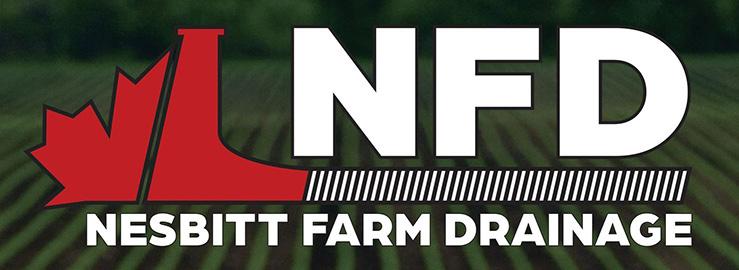
he knew.
Mr. Blyleven commented, “When people are starving, that’s a lot of wasted food.”
He’d heard too that when chickens were ready to be processed, some plants just didn’t have the workers to do so, he added. Ironically, poultry producers had been asked to increase production by 3% to make up for the losses.
Ms. Armstrong said CFFO had been working with Meat and Poultry Ontario and the provincial government on processing shortcomings, and MPO was trying to match producers to smaller processors that might have a gap to fill in their schedules.
Labour was a contributor to shortfalls in capacity, as was the red tape involved in expanding existing plants or building new ones, she allowed.
She asked for ideas to attract more people into the workforce, or to otherwise stabilize processing capacity.
Don Van Gorkum of Middlesex asked if automation had been explored.
Ms. Armstrong said that was very challenging for meat processing. Automation required very specific inputs of materials to work.
Bridge blockades
With the recent blockade of border bridges, Mr. Van Gorkum asked, were Americans thinking of building more plants there rather than in Canada.
Ms. Armstrong said Canada was lucky not to have had more extensive border closures, but they remained a risk for a variety of potential reasons.
Ray of Middlesex suggested, “I think you need to get rid of the red tape for cattle.”
If cattle couldn’t be moved out of Canada, a lot of production would be lost in Eastern Canada, he believed. Just last month, he’d had to ship to South Carolina to have culled cows processed.
If the cross-border potential was lost, “We’re so dependent on that, it’s a big deal.”
Ms. Armstrong agreed a lot of species depended on processing capacity outside their home province.
A border didn’t have to be blockaded for a Quebec plant to decide it didn’t want any more Ontario pigs for whatever reason, she said. CFFO had been trying to push for more processing capacity within Ontario.
Don McCabe of Lambton said earlier that day, U.S.A. Secretary of Agriculture had announced that one of his department’s priorities for the coming year would be increasing that country’s processing capacity.

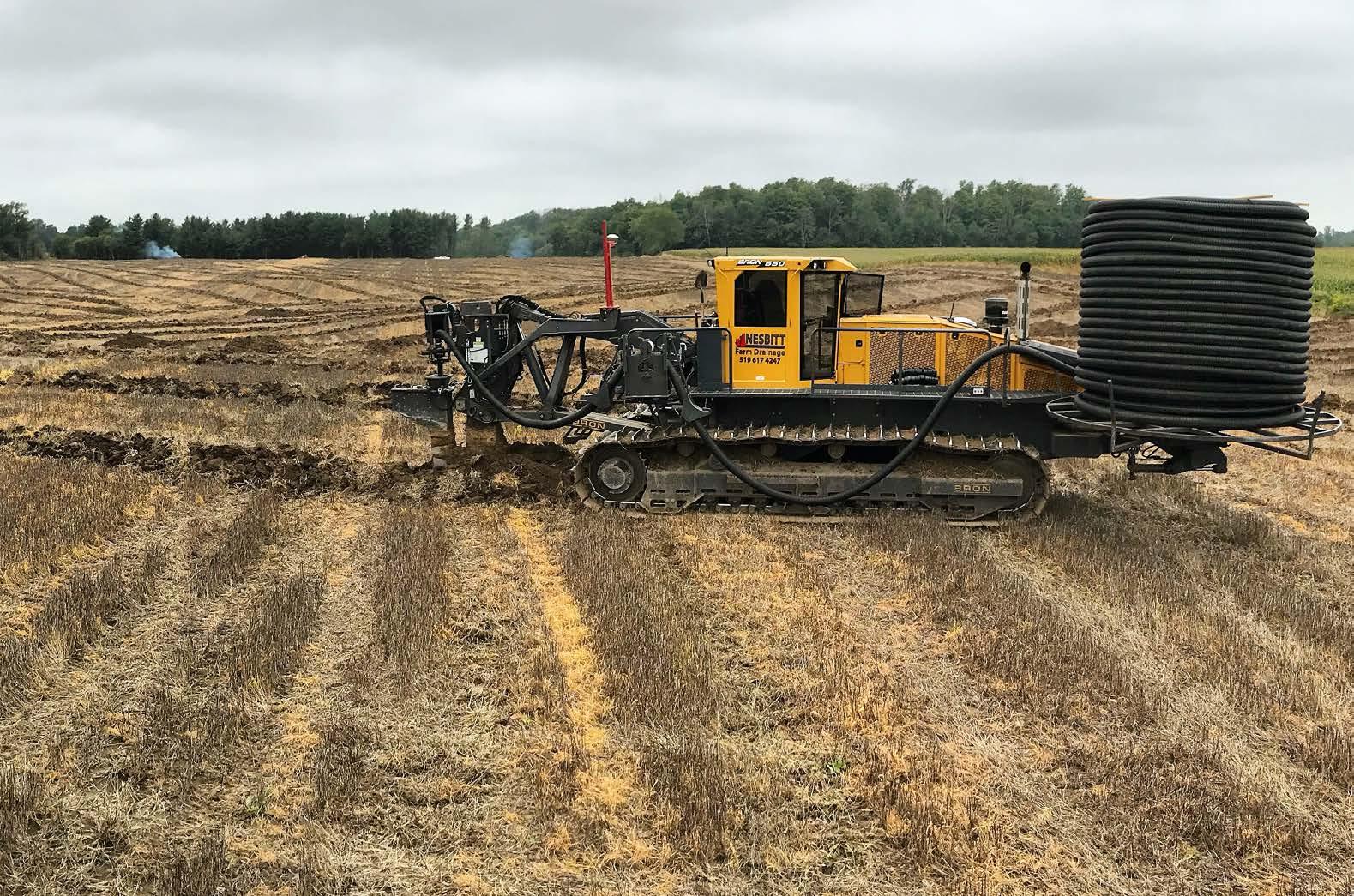
Specifics were not offered on regions and commodities, but the U.S.A. was still looking at expansion and ways to dominate the export market, Mr. McCabe stated.
“The problems I see here in this country, it’s very easy for us to use buzz words like red tape, but those types of buzz words are just an excuse for inaction,” he said. Governments couldn’t cut red tape until they recognized that Canada was essentially two separate countries when it came to internal trade.
Lots of Canada’s pork processing capacity was in Quebec, which had never been very interested in allowing outside products into its market, he continued. So, in addition to opening foreign markets, producers outside Quebec had to deal with ‘trade’ issues within Canada.
Ms. Armstrong agreed that “Democracy can be slow,” but CFFO needed to keep making its points to provincial and Canadian leaders.
Mr. Van Gorkum said some reports about food wastage were also very disturbing. His son was involved in trucking, and 35 loads of sugar beets were rejected for processing into sugar, because a processing plant in Michigan
couldn’t handle the amount it was getting.
Ms. Armstrong said she’d heard about the same incident at a CFFO meeting for Chatham Kent. At least those beets went to feed cattle.
Steve Korvemaker of Lambton said he had to leave 5% of his sugar beet crop in the fields last year, because of a bumper yield, but limited processing ability. He usually harvested 35 tonnes an acre, but in 2021 produced 40.
Elgin CFFO Treasurer Teus Korevaar said Harvest Hands of St. Thomas, which picked up food from grocery stories and bakeries to distribute to food banks, believed 50% of food in Canada was wasted.
Ms. Armstrong said waste was huge across the entire food chains, but she was glad to hear about organizations like Harvest Hands that tried to reduce that.
CFFO Members Relations Manager Paul Bootsma said grocery stores were bringing more donations to food banks now. He and his wife volunteered at a food bank in Brantford, he said, and one of the challenges of food security was the affordability of food. The food bank had twice the people coming through it now as it did two years ago, and free meals that had been offered three or four days a week, “Now it’s every day of the month.”
He’d also seen an increase in food bank users involving families with young children.
Ms. Armstrong said some recommendations included making food processing “scalable” (able to take more or less or needed), as well as increasing the efficiency of the food chain, reducing red tape around seasonal workers and supporting local processing facilities more.
519·617·4247
Hayley Provoost submitted these glimpses of life on a family farm. She said, “Raising a family on a farm can be exhausting at times. The running around, meals on the go and the hard work. Every second is worth it – watching our little girls grow up surrounded by the beautiful views, tractor and combine rides with daddy, grandpa and uncles – I couldn’t imagine any other life for us.” The Provoosts are Hayley (mom), Mark (dad), and daughters Mia and Lylah. (AE/Contributed)
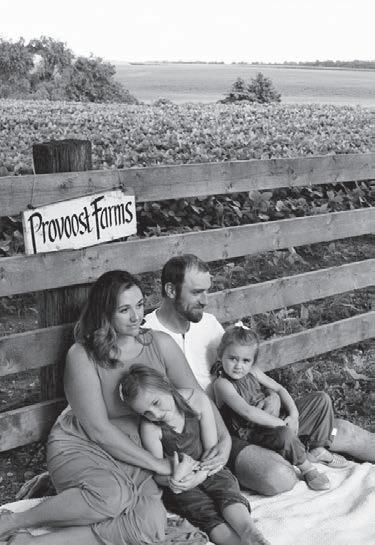

When people are starving, that’s a lot of wasted foodMichael Krahn


lands, equipment, supplying me hay and helping me out to manage the situation.”

Indeed, it took a community to find a missing herd, and Ates is grateful to many others who helped with the search.
By David Briggs,Local Journalism Initiative Reporter, BayToday.ca

Jan. 12, 2022 - It’s been almost four weeks since a herd of eight bison wandered off a ranch in Crystal Falls, about 15 minutes north of Sturgeon Falls.
Yesterday, the final bison was returned to the ranch.
Mesut Ates was happy to see them return and glad to put the worry behind him. Ates runs BisON ranch, a relatively new venture he started with his wife in 2018 just before their first daughter was born.
The next year was busy for the new Crystal Falls ranchers as they began planning their new business and preparing the property for the bison.
“Step by step, we worked hard for our dream,” Ates recalled, “knowing there was a light at the end of the tunnel was encouraging.”
Once the fence lines were cleared, fences installed, and pastures divided into multiple sections for rotational gazing, the big day was fast approaching—almost time to purchase the bison.
This first herd was bought in the summer of 2021, and the bison took to the 300-acre ranch right away.
“Happy and healthy,” the bison felt “like they were in their natural habitat” with plenty of pastures to graze throughout the days, Ates said.
With the ranch up and running, they would soon have meat to sell, and their new business would begin seeing some returns on their investment and hard work.


Then strong winds blew through Crystal Falls on Dec. 16, toppling a dying tree which in trun crushed a section of fence.
The bison found the opening in the fence before the ranchers, escaping over the fallen section.
Before long, the word was out that the bison were on the loose. On Dec. 17, OPP issued a warning to residents to keep their eyes out while driving Highway 64 after a lone driver struck and killed one of the wandering bison.
“There were no injuries in the accident,” the OPP mentioned in their report, but that referred to human injuries.

Constable Robert Lewis warned the public that although “they look docile, bison are dangerous, unpredictable, and may charge without warning. Do not approach any of these animals.”
After the highway incident, the bison returned to woods, digging through the shallow snow for their next meal.
Ates assumed they could find food. However, even at around 2,000 pounds, he knew his herd would have serious trouble if they encountered some wolves in those dark woods.
He also worried about the roadways, and potential injury to his herd—twisting or breaking a hoof or leg in the rough bush. His entire herd was gone, and without the bison to bank on, the new ranch’s “light at the end of the tunnel” was beginning to dim.
Hope returned once the community heard the news of the vagrant bison. Before long, West Nipissing residents were posting about the lost herd on social media, offering assistance and support to Mesut and his family.
The outpouring of support was much welcomed by Ates, and before long, a full-scale search was underway, and neighbours were asking for help with finding drone operators that could assist
the search and for portable corral systems to help wrangle the animals once found.
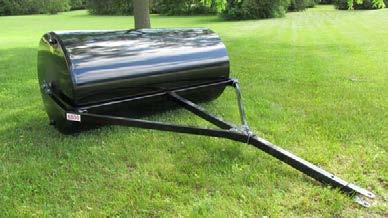

Ron Camirand runs RC Drone Services in North Bay, and he put his drone—equipped with thermal imaging—to work.
However, despite his best efforts, the weather was not optimal for drone searches. A few were executed, but in the end, it was boots on the ground that spotted the herd.
The bison were spotted about “fifteen or twenty” kilometers from the ranch, Ates said, “they were always travelling” since their escape.
People volunteered to search on ATVs and horses as well, and even some pilots involved kept an eye over the area when they were flying.
Eventually the herd settled in one area and Ates, with help from his friends, was “able to set up a portable corral system” to lead the animals into a truck for transport.
“They’re doing okay,” he said, after corralling six of the bison back to the ranch on Wednesday, Jan. 5.
He knew it was just a matter of time before the last bison was captured, and sure enough, the wayward animal was reunited with the herd on Sunday, Jan. 9. “I am so happy to be part of this beautiful community” Ates posted to social media. “Your tremendous support, help and prayers will never be forgotten,” he added.
Ates thanked neighbouring farmers “for letting me use their

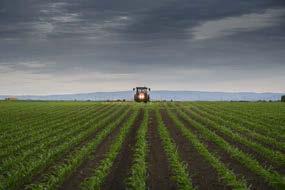
These people were “with me out there since the beginning” the search, “walking with me in the bush, flying drones, bringing out horses and ATVs to keep track on the trails and patrolling roads.”
Ates is relieved to have his bison home, and grateful to the community for their help. The future of the ranch depended on the return of the herd, as without the animals, the financial forecast of BisON ranch looked bleak.
In 2019 it looked like Ates’ business was receiving a $200,000 grant from the Northern Ontario Heritage Fund Corporation to help boost agricultural activity in the north.
“But I haven’t received that grant,” Ates said, noting “some issues” came up “during the process” and he “received nothing from the government.”
Without the grant, Ates and his family bootstrapped the endeavour, and thanks to the help of his new community, the family’s investment has a chance to grow.
“I have a large family now and you made this beautiful community my home.”
Tree Commissioner and Weed Inspector Jeff Lawrence presented his reports for the fourth quarter of 2021 and for last year as a whole at an Elgin County council meeting in early March.
Trees and weeds
During the fourth quarter, he stated, he received 21 applications to harvest trees, up from 18 during the same quarter in 2020. Nine applications came from Malahide, three from Bayham, one from Central Elgin, four from Southwold and four from West Elgin.
The total volume harvested resulted in about 537,000 boardfeet of lumber, and trees were selectively taken from 410 acres of woods.
He received one application, from Malahide, to allow the clearing of 0.05 hectares of woodland from a property, which was still being reviewed.
He received no complaints about weeds in the fourth quarter. For all of 2021, he continued, he received 98 applications to harvest trees, up from 78 in 2020, with 27 coming from Malahide, 15 from Bayham, four from Central Elgin, 12 from Southwold, 21 from Dutton Dunwich and 19 from West Elgin.
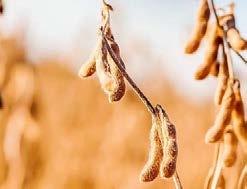
In total, about two-million board feet of lumber was produced, from trees on 2,240 acres of land.
He received four applications to clear woodlands, involving a total of 0.41 hectares or one acre of land.
Three were approved, subject to replanting a similar number of trees on land elsewhere, and the one was still under review.
Mr. Lawrence said he received a total of 14 complaints about weeds over the year, about equal to 2020, and all were resolved without the need to issue a formal weed destruction order.
Several complaints, he noted, involved Canada Fleabane, which was becoming more of an issue in Elgin County, but wasn’t officially designated as a weed under provincial legislation.
Some larger tracts of land were overrun with fleabane, he said, and he’s been seeing more incidences of the plant in recent years.
Fleabane was native to Ontario and North America, he continued, and has also spread to Europe, Asia and Australia.

It had several common names, including horseweed and Canadian horseweed, and bloomed from July into September with small, white flowers.
It could grow as tall as 1.5 metres, and in recent years had become resistant to several herbicides, but other techniques could still be used to control it, he added.
Gypsy moths

West Elgin Mayor Duncan McPhail asked if Elgin County had a protocol for dealing with large infestations of gypsy moths.
Last year, he’d seen action taken in Middlesex County to try to control the pests, which devastated quite a bit of the tree cover there.
He knew trees could handle brief infestations, but he wanted to know what could be done if they lingered.
Mr. Lawrence said the county didn’t have a joint approach to such issues. Instead, each municipality had its own policy.
He did have numbers to call in case chemical controls needed to be applied, if municipalities needed them, but the forecast for the coming year suggested the moths wouldn’t be as much of a problem in 2022.
Mayor McPhail worried that by the time a decision was made to seek to control the population, the damage might already have been done.
County Administrator Julie Gonyou said staff would prepare a report with details of a strategy to deal with such infestations.
Though they look docile, bison are dangerous, unpredictable, and may charge without warning
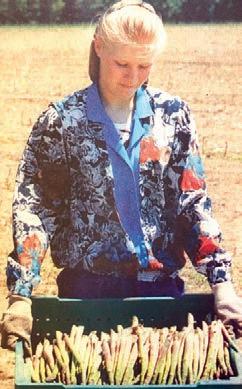
Left: Bea Rokeby with son Allan, wait on customers purchasing apples at their farm, about two miles north of Aylmer on Highway 73. The Rokeby’s have what may be the largest apple in the world… as a stand to attract attention from passers-by.

Bottom Left: A member of the Aylmer Amish community, prepares to unload a wagon of supplies for Tuesday’s market sale and hitch her horse behind the display. They bring fresh eggs, baking and fruits and vegetables to the weekly flea market and sale at the Sales Barn.
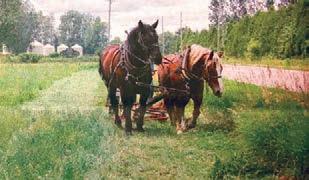
Bottom Right: The field crew were busy on the farm of John Fath just south of Aylmer. The primers are from left, John Enns of Aylmer, Jake Wiebe of Orwell, Isaac Krahn and boat driver John Fath Jr. Many tobacco farmers in east Elgin County had started harvest by August 1 with some already on seconds. Those who weren’t harvesting were busy combating the dry weather by laying irrigation pipes and volume gun sprayers to get moisture to the dry plants.

Top Left: Elsie Thiessen, left, Margaret Wall and Neil Klassen, all of Aylmer, work a tying machine for tobacco growers George and Mike Ungar south of Aylmer. George Unger said he and his brothers were growing 41 acres this year, and the crop seemed to be coming along well. Priming started early on July 29. Dry weather forced the brothers to irrigate three times.
Bottom Left: Sharon Lindsay, left, and Cathy Klassen pull tobacco plants in a greenhouse owned by Keith Lindsay. Mr. Lindsay planted about 25 acres this year. That’s the same as last year, but he had to buy more quota to do it.
Right: Aletha Bradt and her son Doug, right and neighbours inspect the chickens killed by two dogs at the farm north of Aylmer. About 390 chickens were either killed by the dogs or died of fright.
Left: Sarah Braun, 12, of Aylmer was among some 300 pickers harvesting strawberries at Glenn Howe farm on John Wise Line. Mr, Howe said he was pleased with the crop despite it being two weeks late because of inclement sping weather. His crop is sold through grocery stores and a roadside stand at the farm. He expects to pick about 2,500 flats of berries daily for another two weeks. He normally employs a maximum of 250 pickers but recent hot weather caused berries to ripen quickly.
Top Right: Jake Froese bales hay on Jim Thompson’s farm.
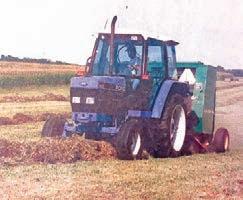
Bottom Right: Lori Smith, left and Joanne Wortelboer thinned fruit on apple trees at the Wortelboer Orchard just south of Springfield last spring. Mrs. Wortelboer said reducing the number of apples helped strengthen the remaining fruit.
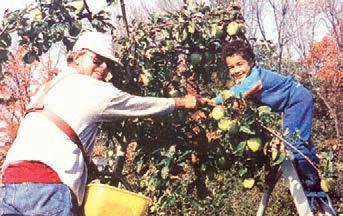
Top Left: A horse-drawn mower cuts alfalfa in a field on College Line, east of Springfield Road. It was the second cut of the season but near-drought conditions left the crop sparse. The farmer hoped a timely rain would encourage growth of a third, more bountiful cut this year.
Bottom Left: Margaret Moltjan, left, Jerry Ball, Madelaine Masschaele, Mike Ungar, Aline Dion, Rick Cerna, Debra Bozso and Mark Langland planted tobacco on Fred and Debra Bozso’s Malahide tobacco farm, Tuesday. They are gorwing 60 acres of CT157 variety.
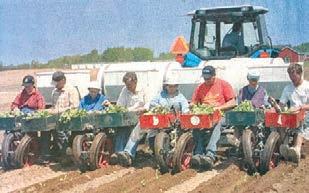
Right: Bob Carrel, left, and Bob Bowen show some of the carrots they started harvesting from a 46 acre field on Glencolin Line last week. It was their first crop, grown for fresh market sales, in partnership with Joseph de Ryk Jr. and Jeff Barbier.
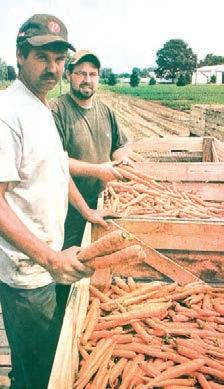
Left: Dave Evans, a research scientist, stands with John Mantel in one of Mantel’s greenhouses, in front of some recently hydroponic tomato plants.

Bottom Left: Stan Viscontas examines a frost-killed tobacco leaf on his farm following a devastating frost which hit this area. He said he had harvested one half of his crop before the frost hit but the best of the crop, the tips and undertips were destroyed.
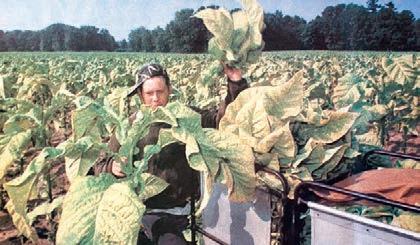
Bottom Right: Sharon Bos, RR 2, Aylmer, takes a break and tries a berry while she and her friend Marianne Hertner, also of RR 2, Aylmer, pick strawberries in Mervin Howe’s Rogers Road strawberry field.

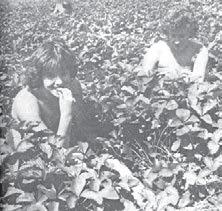

Below: Brent Allen of Richmond harvests tobacco on Jack Brower’s farm on Malahide Concession 2 just west of the Bayham Township line. Mr. Brower grew 51 acres of Delgold last year, and had to irrigate three times. “It took a lot of water,” he says.
Right: Holsteins are moved into stalls and milking apparatus attached at a new milking parlour owned by Jon Walker on the north side of Hwy. 3 east of Walker Sideroad. The new dairy milks 150 cows, with room for expansion.
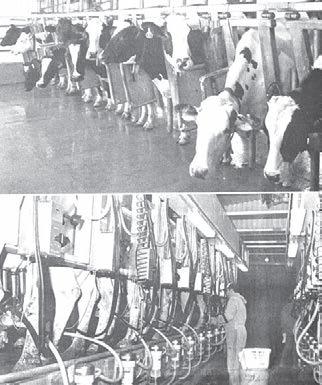


Left: Agatha Rempel displayed an asparagus harvest.

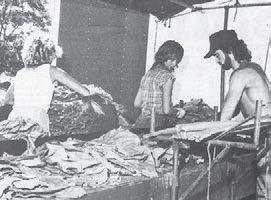
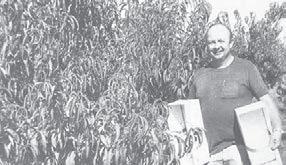

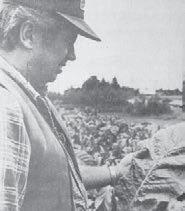
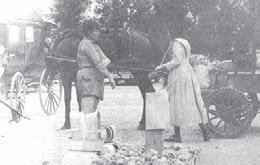

Top Right: Kim Flintoft was not able to fill all his peach baskets this year as 90 percent of his crop was lost to spring frosts that damaged blossoms. It was the first time he did not have to hire several seasonal workers for harvesting.
Bottom Right: Nathaniel, 6, with the help of a ladder, helps father John Hordyk to reach apples at the top of the tree in the family’s GraceView Orchards. John is replacing old trees with small trees in high density plantings to compete in the global market.
Top Left: Aylmer area apple grower Peter Van Ymeren inspects frost damage on one of his apple trees. He said the heavy frost that occurred overnight on the weekend of April 27-29 killed the blossoms on more than 85 percent of his trees.
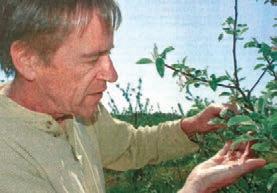
Bottom Left: Kendra Couto, 7, and Alexandra Couto, 9, checked out the peach crop on the south Malahide fruit farm run by their grandfather Maurice Vandenborre with help from their mother Ingrid. The farm is one of the few apple producers in Ontario to have a crop this year, thanks, Mr. Vandenboore said, to the moderating influence of nearby Lake Erie. Most orchards were wiped out in a harsh mid-May frost.
Right: Norm Stansell, left, advised Christopher Abell, 10, of Springfield as he tried plowing a furrow during a “coaching day” for the coming Elgin Plowing Match. The competition, the first for Christopher, will be held at the Bill Reymer Farm, 8773 Hacienda Rd., in Malahide Saturday, September 8.
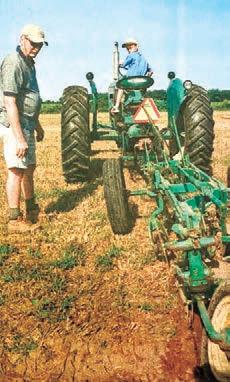
renewed optimism around the Wallacetown Fair board table. After a twoyear hiatus due to the pandemic, they are gearing up for a three-day event this fall with an aptly chosen Superhero theme.
Kim Carder has been involved in the Elgin County fair for much of her adult life, starting as junior director at 16 and working her way through many roles including fair president and has now been the fair secretary for the past six years. “This will be our 163rd year, and we are really lucky to have patrons in our community that have supported us through these last two years and made our fundraising so successful,” says Carder.
Wallacetown owns the fair grounds where the event is held, so the upkeep and maintenance costs continue regardless of whether the fair goes on. To keep afloat through these challenging years, they’ve organized drive through dinners, online auctions and transitioned in-person bingo to Taptix machines at Jackpot City in St. Thomas. They’ve also accessed grants from the county, the local municipality and the Ontario Ministry of Agriculture, Food and Rural Affairs.
The Wallacetown Agricultural Society
also got creative in the continuation of events to bring the community together during the pandemic.

They hosted a photo submission contest, which included categories to encourage local dining, visiting the fairgrounds and many familiar to those entering agriculture, junior fair or homecraft divisions: home canning or processing, five stalks of soybeans, picture with a farm animal, a barn quilt and tallest cornstalk to name a few.
And, for the first time ever, they hosted community drive-in fireworks at the fairgrounds at the end of October 2021. It was so successful that they have plans for more fireworks in the future.
Every bit helped put the fair in a solid position for this year’s event that runs September 30, October 1 and October 2. The Superhero theme will be played out with fictional heroes for kids at the fair, and also be used to recognize real-life heroes in the community.
There will be a big truck and tractor pull on Saturday night, a midway and other entertainment acts. “We’re optimistic that people want to get out,” says Carder. “We’ll have plenty of free activities for kids and most of the events will be outdoors, in case we have to scale anything back because of


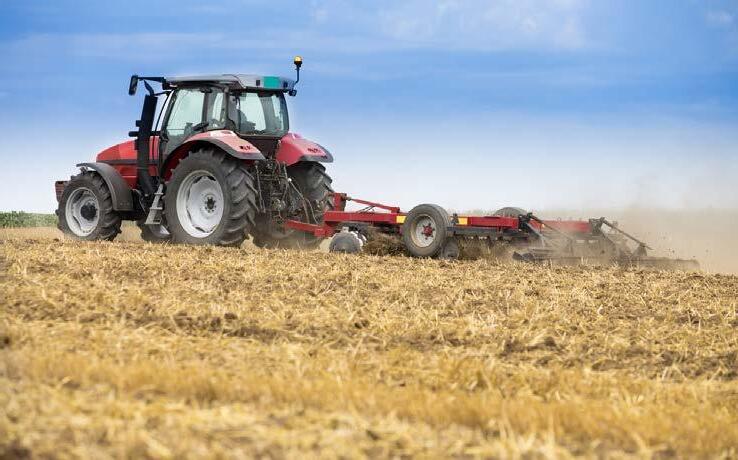

covid. And there will always be areas for adults to catch up because this is the place where people can get back together.”
Carder acknowledges it’s been a tough time for local fairs. Midways, that provide key attraction for kids, are harder to come by as some have consolidated to just go to larger fairs. She knows they’ve been fortunate with support from the local community and some grant money. “We are excited and we’re going for it,” says Carder. They expect more than 5,000 people for their event this fall.
The Aylmer Fair Board recently announce the return of the East Elgin event for August 12-14.

Some of the other fairs in Elgin County are working on the details for their inperson events for this year: Shedden Fair is on August 27 & 28, Rodney Fair runs September 16-18.

In February 2022, the Ontario government announced it was providing $1 million to support the province’s agricultural and horticultural societies that continue to be impacted by the COVID-19 pandemic. The initiative includes base support funding of $1,000 to eligible agricultural and horticultural societies, and additional support through hardship funding based on reported gate revenues for 2019.



